Need a business plan? Call now:
Talk to our experts:
- Business Plan for Investors
- Bank/SBA Business Plan
- Operational/Strategic Planning
- L1 Visa Business Plan
- E1 Treaty Trader Visa Business Plan
- E2 Treaty Investor Visa Business Plan
- EB1 Business Plan
- EB2 Visa Business Plan
- EB5 Business Plan
- Innovator Founder Visa Business Plan
- UK Start-Up Visa Business Plan
- UK Expansion Worker Visa Business Plan
- Manitoba MPNP Visa Business Plan
- Start-Up Visa Business Plan
- Nova Scotia NSNP Visa Business Plan
- British Columbia BC PNP Visa Business Plan
- Self-Employed Visa Business Plan
- OINP Entrepreneur Stream Business Plan
- LMIA Owner Operator Business Plan
- ICT Work Permit Business Plan
- LMIA Mobility Program – C11 Entrepreneur Business Plan
- USMCA (ex-NAFTA) Business Plan
- Franchise Business Planning
- Landlord Business Plan
- Nonprofit Start-Up Business Plan
- USDA Business Plan
- Cannabis business plan
- eCommerce business plan
- Online Boutique Business Plan
- Mobile Application Business Plan
- Daycare business plan
- Restaurant business plan
- Food Delivery Business Plan
- Real Estate Business Plan
- Business Continuity Plan
- Buy Side Due Diligence Services
- ICO whitepaper
- ICO consulting services
- Confidential Information Memorandum
- Private Placement Memorandum
- Feasibility study
- Fractional CFO
- How it works
- Business Plan Examples

Eggs Farming Business Plan Sample
Published Jun.16, 2022
Updated Apr.22, 2024
By: Jakub Babkins
Average rating 5 / 5. Vote count: 2
No votes so far! Be the first to rate this post.

Table of Content
Eggs farming business plan for starting your own business
Are you looking for how to start an egg farm business? An egg farming business is based on raising hens on a farm so to sell eggs for human consumption. The business is profitable because eggs are directly or indirectly part of nearly every meal we eat today.
If you intend to start this business the foremost step is to devise an operational plan. In this egg farming business plan pdf we’re documenting the business plan of an egg farming startup, Eateries. However, if you lack experience in making business plans, it is recommended to hire experts and professionals. Many firms presently also offer services to create a business plan online .
Executive Summary
2.1 the business.
Eateries will be located in San Jose, the U.S. The business will be premised on egg farming. However, innovative features are introduced to make it competitive and adaptive to technological developments.
2.2 Management of eggs farming
Before starting an egg farming business, it is vital to prepare a poultry egg farming business plan. It will enable you to systematically deal with every niche of your business. There are many poultry egg farming business types and your business plan will be based on the type of business you are going to operate. In such cases, it is always recommended to hire business plan professional services to develop a business plan for you.
Eateries will be managed by a web of managers and workers. Since the business requires doing a myriad of hectic tasks such as managing the hens, sorting and feeding them, and regulating their egg production, therefore the management is not going to be simple. The detailed qualification and job description of staff that will be hired to manage various operations will be given in the later sections.
2.3 Customers of Eggs farming
The customer base of egg farming enterprise is very wide and is divided into the following groups:
- Hotels & Restaurants
- Food Production & Agricultural Industries
2.4 Business Target
The targets of Eateries include establishing a good reputation among its competitors. Meanwhile, we aim at establishing a high CSAT score. Our financial goals to be met within the first three years are demonstrated in this table.
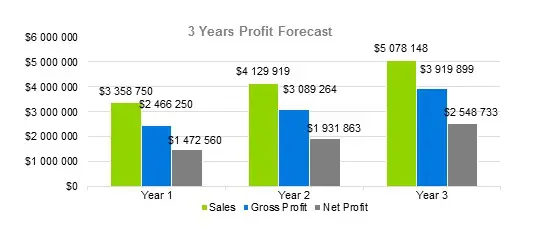
Company Summary
3.1 company owner.
Eateries will be owned by Robert Smith. Smith is an MBA from the prestigious Harvard Institute. He hasn’t any experience of working in the field. Just after graduation, he made a small farm egg business plan and carried out his startup successfully.
3.2 Why eggs farming is being started
Smith was always an animal enthusiast. He started poultry farm egg production business to earn profit while doing the work he loves. Besides, Smith believed that the usual farming techniques used on farms are cruel to animals and are only centered on making profits.
Therefore, he decided to open organic egg farming business to set an example of earning profit while continuing it with humane practices.
3.3 How the eggs farming will be started
Step1: Plan & Take Down
The foremost step is to take down an enterprise plan. Since it is a consuming task we’re attaching poultry egg farming business plan pdf for your help. However, you cannot move on with just this chicken egg farming business plan pdf without adjusting it your intended market, financial expenditures, and goals.
Step2: Fund & Recruit
The next step is to direct your funding to acquire the financial and human resources you will be needing.
Step3: Manage the Business
Managing a farming enterprise is tough and just like the case of worm farm business plan , you’ll need hard-working staff to sort and regulate the hens. To get ideas on how to manage your farm efficiently, you may also visit indoor shrimp farm business plan .
Step4: Ensure You Exist on Google
The next step is to ensure that you have a strong web presence. Especially if you want to sell eggs and products both offline and online, it will be imperative to be in the top searches on the web.
Step5: Market
The last step is to publicize your merchandise, your services, and the things that can brand you better than your competitors. It will help you get in contact with your intended audience and boost your sales.
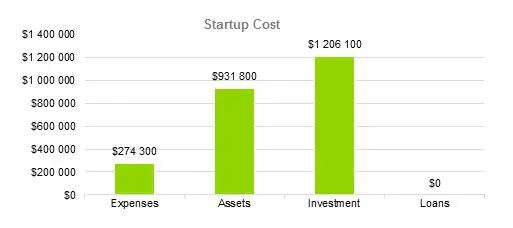
Services of eggs farming
In your chicken egg farm business plan, you’ll have to construct a list of products you’ll be offering. Usually, the products in small egg farm business plan are eggs and chicken meat. However, in this egg farming business plan pdf you can see that Eateries will be offering turkey meat and poultry litter as well. If you plan to offer more services in this domain you will have to do little adjustments in this business plan for egg laying farm.
Our main products will be eggs, both white and brown. We will sell them in packs.
- Chicken Meat
We’ll also sell chicken meat in large quantities to merchants and hotels.
- Poultry Litter & Organic Fertilizer
Poultry litter comprises feathers, excreta, non-edible organs, and other waste products related to poultry. They all together make a great organic fertilizer so this will also be our major product.
- Turkey Meat
We’ll also be farming turkeys and will sell their meat as well.
Marketing Analysis of eggs farming
Before you start chicken egg farming business you should bring off a market analysis of the market you’re going to serve. It includes studying the market trends, no. of businesses operating, and profit-generating methods adopted by others in the field. After studying that, you have to compile them in your eggs farming business plan for reference. Moreover, in your egg farm business plan you have to do market segmentation i.e. dividing your intended population into distinct groups to develop a targeting and tailored strategy.
5.1 Market Trends
According to IBISWorld, the market size of egg farming business is $10bn as of 2022. More than 32 thousand businesses are successfully operating in the U.S. and due to increasing market demand, there is room for more. Most of the farm corporations sell white and brown table eggs and therefore, adding turkey meat and fertilizers to the services will benefit Eateries a lot.
5.2 Marketing Segmentation
In this egg farm business plan pdf we’re listing groups of customers as recognized by Eateries. If you’re looking for how to start an egg farm business you must search for your own customer groups and include them in your chicken egg farming business plan.
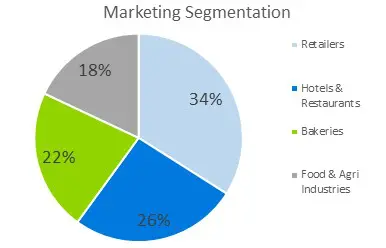
5.2.1 Retailers
Our major customers will be salespeople and owners of large stores. They are expected to buy all our products in large amounts. Therefore, we’ll be offering several discounts to them to guarantee their long-term retention.
5.2.2 Hotels & Restaurants
Our second group of desired customers will be hotels and restaurants. They will buy eggs and meat from us in large amounts to prepare meals to serve their customers.
5.2.3 Bakeries
The last category of our desired customers includes bakeries. To cook their products such as pizzas, burgers, and even loaves of bread, they will need to procure eggs and chicken and turkey meat. They are also likely to make purchases in large chunks.
5.2.4 Food Production & Agricultural Industries
They are expected to buy poultry litter from us to turn it into useful and expensive organic fertilizer. As soon as we achieve the independent capability to produce organic fertilizer, this customer group will become a major contributor to our profit margins.
5.3 Business Target
- Maintaining an average rating of 4.8 out of 5 on our online platforms
- Attaining a CSAT score of more than 90% during the first year of our launch
- Boosting our sales by 30% every year
- Acquiring independent capability of producing organic fertilizer by poultry litter
5.4 Product Pricing
Our prices are a little bit higher than those of our competitors. It is because we’re especially aiming to keep the hen healthy and humanely. Moreover, the prices of our turkey meat are also higher as we feed them with costly organic foods rather than instant and artificial feeds.
Marketing Strategy of eggs farming
If you are planning to institute a farm that sells eggs to business, you must also include the strategy to get in contact with the desired enterprises. In this small farm egg business plan we are documenting the sales strategy of Eateries. If you are making an egg farming business plan you may take more promotion ideas from business plan for farmers market or oyster farming business plan.
6.1 Competitive Analysis
- We have acquired a large area in which temperature is controlled to facilitate a favorable environment for farming. This will help us in getting healthier, and more nutritious eggs and meat.
- We do not subject the poultry to inhumane treatment, unlike many others.
6.2 Sales Strategy
- We’ll offer a 40% discount on our eggs for the initial 3 months of our launch.
- We’ll offer a 20% discount on chicken meat and turkey meat for the initial 2 months of our launch.
6.3 Sales Monthly
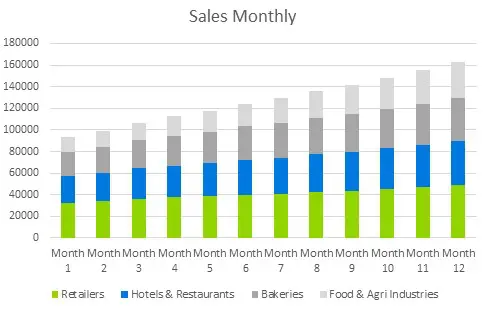
6.4 Sales Yearly
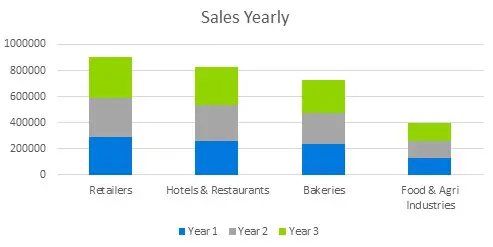
6.5 Sales Forecast
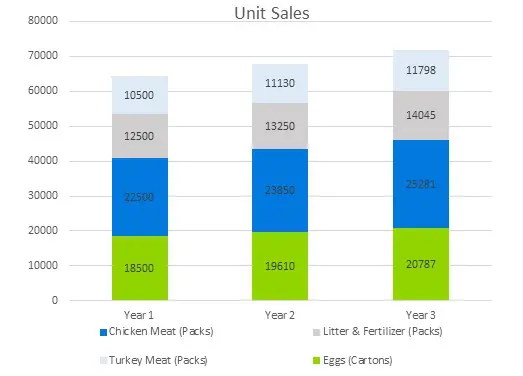
Personnel plan of eggs farming
When you draft an eggs farming business plan, you must include a list of required workers along with their job descriptions. It is essential as managing a farm is a hectic doing. Even garlic farming business plan gives a tough time even though garlic is a static species with no excretion and cleaning requirements.
In this poultry egg farming business plan pdf, we’re listing the personnel plan of Eateries.
7.1 Company Staff
- 5 General Workers
- 10 Cleaners
- 1 Accountant
- 2 Record Keepers
- 1 Veterinary Doctor
- 1 Web Developer
7.2 Average Salary of Employees
Financial plan of eggs farming.
To ensure that your small farm egg business for sale yield the expected profits, it is essential to draw specific and realistic profit expectations meanwhile devising the strategy to materialize them. For that, you need an in-depth and 100pc accurate financial analysis in your business plan for egg laying farm. In this schedule, we are documenting the financial plan of Eateries, however, if you have any added aspects to your enterprise, you may also want to visit state farm agent business plan
8.1 Important Assumptions
8.2 break-even analysis.

8.3 Projected Profit and Loss
8.3.1 profit monthly.
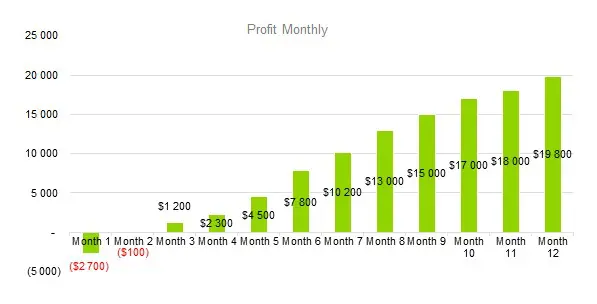
8.3.2 Profit Yearly
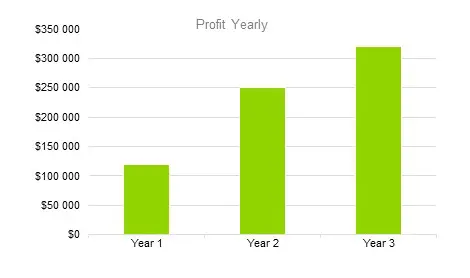
8.3.3 Gross Margin Monthly
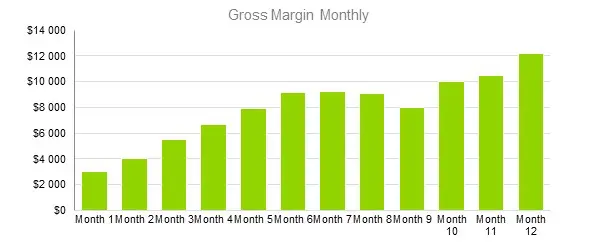
8.3.4 Gross Margin Yearly
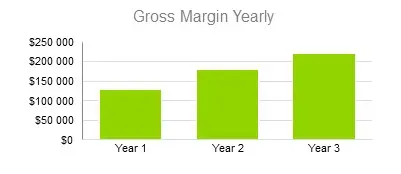
8.4 Projected Cash Flow
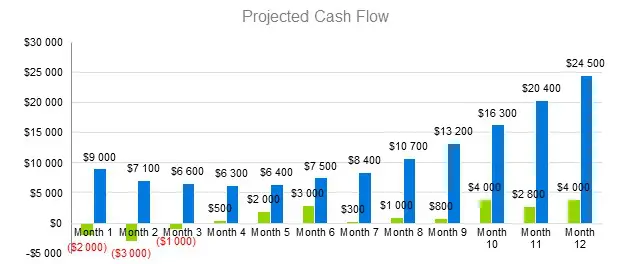
All tables in PDF
- How do I start an egg business?
You can start it by making a chicken egg farming business plan and then executing it in letter and spirit. If you need to know what an egg farm business plan looks like you can see this egg farm business plan pdf
- Is selling eggs a good business?
Yes. It’s a good startup due to the use of eggs in almost everything edible.
- How much can you make on the egg farm?
You can make as much as $10-30k per month in profit depending on your sales. In this egg farming business plan you can see how much Eateries made in the initial 3 years of their launch.
- What are the 4 types of egg farming?
The 4 types of egg farming are as follows:
- Barn egg production
- Organic egg production
- Free range egg production
- Laying cage egg production
Download Eggs Farming Business Plan Sample in pdf
OGSCapital’s team has assisted thousands of entrepreneurs with top-rate business plan development, consultancy and analysis. They’ve helped thousands of SME owners secure more than $1.5 billion in funding, and they can do the same for you.

How to Start a Plumbing Business in 2024: A Detailed Guide

Vegetable Farming Business Plan

Trading Business Plan

How To Write A Textile Manufacturing Business Plan

Start a Vending Machine Business in 2024: A Detailed Guide
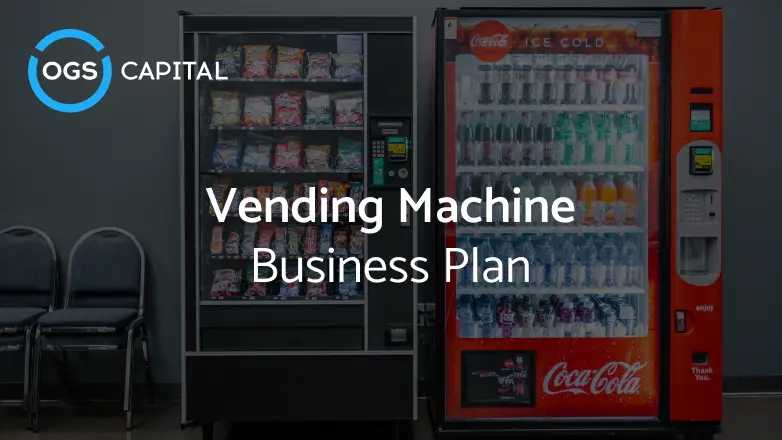
Oil and Gas Business Plan

Any questions? Get in Touch!
We have been mentioned in the press:
Leave a Reply Cancel reply
Your email address will not be published. Required fields are marked *
Save my name, email, and website in this browser for the next time I comment.
Search the site:
Farming With Precision!

[Pdf Sample] Business Plan For Poultry Egg Farming Docx
In this article, we will delve into the intricacies of poultry egg farming and provide you with a comprehensive business plan in PDF format. Whether you are a novice entrepreneur or an experienced farmer looking to venture into the poultry industry, this guide will equip you with the necessary knowledge and insights to establish a successful poultry egg farming business.
We will explore the essential components of a business plan, covering key aspects such as market analysis, financial projections, operational strategies, and more. Let’s embark on this journey towards entrepreneurial excellence in the poultry egg farming sector!
[Pdf Sample] Poultry Egg Farming Business Plan Proposal Docx
Table of Contents
To write a business plan , here is a breakdown of how it should be structured and what should be in each category. After this instruction, I will provide you with a sample of one I wrote for my farm , let us go:
Read Also: [Pdf Sample] Broiler Farm Business Plan Proposal Docx
Executive Summary
In this section, we will provide a concise overview of the poultry egg farming business plan , highlighting the key elements and objectives. It will give potential investors and stakeholders a comprehensive understanding of your business model, operational strategies, and financial projections.
Business Overview
Here, we will delve into the fundamental aspects of your poultry egg farming business . We will discuss the vision, mission, and core values of your enterprise, highlighting your unique selling proposition and competitive advantage in the market. Additionally, we will explore the organizational structure, management team, and key personnel responsible for driving the success of your business.
Read Also: [Pdf Sample] Business Plan For Goat Farming Business Docx
Market Analysis
A thorough market analysis is crucial for understanding the dynamics of the poultry industry and identifying potential opportunities and challenges. We will conduct an in-depth assessment of the target market, including customer demographics, demand trends, competitors, and market share analysis. This information will enable you to develop effective marketing strategies and position your poultry egg farming business for optimal success.
Choosing the Right Poultry Breeds
Selecting the appropriate poultry breeds is essential for maximizing egg production and profitability. We will explore different breeds, their characteristics, and suitability for various production systems. Factors such as egg size, laying capacity, disease resistance, and adaptability to local climates will be considered to ensure you make informed decisions regarding the selection of poultry breeds.
Read Also: [Pdf Sample] Business Plan For Poultry And Fish Farming Docx
Infrastructure and Equipment
In this section, we will discuss the infrastructure requirements for your poultry egg farming business . This includes designing and constructing poultry houses, ensuring proper ventilation, lighting, and temperature control. We will also explore the equipment and machinery necessary for efficient egg production, such as feeders, drinkers, egg collection systems, and waste management solutions.
Egg Production and Management
Managing egg production is a critical aspect of poultry egg farming . We will cover the entire production cycle, from sourcing quality chicks or hatching eggs to raising pullets and ensuring optimal egg-laying conditions. Topics such as nutrition, disease prevention, vaccination schedules , and biosecurity measures will be discussed in detail to maintain healthy and productive flocks.
Read Also: [Pdf Sample] Business Plan For Tilapia Fish Farming Docx
Marketing and Sales Strategies
Developing effective marketing and sales strategies is vital for promoting your poultry egg products and capturing a significant market share. We will explore various marketing channels, such as local markets, supermarkets, restaurants, and online platforms. Additionally, we will discuss branding, packaging, pricing strategies, and customer retention techniques to establish a strong market presence.
Financial Projections
Accurate financial projections are essential for demonstrating the profitability and sustainability of your poultry egg farming business . We will guide you through the process of creating realistic revenue forecasts, expense budgets, and cash flow statements. Furthermore, we will discuss key financial indicators, such as return on investment (ROI), payback period, and break-even analysis, to evaluate the financial viability of your venture.
Read Also: [Pdf Sample] Business Plan For Fish Farming Docx
Risk Assessment and Management
Identifying and mitigating potential risks is crucial for ensuring the long-term success of your poultry egg farming business . We will conduct a comprehensive risk assessment, covering factors such as disease outbreaks, market fluctuations, regulatory changes, and natural disasters. By implementing effective risk management strategies, you can safeguard your business against unforeseen challenges and maintain operational continuity.
Legal and Regulatory Considerations
Compliance with legal and regulatory requirements is essential for operating a poultry egg farming business . We will guide you through the necessary permits, licenses, and certifications needed to establish and run your enterprise. Understanding the applicable laws and regulations will help you avoid legal complications and ensure ethical and sustainable farming practices .
Operational Plan
Developing a robust operational plan is crucial for streamlining your day-to-day activities and optimizing productivity . We will delve into various operational aspects, including flock management, feed procurement, waste management, equipment maintenance, and record-keeping. By implementing efficient operational procedures, you can enhance efficiency, minimize costs, and maximize overall performance.
Sustainability Practices
Sustainable farming practices not only contribute to environmental conservation but also enhance the reputation and marketability of your poultry egg farming business . We will explore eco-friendly initiatives, such as organic feed production, renewable energy utilization, and waste recycling. Incorporating sustainable practices will not only benefit the environment but also attract environmentally conscious consumers.
Here Is The Download Link To Business Plan For Poultry Egg Farming Proposal By Agrolearner.com
Business Model Canvas for Agrolearners.com’s Poultry Egg Farming Business:
Key partnerships:.
Poultry equipment suppliers: Establish partnerships with reliable suppliers of poultry equipment, including housing, feeding systems, and egg collection systems.
Veterinary services: Collaborate with experienced veterinarians and animal health professionals to ensure the well-being and health of the poultry flock.
Feed suppliers: Form partnerships with feed manufacturers or suppliers to ensure a consistent supply of high-quality feed for the poultry .
Online learning platforms: Collaborate with online learning platforms to provide educational resources and courses on poultry egg farming to aspiring farmers .
Key Activities:
Poultry management: Implement best practices for raising and managing a healthy poultry flock, including sourcing chicks, monitoring growth, nutrition management, disease prevention, and vaccination.
Egg production: Establish efficient egg production systems, including proper egg collection, grading, and storage.
Online education: Develop and deliver educational content on poultry egg farming through Agrolearners.com, including articles, videos, courses, and webinars.
Marketing and sales: Promote the poultry egg products through various marketing channels, such as the Agrolearners.com website, social media, and partnerships with local retailers.
Key Resources:
Poultry housing and infrastructure: Establish well-designed and maintained poultry houses with appropriate ventilation, lighting, and temperature control systems.
Poultry flock: Maintain a healthy and productive flock of laying hens of suitable breeds.
Online learning platform: Develop and maintain Agrolearners.com as a comprehensive online platform for educational resources on poultry egg farming.
Marketing and sales channels: Utilize online marketing channels, social media platforms, and partnerships with local retailers to reach and engage with target customers.
Value Proposition:
Educational Resources: Provide comprehensive and reliable educational resources on poultry egg farming, catering to both aspiring farmers and existing poultry farmers seeking to enhance their knowledge and skills.
High-Quality Poultry Egg Products: Offer fresh, high-quality poultry eggs produced from healthy and well-managed flocks, ensuring customer satisfaction.
Convenience: Enable learners to access educational materials and courses on poultry egg farming conveniently through the Agrolearners.com platform.
Community and Support: Foster a community of learners and provide support through forums, discussion groups, and expert assistance, creating a supportive learning environment.
Customer Segments:
Aspiring poultry farmers: Individuals who are interested in starting their own poultry egg farming businesses and seek knowledge and guidance.
Existing poultry farmers: Farmers who are already involved in poultry farming and wish to enhance their skills and knowledge.
Consumers: Customers who value high-quality, fresh, and locally produced poultry eggs.
Agrolearners.com website: Provide access to educational resources, online courses, webinars, and a community platform for learners.
Social Media: Utilize social media platforms to engage with the target audience, share educational content, and promote poultry egg products.
Partnerships with retailers: Collaborate with local retailers and grocery stores to sell poultry eggs to end consumers.
Customer Relationships:
Educational support: Provide personalized support and guidance to learners through forums, discussion groups, and expert assistance.
Customer feedback: Encourage feedback from learners and customers to continuously improve the educational resources and poultry egg products.
Community building: Foster a sense of community among learners, allowing them to connect, share experiences, and learn from one another.
Revenue Streams:
Educational resources: Generate revenue through the sale of online courses, webinars, and premium educational content on Agrolearners.com.
Poultry egg sales: Generate revenue through the sale of high-quality poultry eggs to consumers and retailers.
Cost Structure:
Poultry management costs: Include expenses related to poultry housing, feed, veterinary care, vaccinations, and labor.
Educational content development: Invest in the creation and maintenance of educational resources, online courses, and webinars.
Marketing and advertising: Allocate budget for marketing efforts, including social media campaigns, online advertisements, and partnerships with local retailers.
Key Metrics:
Number of learners: Track the number of registered learners on Agrolearners.com.
Course completion rate: Measure the percentage of learners who complete the online courses.
Poultry egg production: Monitor the volume of eggs produced and sold.
Customer satisfaction: Gather feedback and reviews from learners and customers to evaluate satisfaction levels.
By implementing this business model, Agrolearners.com can effectively provide educational resources on poultry egg farming while generating revenue through the sale of educational content and high-quality poultry eggs.
What is the average lifespan of a laying hen?
The average lifespan of a laying hen typically ranges from 5 to 10 years, depending on various factors such as breed, overall health, and living conditions. However, the peak egg production period for a laying hen is usually between 1 to 2 years.
After that, the egg production gradually declines, and the hen may be less productive. Proper care, including a balanced diet, good housing conditions, and regular veterinary check-ups, can contribute to a longer and healthier lifespan for laying hens.
How many eggs can a single hen produce in a year?
On average, a healthy and well-managed laying hen can produce around 250 to 300 eggs per year. However, the actual number of eggs can vary depending on factors such as breed, age, nutrition, and environmental conditions. Some high-production breeds, such as White Leghorns, can lay over 300 eggs per year, while others may produce fewer eggs. It’s important to note that egg production can also be influenced by seasonal changes and natural molting cycles.
How can I maintain biosecurity on my poultry farm?
Maintaining biosecurity on a poultry farm is essential to protect the health and well-being of your flock. Here are some key practices to help you maintain biosecurity:
Limited Access: Control and restrict access to your farm by implementing secured entry points. This helps prevent unauthorized individuals from entering the premises and reduces the risk of introducing diseases.
Biosecurity Signage: Display clear signage at entry points and throughout the farm, emphasizing the importance of biosecurity measures. This serves as a reminder for everyone to follow proper protocols.
Footwear and Clothing: Provide dedicated footwear and protective clothing for farm workers and visitors. These items should be worn only within the farm premises and regularly cleaned and disinfected.
Sanitation: Implement strict sanitation protocols. Clean and disinfect equipment, vehicles, and tools regularly. Have designated areas for washing hands and provide hand sanitizers throughout the farm.
Pest Control: Implement effective pest control measures to prevent the entry and spread of pests, which can carry diseases. Regularly inspect and treat the premises for rodents, insects, and other potential vectors.
Proper Waste Disposal: Establish proper waste management practices to prevent contamination and disease transmission. Dispose of manure, carcasses, and other waste in designated areas away from the flock.
Quarantine and Testing: Quarantine new birds before introducing them to the existing flock. Conduct necessary health checks and testing to ensure the newcomers are disease-free.
Training and Education: Educate farm workers and visitors about biosecurity protocols and the importance of adhering to them. Regular training sessions can help reinforce good biosecurity practices.
By following these biosecurity measures, you can minimize the risk of disease outbreaks and protect the health of your poultry flock.
What are the marketing channels for selling poultry eggs?
When it comes to selling poultry eggs, there are various marketing channels available to reach your target customers. Here are some common channels to consider:
Local Farmers’ Markets: Participate in farmers’ markets in your area. Set up a booth or stall to directly sell your eggs to local consumers who appreciate fresh and locally sourced products.
On-Farm Retail: Establish an on-farm retail store or stand where customers can purchase eggs directly from your farm. This provides a personal touch and allows customers to see the conditions in which the eggs are produced.
Community Supported Agriculture (CSA): Offer your eggs through a CSA program. Customers can subscribe to receive a regular supply of eggs directly from your farm, fostering a direct relationship between farmers and consumers.
Online Platforms: Create an online presence by selling eggs through your farm’s website or utilizing e-commerce platforms. This allows you to reach a wider customer base and offer convenient home delivery options.
Local Grocery Stores and Co-ops: Establish partnerships with local grocery stores or cooperatives to have your eggs stocked on their shelves. This provides exposure to a broader customer base and the convenience of purchasing eggs alongside other groceries.
Restaurants and Cafes: Approach local restaurants, cafes, and bakeries to supply them with your eggs. Establishing relationships with food establishments can lead to regular bulk orders and increased visibility for your farm.
Wholesale Distribution: Connect with wholesalers or distributors who specialize in supplying eggs to larger retailers or food service establishments. This channel allows you to reach a wider market but may involve meeting specific quality and quantity requirements.
Consider the preferences and demands of your target market when choosing the most suitable marketing channels for selling your poultry eggs.
In summary, Agrolearner.com Farm’s detailed business plan outlines our vision, objectives, and strategies for success in the poultry egg farming industry. With a strong focus on market analysis, quality production, effective marketing, and sustainable practices, we are confident in our ability to meet the demand for high-quality eggs in our local market and achieve long-term profitability.
Share this:
Author: Adewebs
You may also like:.

[Pdf Sample] Business Plan For Pig Farming Docx
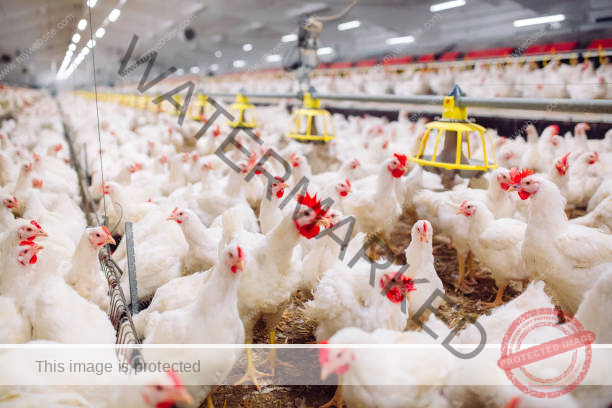
Starting a Poultry Farm with Limited Resources in Ghana: A Comprehensive Guide for New Farmers

How To Register Agribusiness Company In Kenya (See Full Guide)

Starting a Poultry Farm with Limited Resources in Nigeria: Guide for New Farmers
One reply to “[pdf sample] business plan for poultry egg farming docx”.
- Pingback: List Of Poultry Farms In UAE [Top 20] - Agrolearner
Leave a Reply Cancel reply
Your email address will not be published. Required fields are marked *
Save my name, email, and website in this browser for the next time I comment.
Notify me of follow-up comments by email.
Notify me of new posts by email.

How to Start an Egg Business
From writing a business plan to collecting eggs, everything you need to know.
- Swarthmore College
:max_bytes(150000):strip_icc():format(webp)/Betsy-Petrick-4x5-70cf94b5a1934c9199bddce1f2457f37.jpg)
- Ohio Wesleyan University
- Brandeis University
- Northeastern University
Treehugger / Julie Bang
- Urban Farms
- Planting Guides
- Indoor Gardening
Maybe you've been raising laying hens for your family and wanted to expand, or perhaps you're starting fresh with a new flock and already know you want to get into the business of selling eggs. Either way, raising chickens who produce farm-fresh eggs can be a fun and profitable venture. There are just a few things to consider when starting your own egg business that will ensure your success.
Know Your Market
Treehugger / Julia Cook
You'll need to make sure that a market for homegrown eggs exists in your area. And you'll want to see what prices others are commanding per dozen. When looking at other local egg offerings, consider: are the chickens fed organic feed? Are they "pastured," where they spend all day out on the grass, eating bugs and the growing tips of plants as well as chicken feed?
You'll want to determine where you will sell your eggs. Many states have exceptions for farmers selling eggs on a small scale. But if you want to go beyond that, you may need to set up a USDA-inspected egg washing facility. If looking locally, how much turnover does your local food co-op or grocery store have for eggs? Many places can't keep stock of good, local eggs, but in some towns or rural areas, there may be an oversupply.
Know the Laws
As mentioned above, depending on your state and local laws, you may need to set up special facilities to clean your eggs. You may be allowed to, or prohibited from, recycling egg cartons from other companies to package your eggs. If you put the word "organic" on your eggs, you will probably need to meet organic standards, which can be time-consuming and costly.
Your county extension agent is a good place to start to find out what local and federal laws may apply to your egg-selling business.
Write a Business Plan
The second step after knowing your market is to formalize your marketing plan by writing a business plan . A small farm business plan will not only identify your target market, but it will also look at how you might grow your business down the road, what price to set your eggs at, what costs contribute to producing the eggs, and what profit you can hope to generate.
Decide How Many Chicks You Want
With your business plan in place, you can work backward from the number of eggs you plan to sell each week, to how many chicks you need to get to meet that goal. Figure that during her prime, a laying hen will, on average, produce three to five eggs a week. If you plan to sell 10 dozen eggs a week, or 120 eggs, you can do the math to determine that 25 or 30 chicks will be a good number to start with.
Make sure you've done the hard work and that you have a market that can support the number of chicks you are getting for your flock.
You can also figure out pricing. What are your expenses each month for feed and other costs? Divide that by the number of dozens of eggs you plan to sell, and make sure you're charging well above your break-even point. You may have to spread the investment of building a chicken coop or putting up fencing over several years to make a profit, though, so don't calculate initial investment when setting your price.
Raise Your Chicks
Be sure when you choose your chicks, you're picking a breed that is very productive in the egg-laying department, and that also are hardy enough to survive in your climate. If you are in the north, you will want to consider supplementing with light in the winter, so that your hens produce eggs all year round.
Raising laying hens on pasture can make for better eggs, and discerning customers now know the difference. Deep, rich orange yolks bursting with flavor is what many now expect - and what you should easily get from hens with access to grubs, grasses, and the ability to roam over several acres to find the tastiest meals. On top of pasture, you'll want to provide high-quality feed and possibly additional calcium for strong shells. You can also supplement with food and garden scraps.
Collect and Clean Eggs
How you collect and clean eggs is extra important when you are selling them to others. Make sure that you know how to properly clean your eggs so that you minimize the risk of salmonella poisoning.
Package and Sell Eggs
Once collected, it's time to package and sell your eggs . Consider your business plan when thinking about how to package your eggs. A nice label with a graphic logo can go a long way toward selling your eggs over another local brand. Make sure to follow all the requirements of your local and state laws when packaging and selling eggs.
Reassess and Reevaluate
With any business, ongoing assessment and evaluation of the success of the business are key. If things are not running smoothly with your egg business, it may be time to reassess - the markets, your infrastructure (coop and fencing), and even whether continuing to sell eggs is the right choice for you. Don't be afraid to reevaluate your egg business from time to time to make sure it's working well for your small farm .
“ Sale Of Eggs In Minnesota .” State of Minnesota Department of Agriculture .
“ Egg Sales & Licensing .” State of Wisconsin Department of Agriculture, Trade and Consumer Protection.
“ Sanitation Requirements .” U.S. Department of Agriculture.
Golson, Terry. The Farmstead Egg Guide & Cookbook. Houghton Mifflin Harcourt . 2014.
Hermes, James. “ How To Feed Your Laying Hens .” Oregon State University.
- Raising Pullets for Your Small Farm or Backyard Coop
- How to Sell Chicken Eggs
- Starting Your Small Farm from Scratch
- How to Sell Farm Products to Food Distributors
- How to Start a Small Farm Business
- Should You Raise Turkeys?
- How to Start a Small Farm
- How to Start a Hobby Farm
- How to Raise Goat Breeding Stock
- How to Get Chicks
- 5 Questions to Ask Before You Bring Chickens Home
- Raising Sheep on a Small Farm
- Are Eggs Vegan? Overview, Ethics, and Plant-Based Alternatives
- How to Raise and Care for Baby Goats
- Get the Facts on Chicken Tractors
- How to Raise Dairy Goats for Milk

Starting Poultry Egg Farming Business Plan (PDF)

The poultry egg farming business offers a compelling blend of financial stability, scalability, and sustainability that makes it a noteworthy pursuit. The allure of layers chicken farming business lies in its ability to provide a consistent stream of income. With layers chickens laying eggs prolifically throughout the year, the financial predictability this venture offers is unparalleled. But beyond that, the profitability margins in this business are good, making it not just a sustainable endeavor but a highly lucrative one. The demand for eggs has soared to unprecedented heights, making the layers chicken farming business an exceptionally attractive venture to explore. Eggs, a dietary staple for countless households worldwide, enjoy enduring popularity due to their nutritional value and versatile culinary applications. As the global population continues to grow and dietary preferences evolve towards healthier and protein-rich options, the demand for high-quality, locally-sourced eggs has surged. This robust and consistent demand ensures a ready market for layers chicken farmers, underlining the profitability and sustainability of this business in meeting the ever-increasing appetite for eggs.
It is important that you understand how to manage the layers egg production business well so as to be profitable. Each business has principles that need to be followed in order for it to be successful. You need to have sufficient knowledge about how to efficiently take care of the layer chickens as well as good business management skills plus a good poultry egg farming business plan. This article will outline how to start the layers egg production business, and the poultry egg farming business plan – PDF, Word and Excel.
This article and business plan is about poultry egg farming (egg production). We also have articles and business plans for
Broiler Poultry Farming Business
Free Range Chicken Farming Business
Click the links above to go to the articles and business plans.
Market Research
Before starting a layers chicken farming business, conducting thorough market research is an essential step that can greatly influence your success. Understanding the market dynamics, consumer demand, and competition in the poultry industry is crucial for making informed decisions and positioning your business for growth. Part of conducting comprehensive market research for your layers chicken farming business is gaining a deep understanding of the pricing dynamics within your target market. This involves not only knowing the prevailing market prices for eggs but also identifying potential customers, their ordering frequency, and the quantities they typically purchase. Identify your target market for layers chicken eggs. Are you planning to sell directly to consumers, local businesses, or wholesale to larger distributors? Determine the demographics, preferences, and purchasing behaviors of your potential customers. Also determine the pricing strategy for your layers chicken eggs. Calculate your production costs, including feed, labor, and overhead expenses, to set competitive yet profitable prices. Consider pricing models that align with market demand and your business objectives, such as premium, value, or volume pricing.
Analyze the competitive landscape in your area. Who are your competitors, and what is their market share? What sets your layers chicken farming business apart from others? Investigate their pricing strategies, product quality, and customer satisfaction levels. This information can guide you in developing a competitive advantage and differentiating your business in the market. Examine the supply chain involved in the layers chicken farming industry, from sourcing chickens and feed to egg distribution. Identify potential suppliers and establish relationships with reliable partners. Understanding the supply chain can help you optimize your operations and ensure a steady flow of resources.
Land For Poultry Egg Production Business
When starting a poultry egg farm you need the right amount of land and proper housing for your birds. The size of your project will determine the size of the land you will need. You also have to consider transport networks – your layers farm should be easily accessible as you will regularly have to transport eggs to the market and deliver stock feeds to the poultry farm. Other factors to consider include labor costs – you should locate your farm where cheap labour is available so as to cut operational costs thus increasing profitability of the poultry egg farming business. The location should be secure and have reliable water supply as the layers chickens require water daily. An egg farm business should be located close to the target market as eggs will need to be regularly transported to the market. You should not locate the poultry egg farming project close to rivers or streams as this may result in the pollution of water by chicken drops during rainfall periods.
Layers Deep Litter System Vs Battery Cage System
There are 2 main housing systems that are used for layers. These are the deep litter system and the battery cage system. The deep litter system is whereby the layer chickens stay on a cemented floor of the layer house. It’s called deep litter because you will have to spread litter/bedding on the floor to provide comfort for the layers chickens. The bedding is usually in the form of wood shavings and saw dusts. In the deep litter system, the feeders & drinkers will be placed on the floor or hanged at a level where the layers chickens can reach. The battery cage system is a way of raising layers chickens in cages. This is the most popular way of carrying out commercial egg laying business. One of the main advantages of the battery cage system is that it uses less space as compared to the deep litter system. Thus you can rear a large number of layers birds per unit area as compared to the deep litter system. The battery cage system also reduces feed wastage (in deep litter system birds can move around and spill feed), ensures easy stock take, makes it easier to identify layer birds which are not producing eggs, and reduces cannibalism and egg eating.
Management of the layers birds is easier in the cage system. Battery cages are usually equipped with nipple drinkers that supply water to the chickens automatically, which is convenient. Layers cage system requires less labour as compared to deep litter system, thus increasing profitability of the egg production business. Diseases spread faster in the deep litter system as compared to the layers cages system – this is because the layers cage system limits the movement of birds, and the layer birds do not come into contact with their droppings. The disadvantage of battery cage system in poultry egg farming business include : its capital intensive as the cages are expensive, the layers chickens can easily suffer from leg problems, cage fatigue, and increased deposition of fat in the body. The housing system that you use should be clearly stated in your layers poultry egg production business plan.
Layers Chickens Housing
You should provide good housing for the layers chickens so as to have a profitable egg production business. When you are planning to construct a layers egg chicken house, you have to select a site which is well-drained with plenty of natural air movement. Layers chickens cannot adjust well to temperature extremes, so it is very essential that the layers hens be housed, cared and provided with an environment that will enable them to produce eggs efficiently. The design and size of the layers chicken house is determined by the number of layers chickens being kept, the cost and the climatic condition of the area. It is essential to house layers chickens of the same age together. This is to prevent potential problems like high risk of continuous infection. It also allows the farmer to administer the right feeds and follow the right method of lighting for the layers chickens. Your housing for the layers chickens can be barns, layer cages, chicken runs, hutches or chicken coops. The housing should provide adequate space for the layers chickens, should have a good ventilation system, should protect the layers chickens from extreme weather conditions and predators. Light stimulates egg production in layers, so the housing should have access to sunlight or artificial lighting. Costs of constructing the housing should be included in the poultry egg production business plan.

Equipment for Layers Egg Production Business
The equipment you need will be determined by the kind of system you choose to use, whether it is deep litter system or a cage system. The required equipment include feeders, drinkers, lighting system, chicken layer nests and waste disposal system. If you choose the cage system, make sure that you invest in layer cages that already have laying nests, feeders, and drinkers. For drinking, the nipple drinkers are worth the investment for the chicken cage. You can also consider using tanks, water regulators and pipes together with the drinking nipples for a complete drinking system. You should also choose the right chicken feeder trough to save on chicken feed – some chicken feeders have bad design which leads to wastage of feed.
The other equipment that may be required includes sprinklers, a moisture meter, vaccinator and eggs transportation trays to name a few. You should also invest in manure cleaning equipment especially if you keep the chickens in barns or chicken runs. Wet chicken manure leads to a high concentration of ammonia, which is bad for your hens’ respiratory system and eyes. As such, ensure that you regularly clean the barn or wherever you decide to keep the layers chickens. Take note that organic manure is great for your garden and some people sell it to crop growers. If you use a battery cage or chicken cage, you can save yourself space and the chickens can be separated from the manure. The layer farming business plan should take into account the costs of purchasing the equipment.
Point of Lay Chickens vs Layer Chicks
When investing in a poultry egg production business, you will have to make a choice between starting with day old layer chicks or point of lay birds. Point of layer chickens are young layers hens that are about to start laying eggs – they start to lay eggs at about 19 weeks of age. You can purchase day old layer chicks and feed them until they are 19 weeks old then they will start laying eggs – this means that you will have to wait for about 5 months before getting any revenue. So it may be best to invest in point of lay chickens since they are ready to start laying eggs – thus your layers egg production business can immediately start generating revenue with no waiting time. Take note of the risks when purchasing point of lay chickens. Make sure that the chickens are of high quality because you may end up spending too much money on layers with low egg production numbers. Some of the ways you can tell if point of lay chickens are of good quality is by observing the birds. Healthy birds are lively, with no forms of injuries and they respond well to feeding.
Whatever you decide to start with make sure that you buy your day old chicks or point of lay chickens from a reliable accredited hatchery where the parent stock is well managed. Layers chickens from different hatcheries vary significantly in terms of their quality and it will determine the success of your poultry egg farming business. If you buy point of lay chickens which are not well vaccinated, the layer chickens will have a low rate of egg production and a very high mortality rate. This will obviously lead to a financial loss for your layers chicken farming business.
When deciding whether to buy day old chicks or chicken layer eggs consider your level of experience raising chickens in addition to your available resources. If you have the capital as well as some experience raising day old chicks you can start rearing day old chicks. However, if your resources are limited you may want to consider starting with point of lay chickens. Make sure that you consider the vaccination history and age of the point of lay chickens. Many breeders will claim that the chickens have been vaccinated but that may not be the case. So, you must avoid buying point of lay chickens or even day old chicks from unreliable hatcheries. The costs of purchasing the point of lay birds or layers chicks should be included in the layers egg production business plan.
Layers Feeds
When it comes to feeding your layer chickens consider using a complete feed from a recognized feed store. Complete feeds provide your birds with a nutritionally balanced diet. In addition to the feed you provide your chickens, you can also supplement the layer chickens with scratch grains, table scraps and clippings. Scratch grains are low in protein and high in energy and fiber, but this is based on the grains you use. When you feed your layer chickens with scratch grains together with complete feeds, it helps dilute the nutrition levels in the carefully formulated diets. You can also feed your layer chickens table scraps such as peelings, stale bread, and leafy vegetables. Just make sure that the scraps are not rotten to prevent botulism. You can add clippings such as pasture or tender plants. Feeding your layer chickens well will give you higher laying rates, better persistency and a longer production cycle, thus increasing the profitability of your egg production business.
To produce a high number of eggs, the layer chickens must get adequate feed. Hens need plenty of calcium in their diets to lay eggs with hard, strong shells. The feed for layers chickens is called Layers Mash. The mash is specially formulated to provide all the nutrients they need in the correct quantities. Feed must be available in the trough at all times, as well as cool, fresh water in the bottles. On average, each laying hen requires 100g-120g of feed every day. The aim of the egg producer is to convert a given amount of feed into as many eggs as possible. It is very important to give the layers the right feeds, and the right quantities, so that they grow well and have a high egg production rate. The poultry egg farming business plan should take into account the costs of the layers feeds.
Business Model
There are two primary options for starting the layers egg farming business: one can either begin with day-old chicks or opt for point-of-lay chickens. The key cost components of this business revolve around acquiring the chicks or point-of-lay chickens and providing them with feed. For day-old chicks, an essential aspect of the operation is raising them to maturity, typically up to 21 weeks of age when they start laying eggs. In contrast, point-of-lay chickens are already at the egg-laying stage upon acquisition, requiring you to provide them with food and water, after which they will consistently lay eggs. The revenue generated from selling these eggs significantly surpasses the input costs and operational expenses, leading to a healthy profit margin. What sets this business model apart is the consistent egg production throughout the year, ensuring a steady stream of income. The layers chickens can continue laying eggs for a period of up to 18 months. After this period, you have the opportunity to sell them, generating additional revenue. To maintain the sustainability of your layers chicken farming business, it’s necessary to replace the flock with a new batch of chicks or point-of-lay chickens. This cyclical process allows you to rejuvenate your flock, ensuring continuous egg production and income generation.
Whether you choose day-old chicks or point-of-lay chickens as your starting point, the layers’ ability to lay eggs consistently becomes the cornerstone of profitability in this business. This steady egg production provides a reliable source of income, offering financial stability for the layers chicken farming venture. By carefully managing the inputs, primarily feed and water, and maintaining the health and well-being of your chickens, you can maximize the production of high-quality eggs, ultimately contributing to the long-term success and sustainability of your layers chicken farming business.
Management and Labour
The number of farm workers you need will depend on the size of your poultry egg production project and your layer hosing system. Battery cage system requires less labour as compared to the deep litter system. If you are operating a small poultry egg farming business e.g. 100 birds, you and your family may be enough to take care of the birds. However if you are keeping 2000 chickens for egg production, then you will need full time employees to manage the poultry farm. There is need for good technical knowledge of poultry egg production techniques for success in the business, and good management skills. The salaries and wages of your employees should be included in your poultry egg production business plan.
The amount of capital required for the poultry egg production business depends on the scale of the project. You can get a loan from the bank, or funding from investors, to use as capital to start your poultry egg farming business. If you plan to raise capital from investors and a loan from the bank, you need a good poultry egg farming business plan. If you don’t have access to investors and bank loan, you can use your personal savings and start small, and grow your business overtime. Egg production business is very profitable. If you reinvest the profits you get, you can quickly grow.
Marketing Plan
Layers are mainly reared for egg production. There are also possibilities of selling them as off-layers for meat. They can also be sold as layers to other farmers. That is why some of the core customer segments are consumers in general, traders, retailers, and farmers. Marketing of layers must be targeted to the intended prospects. Some of the most strategic targets are bulk clients. Examples are supermarkets, shops, hotels, and restaurants. Marketing to them can entail approaching them with a proposal to become their supplier. Another strategy is to participate at local farmers’ markets. The thrust is to capture customers who purchase in bulk, regularly. If that is achieved it will minimize marketing and logistical costs as well. The heart of the marketing plan must be centered on digital marketing. This includes content marketing via a website, social media, online marketplaces, and email marketing, amongst others. There are countless marketing opportunities on online platforms. This means you should have professionally designed and detailed e-fliers that you use on social media. Effective marketing of layers must skirt middlemen in order to deal directly with paying customers.
Market for Poultry Eggs
The demand for eggs is very high. Over 82 million tonnes of eggs is consumed globally annually. That’s a lot! Eggs are considered an alternative cheap source of proteins. Almost every household consumes boiled/fried eggs. Increasing protein consumption and rising incomes drive consumption of eggs. Around the world, consumption of eggs is on the increase. This increase is particularly notable in developing countries where changing diets have people consuming a greater number of calories from protein sources like poultry meat and eggs. You can supply your eggs to individual households, supermarkets / grocery shops, wholesalers, schools, restaurants, companies, organizations, events etc.

Advantages of Layers Egg Farming Business
Starting a layers chicken farming business offers numerous advantages that make it an attractive venture for entrepreneurs and farmers alike. One of the most significant benefits is the assurance of a steady and consistent income. Layers chickens are prolific egg producers, capable of laying eggs throughout the year, providing a reliable source of revenue that allows for effective financial planning. This consistency in egg production ensures that the business remains profitable even during economic downturns, providing a sense of financial security.
Moreover, the layers chicken farming business boasts good profit margins. Eggs are a staple food item with a consistent demand in both urban and rural markets. When managed efficiently, this business can yield substantial profits. Controlling production costs and optimizing operational processes are key to enhancing profitability. The affordability of starting a layers chicken farm is another advantage, making it accessible to a wide range of individuals and entrepreneurs.
Furthermore, layers chicken farming offers scalability, allowing you to tailor the business to your specific goals and resources. Whether you’re starting on a small scale for personal consumption or aiming for large-scale commercial production, the flexibility of this business ensures that you can expand or contract as needed. Additionally, it presents an opportunity for skill development, as running a layers chicken farming business provides valuable experience in animal husbandry, business management, and marketing. Overall, the layers chicken farming business is an enticing prospect for those seeking a sustainable and profitable agricultural endeavor.
Why You Need a Layers Chicken Farming Business Plan
A well-structured business plan for a layers egg production business is instrumental in helping you understand its profitability. It serves as a financial compass, providing insights into revenue projections, operational costs, and overall financial viability. By meticulously outlining factors such as egg production rates, feed expenses, labor costs, and market prices, a business plan allows you to assess the potential profitability of your venture. Furthermore, it helps you identify critical factors that can affect profitability. Armed with this knowledge, you can proactively strategize to maximize profitability, mitigate risks, and make informed decisions to ensure the long-term success of your layers egg production business. A business plan is a financial roadmap, outlining your startup costs, operational expenses, revenue projections, and potential profitability. Having a clear financial roadmap helps you secure funding, make informed financial decisions, and mitigate financial risks. If you need financial support to start or expand your layers chicken farming business, a well-structured business plan is essential for attracting investors, lenders, or potential partners. It demonstrates your commitment, professionalism, and the potential for a return on investment.
Your business plan outlines the day-to-day operations of your layers chicken farm, detailing how you will manage tasks such as feeding, housing, and disease control. Having these operational procedures documented promotes efficiency and helps you troubleshoot potential challenges. Furthermore, a business plan encourages you to identify potential risks and challenges that may arise during the course of your layers chicken farming business. By acknowledging these risks upfront, you can develop strategies to mitigate them, enhancing your ability to adapt to unexpected situations.
Pre-Written Poultry Egg Farming Business Plan (PDF, Word And Excel): Comprehensive Version, Short Funding/Bank Loan Version and Automated Financial Statements
For an in-depth analysis of the poultry egg farming business, we encourage you to purchase our well-researched and comprehensive business plan. We introduced the business plans after discovering that many were venturing into the poultry egg production business without enough knowledge and understanding of how to run the business, how to keep the layers, lack of understanding of the financial side of the business, lack of understanding of : the industry, the risks involved , costs and profitability of the business; which often leads to disastrous losses.
The StartupBiz Global business plan will make it easier for you to launch and run your layers egg production business successfully, fully knowing what you are going into, and what’s needed to succeed in the business. It will be easier to plan and budget as you will be aware of all the costs involved in setting up and running the poultry egg farming business.
Uses of the Poultry Egg Farming Business Plan (PDF, Word And Excel)
The Chicken egg production business plan can be used for many purposes including:
- Raising capital from investors/friends/relatives
- Applying for a bank loan
- Start-up guide to launch your egg production business
- As a project/business proposal
- Assessing profitability of the poultry egg farming business
- Finding a business partner
- Assessing the initial start-up costs so that you know how much to save
- Manual for current business owners to help in business and strategy formulation
Contents of the Poultry Layers Egg Production Business Plan (PDF, Word And Excel)
The business plan include, but not limited to:
- Marketing Strategy
- Financial Statements (monthly cash flow projections, income statements, cash flow statements, balance sheets, break even analysis, payback period analysis, start-up costs, financial graphs, revenue and expenses, Bank Loan Amortization)
- Risk Analysis
- SWOT & PEST Analysis
- Industry Analysis
- Market Analysis
- Operational Requirements (Including technical aspects of how to keep and rear the layers, feed requirements etc)
- Operational Strategy
- Why some people in poultry egg farming business fail, so that you can avoid their mistakes
- Ways to raise capital to start your poultry egg production business
The Pre-written Layers Egg Farming Business Plan package consist of 4 files:
- Poultry Egg Farming Business Plan – PDF file (Comprehensive Version – 71 Pages)
- Poultry Egg Farming Business Plan – Editable Word File (Comprehensive Version – 71 Pages)
- Poultry Egg Farming Business Plan Funding/Bank Loan Version- Editable Word File (Short version for applying for a loan/funding – 38 pages)
- Poultry Egg Farming Business Plan Automated Financial Statements – (Editable Excel File)
The business plan can be used in any country and can be easily edited. The financial statements are automated. This implies that you can change eg the number of layers, selling price of the eggs etc, and all the other financial statements will automatically adjust to reflect the change.
Click below to download the Contents Page of the Poultry Egg Production Business Plan (PDF)
Testimonial 1
StartupBiz Global provided a very professional and comprehensive business plan which I used for my business. The business plan was easy to edit, and I was able to get the funding which I wanted. I highly recommend their business plans.
Testimonial 8
Just wanted to say I am very happy with the business plan and I will gladly recommend your products, thank you very much and have a great day.
Testimonial 3
I was extremely lucky to come across StartupBiz Global. Their business plan exceeded my expectations, and most importantly I was able to secure a loan from my bank. Thank you guys, now my dreams are coming true!
Testimonial 6
I purchased a business plan from you, and I’m glad to inform you that I was able to get my loan, and I’m starting my poultry farming business on the 1 st of July. This was made possible because of your business plan. Thank you very much, you made my dream come true.
Testimonial 5
I was able to understand the business side of farming because of your business plan. You did extensive research; the business plan was well prepared and fully detailed. It made everything clear, and I have somewhere to start now. I am confident that I am going to succeed in my business because of the guidance from your business plan.
Testimonial 7
I found Startupbiz Global online when I was in desperate need of a business plan. I was overwhelmed by the quality of the business plan, it’s comprehensive and well researched! I did not have to wait to get the business plan, I got it instantly after payment. I highly recommend Startupbiz Global, and would happily use them again in the future.
Testimonial 2
Many thanks for your incredibly efficient service and thorough business plan. I am very impressed with the business plan. Before I bought the business plan, I tried to do my own business plan – it was such a nightmare and it turned out badly, also not to mention the stress it caused me. I wish I knew about your website earlier!
Testimonial 4
The business plan which I purchased from your website saved me TIME and MONEY! The layout of the business plan was excellent. The financial statements were detailed and easy for me to edit. I will come back to purchase another business plan soon.
Get the Poultry Egg Farming Business Plan (PDF, Word And Excel)
Click Buy Now below to purchase using Paypal, Credit Card, or Debit Card. After you have purchased, you will immediately see the download link for the business plan package on the screen. You will also immediately get an email with the business plan download link. The Pre-written business plan package (PDF, Word, and Excel) costs $30 only!

If you want to purchase multiple business plans at once then click here: Business Plans Store.
The business plan package is a zipped compressed file containing the PDF, Word and Excel documents. To open the package after downloading it, just right click, and select Extract All. If you have any problems in downloading and opening the files, email us on [email protected] and we will assist you.
We wish you the best in your poultry egg farming business! Check out our collection of business plans , and more business ideas .
Related Posts

Profitable Retail Store Business Ideas

Starting an Internet Cafe Business Plan (PDF)
Starting a profitable construction business.

Top 9 Green Business Ideas

Join our mailing list to receive the latest posts and updates from our website.
You have Successfully Subscribed!
- Skip to primary navigation
- Skip to main content
- Skip to primary sidebar
The Big Book Project
Agribusiness Training & Startup Tools
Poultry Business Blueprint: How to Plan, Launch, and Grow a Profitable Poultry Farm
Last updated on November 15, 2021 by Temi Cole 1 Comment

I’m about to share with you my 15-point blueprint for writing a winning poultry farming business plan.
(Step-by-step.)
The best part?
You’re going to get linked to LOTS of business planning resources including real-life case studies within these steps.
Let’s take a look together…
- Step #1: Get ‘The Most Complete’ Poultry Farming Business Plan Template
- Step #2: Download “The Poultry Farm Business Plan Analysis Playbook”
Step #3: Download Poultry Plan It (eBook)
Step #4: download poultry project reporter 2.0 – insider’s guide, step #5: download sample poultry plan data, step #6: use business management templates (keep sheet).
- Step #7: Download Business Records for Poultry Keepers eBook (USDA Bulletin 1614)
Step #8: Subscribe To Poultry Project Reporter 2.0 (Fill-In-The-Gap PDF Builder) Software
Step #9: download zero debt: poultry farming business plan (2021) pdf ebook, step #10: download grow agribusiness faster classes, step #11: download poultry project hub pdf ebook, step #12: take the poultry farmer’s business quiz, step #13: download poultry project planning toolkit ebook v.1, step #14: download poultry business start-up: recommended digital tools of the trade, step #15: get a 1-to-1 poultry farming business planning review, step #1: get the best poultry farming business plan template.
A poultry farming business plan template is usually the no.1 request I get asked for as the author of The Big Book Project.
Emails like this are a good example:
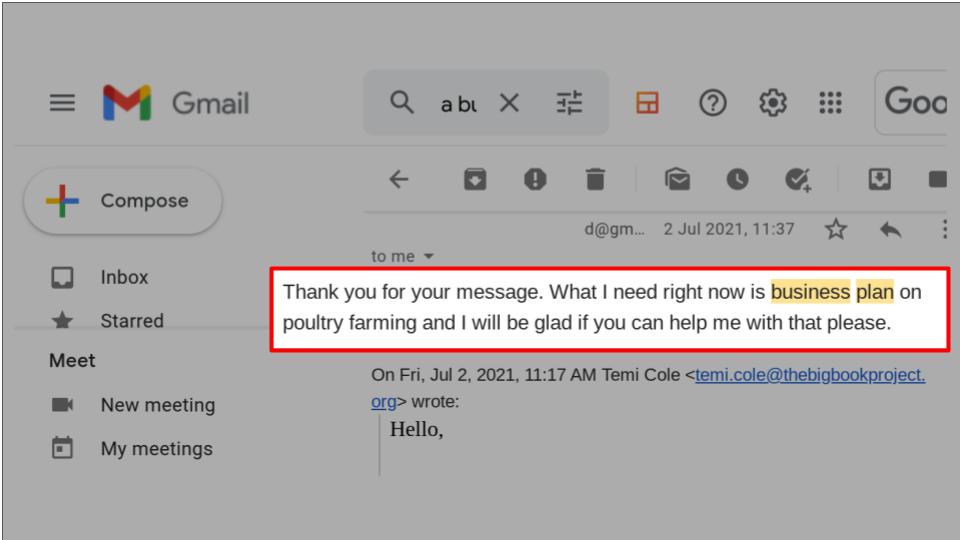
Up until now, it’s been an obvious MISS as part of The Big Book Project…
…ready-made business planning consultancy for the beginner.
I always had it in mind to plug in the gap.
It’s in me to do.
With the experience of 10+ years serving start-up entrepreneurs with strategic business planning consultancy…there are countless benefits to offer here.
However, I didn’t want to rush.
I wanted the solution I delivered to ANSWER ALL QUESTIONS. And be handed over in a way that is:
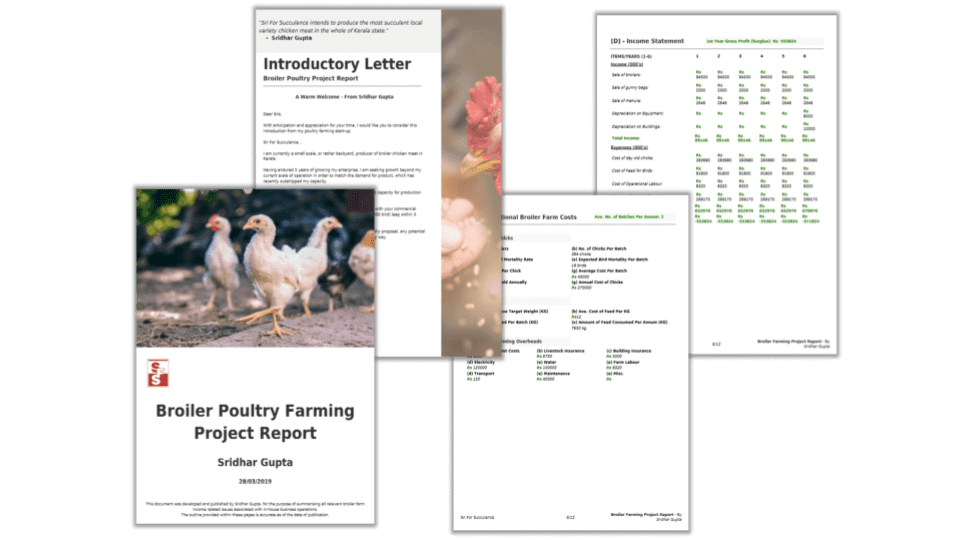
Write Your Poultry Business Plan - in Just 90 Mins!
Poultry Project Reporter 2.0 - fastest way to write your project report online.
- self-explanatory
- self-driven
…the more flexible, yet comprehensive the planning materials are – the easier they will be to use and act on.
( And business does come down to action at the last .)
The Ultimate Poultry Farming Business Planning Template
My first step was to construct what I consider to be the most complete poultry farming business plan template possible.
The kind of thing that covers both bases of:
- helping to provide clarity to your thoughts for rolling out a successful poultry business launch
- communicating an attractive proposal to potential stakeholders and investors
Pouring in over 50,000+ hours of strategic business consulting experience which spans:
- global best practice insights and technology
- corporate currency exchange
- project management
- financial advisor and stockbroker
- freelance business management advisor
…I decided upon the following outline template:
Executive Summary
What is the business?
Why is it needed?
How will it deliver?
What are the financial rewards of investment?
Industry Analysis
Industry snapshot
SWOT & PESTLE (situational) analysis
Competitive forces
Vision & Mission Statement
Key function
Aspect of life
Product type
Scope and audience
Principles & promise
Feel good and standards
Poultry farm slogan
Competitive Analysis
Products and services
Marketing and sales
Key strengths
Marketing Strategy
Physical evidence
Leadership team
Professional profile
Financial Plan
Profit and loss
Balance sheet
Labour budget
Key performance indicators (KPIs)
It’s 38-parts that together spell out every critical element of poultry business success.
You simply won’t find a more comprehensive effort to fully load a poultry farming business plan with ALL ESSENTIAL INGREDIENTS.
Want a breakdown of what each part really contains?
That’s EXACTLY what’s up next…
Step #2: Download The Poultry Farm Business Plan Analysis Playbook
As shared above, I’ve taken the time to draft what I am absolutely certain is THE market leading poultry farming business plan template – FULL STOP.
It’s got it all.
But what about the detail? And how should it be used?
Business planning analysis: the KEY to using my business plan template – like a PRO
Like so many business planning template solutions out there like bPlans, for example, they do a good job of setting a solid format, BUT…
…where they FALL SHORT is in giving you some real-life examples of how to APPLY the template .
In other words,
Most business planning tools out there don’t give you examples of how real poultry businesses measure up with the tool.
And because of this, those other planning tools leave you GUESSING what to do with it.
So you end up using it as a first-time pupil uses an exercise book:
Unskillfully and regrettably (“…don’t want to go back there again if I can help it…”).
When actually, what you NEED is a dynamic, “can’t put it down”, interactive ACTION plan – with bite.
…this is the reason I wrote this series of poultry farming business planning analyses.
Here’s what my business plan analysis will do for you…
To take all the guesswork and wandering out of planning your poultry business.
And to show you EXACTLY HOW a real-life poultry start-up success story marries up with my winning business planning formula…
…giving expert insight into how BEST to use the template to plan your own success.
The result?
(Way much better than just templates or homework…)

Step-by-step, proven insights of what REALLY works and why in every step of writing your own poultry business plan.
= 1st rate consultancy & on-the-shoulder advice – at your own pace ( & at only a fraction of the price ).
You can access The Poultry Farming Business Plan Analysis Playbook here (Downloadable PDF version is available to paid subscribers )
So, why is an eBook the IDEAL partner to helping your write your poultry farming business plan?
(I’m glad you asked!)
Poultry Plan It: the blueprint to winning investment for your poultry business
Rather than present you with empty template boxes to fill out (which – let’s face it – offers zero value, both to you and potential investors)…
…instead,
My eBook called, Poultry Plan It – shows you EXACTLY how to:
- skillfully deliver and
- expertly pitch
…your poultry business plan to achieve 1 thing:
To Win Investment .
(Simple. My eBook “Poultry Plan It” shows you how to get investors to take your poultry business seriously .)

Read The Poultry Business - Like Never Before!
Chicken Snippets Newsletter - deep poultry analysis to sharpen your acumen, by email.
Does this eBook sound like what you need?
Try the first chapter called “ Poultry Plan It: Executive Summary ” right here .
Want to unlock the whole eBook as PDF download?
Become a paid subscriber and get “ Poultry Plan It ” by instant PDF download .
Have you ever wanted to see:
…how the financial PROs estimate future poultry investment returns?
…which poultry production models generate the most profit?
(I mean REALLY SEE?)
Then the Poultry Project Reporter 2.0: Insider’s Guide was written just for you.
Poultry Project Reporter 2.0 – Insider’s Guide: the ‘grain-by-grain’ financial analysis EVERY poultry business plan needs
I wrote the Poultry Project Reporter 2.0 – Insider’s Guide for two pressing reasons:
- …to plug in the gap of a general lack of ‘detailed, long hand’ financial poultry business calculations available online to help with planning profits.
- …a ‘case study based’ user guide for license holders of my proprietary software ‘Poultry Project Reporter’ – to find out ALL the inside hints and tips for producing rock solid financial projections.
Here’s a quick snippet of the level of breakdown I provide:
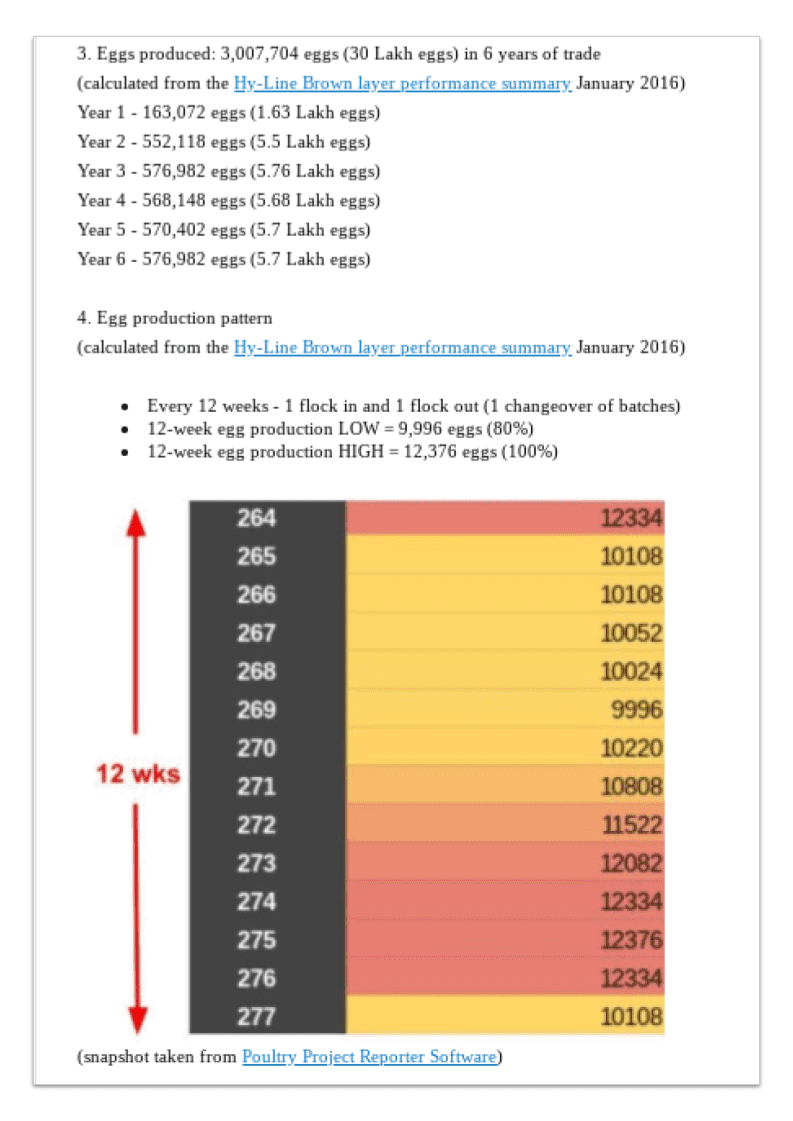
…literally, grain-by-grain, high precision detail.
BUT at the same time super simple to follow.
(With lots of visual content to really help you ‘get the picture’.)
Want to hear it from a reader?
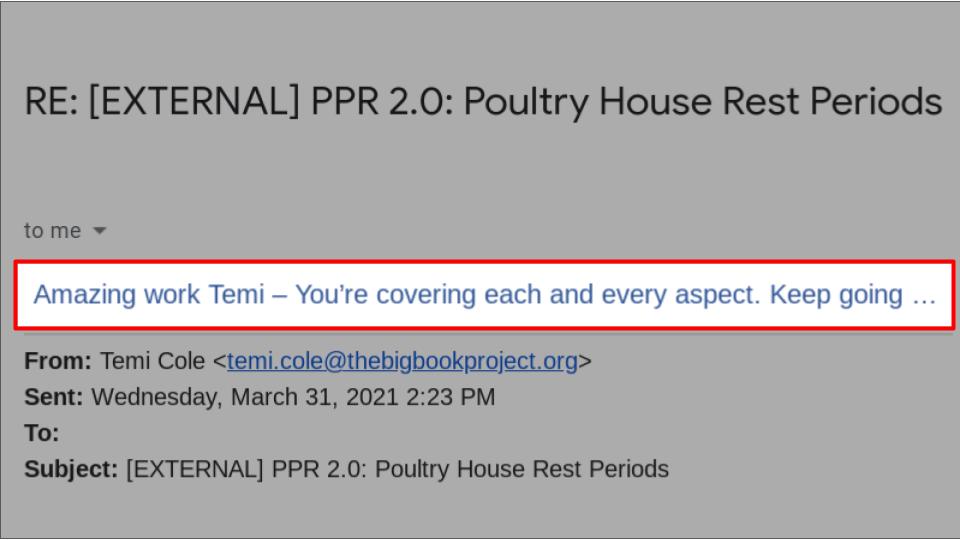
This feedback email was sent by a start-up poultry farmer.
He emailed me within minutes of receiving a mailshot of a FREE chapter from the Insider’s Guide.
So what’s actually ‘ inside ‘ the Poultry Project Reporter 2.0 – Insider’s Guide?
A great question.
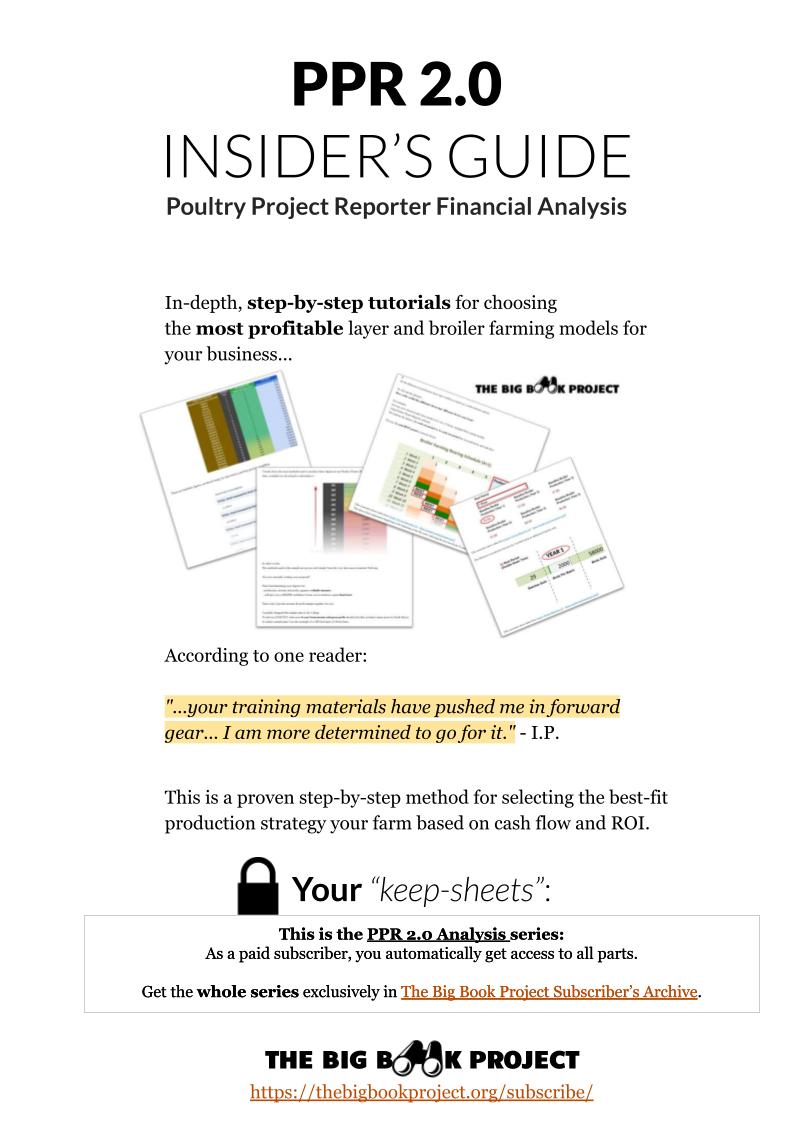
Here’s what you get:
Totally comprehensive and also a great handbook to accompany my proprietary software Poultry Project Reporter 2.0 .
Want to grab a copy of the PPR 2.0: Insider’s Guide?
Become a paid subscriber today and instantly get the inside track on financial planning for your poultry farm business.
Have a read of this:

…and there are many more requests like this in my inbox.
It seems when it comes to business planning help, poultry farmers and professionals alike are interested in scanning sample data too.
( Not just templates )
Sample papers: a GREAT way for self-assessing if your business plan is up to scratch
If you ask me, examples are without doubt the BEST way to learn.
Whenever I’m looking to work out a business model I always look for working models that already exist.
Never contrived or manufactured formulas.
As an adult, I don’t like to be spoon-fed. I learn best when I’m left a little room to figure things out myself.
Let’s take it back to class…
…why are past exam papers and examiner notes such a popular revision method?
SELF-ASSESSMENT.
(i.e. finding out for yourself how you measure up against standard.)
My preferred method of advanced learning.
And I don’t think I am alone in this.
This is exactly why I put together these sample poultry farming data plans – both layer and broiler models.
I left out any country bias, so these are a universal fit to any and every economy.
What do the samples contain?
There are 2 typical planning problems that these plans are designed to solve:
- Input and output VARIABLES,
- related to the SCALE and MODEL of your farm.
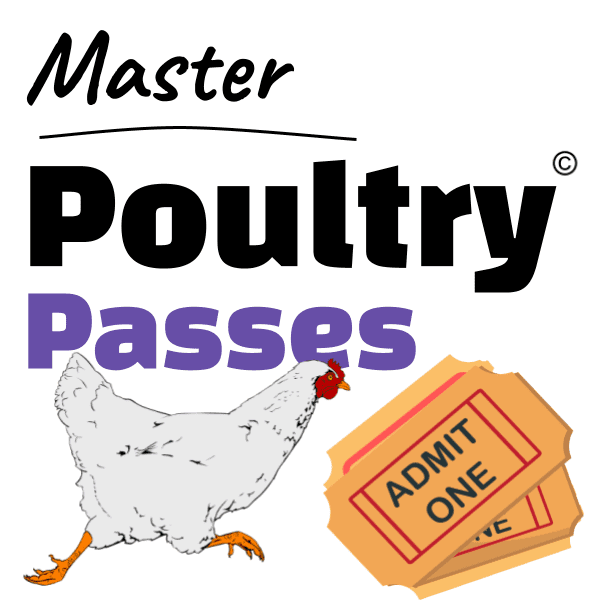
Master The Poultry Business - Like a Pro!
Poultry Courses Online - most actionable and interactive online poultry course.
In other words, these samples are shortcuts or crib notes for literally telling you if your planning progress is:
- en-route for success, or;
- taking a wrong turn .
I’ve arranged the samples according to the following attributes :
Broiler farming rearing models
- All-In-All-Out
Layer farming rearing models
Input/Output variable
- Feed consumption
- Production (meat or eggs)
- Broiler by product
These lists above are like ingredients to prescribed recipes.
Or, elements of an equation for solving a problem.
Mix them together in the right order and you answer critical questions within your poultry farm business plan.
Want an example?
The sample plans above will answer questions like,
“How much manure will a 2,000 bird broiler farm produce annually over 6 years, using the 4+1 rearing method?” Or, “How many eggs will a 5,000 layer farm produce annually over 6 years, using the 1+2 rearing method?”
Simply pull the relevant data set and immediately land your finger on the answer.
A convenient ‘plug-in’ to EVERY poultry farming business plan
Would you like a free sample?
Click on this link for a free egg production dataset for a 500-bird layer farm using 1+3 rearing system .
Now, are you ready for EVERYTHING?
Become a paid subscriber to gain instant access to ALL current sample plans PLUS future updates.
Another short falling of traditional business planning templates is that they are start-up focused .
It makes the value gained from them short-lived.
Think of it this way…
When you’ve finally launched your business, that’s just the beginning and not the end.
At the very least, you should have another 6 years on top of actually running your business.
If your templates are ONLY valid for start-up,
Then what do you use to keep your ongoing plans in order ?
Crush investment risk with my business management templates
Arguably, running the business is a far more risky phase of investment – most of all because now you have made a material commitment.
Therefore, you carry the potential of loss.
And business management also just happens to be the most challenging discipline to hold.
Because you’ve got SO MUCH going on all at the same time.
And staying organised becomes more and more difficult with every day that goes by.
CHAOS costs …
- you lose foresight, you lose track of progress and ultimately you lose money.
ORGANISATION profits …
you gain vision, you gain awareness and ultimately make money.
Business Management Templates
These templates are designed to help you stay on top.
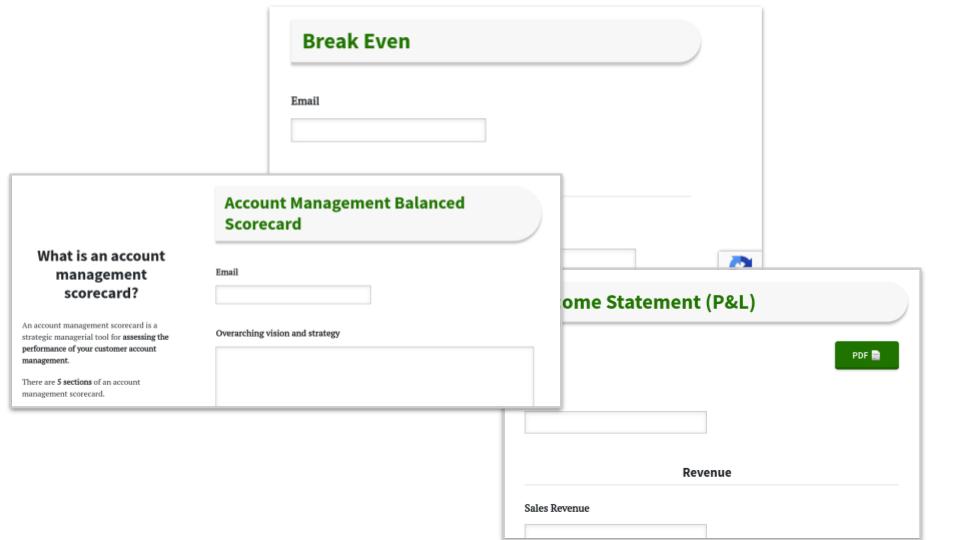
What’s included?
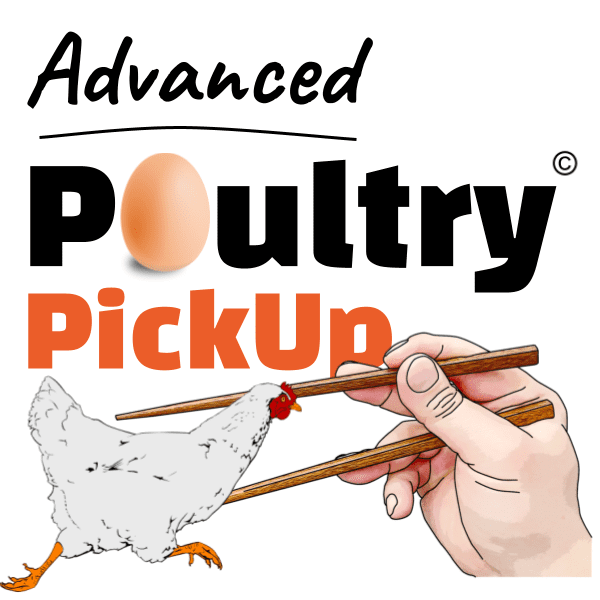
Advance Your Poultry Project - Into Maximum Profits!
Advanced Poultry Pickup - hands-on, 1-to-1 poultry business consultancy - anywhere.
Download the ‘Keep Sheet’ for future reference.
Want to start making business management plans?
Become a paid subscriber and access this suite of business management templates today.
Step #7: Download Business Records for Poultry Keepers eBook
This is a USDA eBook (United States Department of Agriculture – Farmers’ Bulletin 1614) from 1929.
(That’s right – it’s almost 100 years old!)
But testament to ‘things done well’…
…this evergreen piece of invaluable financial coaching for poultry farmers still holds true today, as when it was 1st published.
Business Records for Poultry Keepers: “Simply…DON’T attempt to write your poultry business plan without it.”
The motto of the eBook? “It literally pays for poultry farmers to keep records of current operations to guide their efforts in profitable directions.” In fact the book gives the following 6 great reasons why you need this download : (1) “… reduce the guesswork in poultry farming by helping the farmer to determine the actual reasons for poultry profits and losses,” (2) “… show the relative efficiency of different methods of production and marketing,” (3) “…make it possible for a poultry keeper to compare his results with published information (benchmark) on many poultrymen’s problems,” (4) “… show the financial progress a poultry keeper has made in his business,” (5) “… furnish information for credit statements when funds are borrowed,” (6) “… help to prevent disputes by serving as a check on business dealings.”
What is included in this eBook?
Business Records for Poultry Keepers

- Usefulness of poultry records
- Receipts and expenses
- Egg-production record
- Labor record
- Sales records
- Records of eggs and poultry for household use
- Pen records
- Incubation and hatching records
- Diary or notes on management
- Making use of the records
Want to pick up a copy?
Download the eBook here.
When I began writing The Big Book Project, I had one goal in mind:
To demystify investment proposal writing for start-up farmers.

By trawling the endless blog posts and comments in the small agribiz space online,
It became clear that MANY of us have the ambition to start up.
- see borrowing as the only root
- underestimate their business plan as just a means of getting a loan
- grossly misunderstand how to model production to make a profit
…and I desperately wanted to change turn this on its head.
Only, I made up my mind that I wasn’t going to go the traditional consulting route .
- Too expensive
- VERY limited
- Anti self-sufficiency ( clients grow dependant )
So, what were the alternatives to consulting?
- Perhaps, author a book
- Develop a proprietary software
- Run online courses
…these were just a few.
Then after extensive research and thinking things through…
…I settled for all 3 of the above alternatives, wrapped up into one package:
A book, plus bespoke software and an online course.
Enter: The Big Book Project
The Big Book Project ( https://thebigbookproject.org )
- An online eBook – pushed by a blog.
- A spin-off digital business planning tool called Poultry Project Reporter.
- And an online poultry farming course called Advanced Poultry Pick-Up.
In 2 years only,
the blog amassed 170,094 new search engine visitors alone
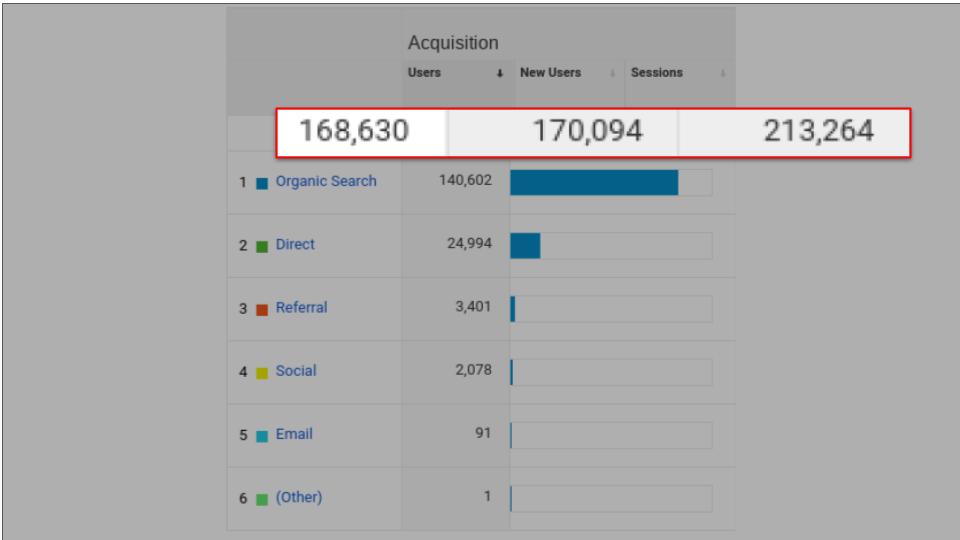
PLUS , a little over 8,000 newsletter subscribers too.
Mission accomplished.
(Well, almost – “… but what about that software? “)
Actually, one of the most popular enquiries received through my blog is for help writing poultry business proposals .
With all the best intentions in the world, there’s just not enough of me to go around the entire subscriber base giving out 1-to-1 proposal writing help.
So, I did the next best thing.
I made my advice automated (with the help of some handy digital tools) and wrote it one time only.
The result was Poultry Project Reporter and now we have just launched version 2.
What is Poultry Project Reporter 2.0?
Poultry Project Reporter 2.0: the fastest way of writing a professional poultry farming proposal
If you are looking to write a watertight poultry business proposal,
Then this Poultry Project Reporter 2.0 is a solid investment for you.
Here’s why:

Essentially, all you have to do is type in your data into the input field and then leave the publishing (complete with PDF download) – even the calculations to PPR 2.0
Are you ready to take a closer look at Poultry Project Reporter? Take a look at the dedicated Poultry Project Reporter 2.0 website
Poultry farming as a topic is MASSIVE worldwide.
It seems, when it comes to the subject matter of poultry farming, every country is both ‘ stalking it ‘ and ‘ talking it ‘ online.
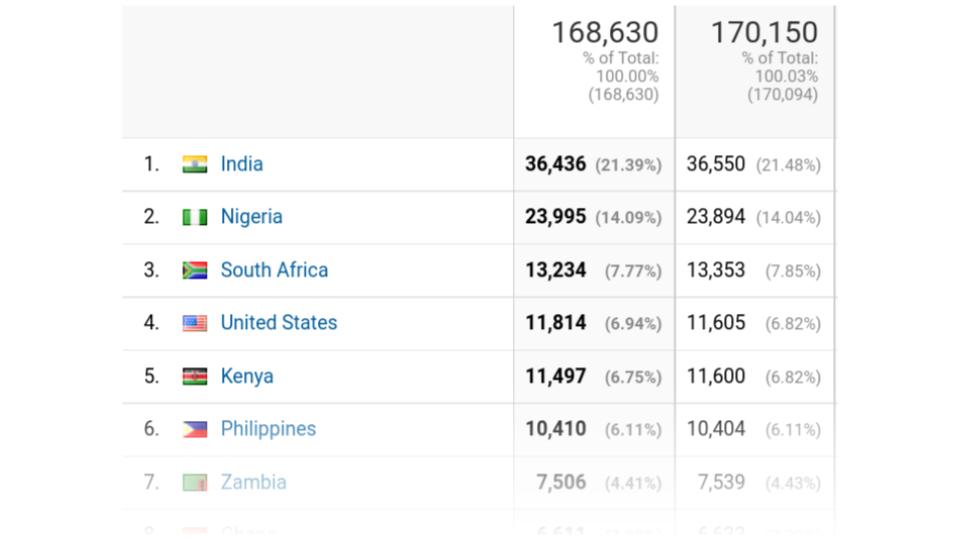
These stats from my blog above tell the tale of poultry farming and its popularity. It literally reaches every country in the world .
And despite all this talk about poultry farming business plans…
…I find a large percentage of the ‘audience’ has no capital funding availability (whether saved or borrowed) . Of course, this is totally natural and a reality for the majority, AND if you ask me a great ADVANTAGE.
Take this reader of my blog:
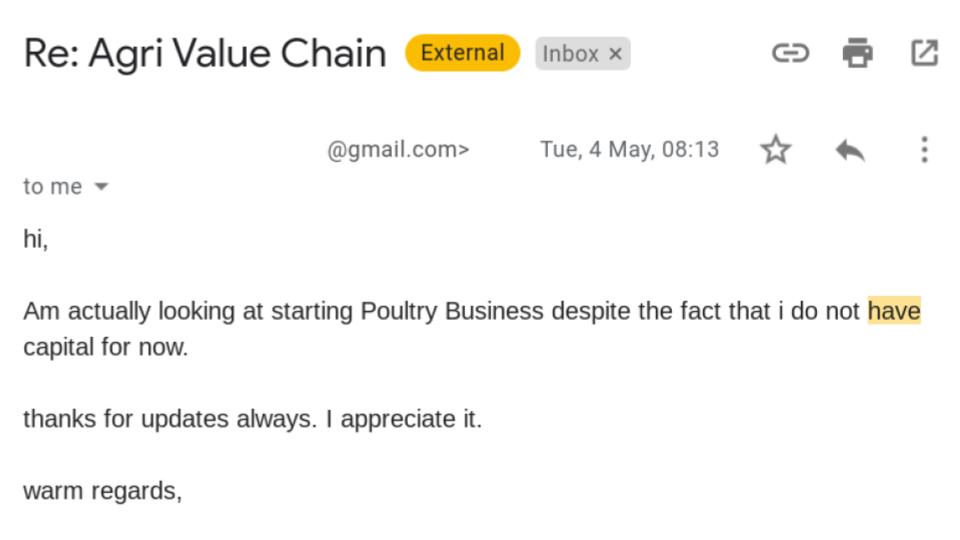
It seems many see a lack of capital as a barrier to entry when it comes to layer or broiler farming.
“But who said anything about needing significant capital to start up a profitable poultry business ?”
One of the BIGGEST attractions to poultry farming surely is the LOW BARRIER to entry , LOW SETUP costs and yet HIGH profitability and cash flow potential.
But as with many theories, I suppose it remains ‘up in the air (talked about)’ until someone makes it tangible…material…possible.
This is the principle that encouraged me to step up to the plate in an attempt to ‘bat out of the park’ all doubt surrounding it…
…and finally, answer the question:
Can you start up a poultry farm with zero capital?
Yes, you can start a poultry farm with no available capital.
Here’s how…
Zero Debt Poultry Farming: the MOST REWARDING way to start, scale and establish a leading egg or chicken business
In my line of work as a consultant (professional problem solver) – the one discipline that keeps my craft alive is RESEARCH.
And as such, I come across all kinds of neat fixes that may not be for the time I find them,
But are bound to come in handy some time.
So, much like a handyman or craftsman, not wanting to let anything go that could be of use,
I end up keeping a stash of these in a ‘kind of’ strategic toolbox.
When enough time passes by whilst researching related topics,
I get enough of a head of steam to begin compiling an eBook.
This is my process.
And using this I wrote ‘ Zero Debt Poultry: Business Startup Plan ‘.
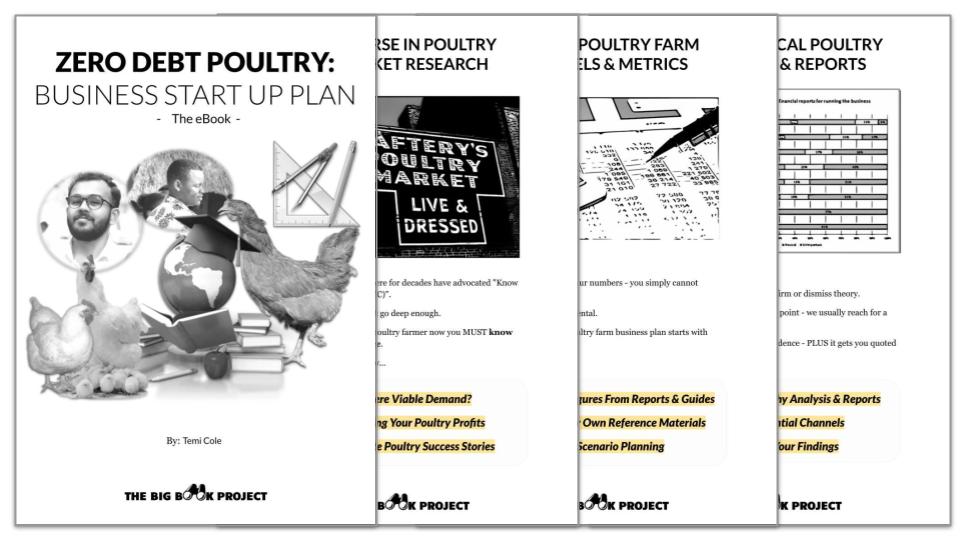
It’s a strategic playbook and secret formula for how (with no borrowings or savings) you:
- turn your poultry startup idea into a market-leading farming enterprise
- BEFORE you yield your 1st egg or carcass .
Want the PDF download?
Become a paid subscriber today and download Zero Debt Poultry Business Startup Plan .
I had to refrain from using the phrase, “Masterclasses”…a bit presumptuous for my liking.
Aren’t we always needing to ‘add on’ – even after many years of experience? Are ever really the finished article?
Whatever your answer to those questions is,
I do think what is indisputable is the benefit of someone else’s EXPERIENCE when you don’t have any…
… experience saves loss …
…loss of:
…and in the case of business startup, the benefit of experience in some critical areas can be the difference between success and failure.
And where so much is riding on you making it work,
Getting the right experience is HIGHLY valued.
Equally, identifying the most advantageous area of learning carries importance.
So, what area of learning would you say has the most impact on farming success?
According to this study , ‘ Farm Business Management Skills a Missing Link For Smallholder Farmers: A Case Of Malingunde, Malawi ‘ (European Journal of Business and Innovation Research 2016): Just one of many studies which declare a link between business management discipline and better economic output . Other quotes from the study bear reference to previous works: “Generally, management is a human responsibility and skill that drives economic activities and development ( Oghojafor et al, 2012 ).” “Smallholder farmers need to be better equipped with business management skills if they are to play a central role in improving agricultural productivity ( Mohit, 2012 ).”
So, there you have it – business management is the most influential skill set you could acquire for succeeding with your poultry startup.
But is there really a shortage of business management material on the internet?
Not according to Google,
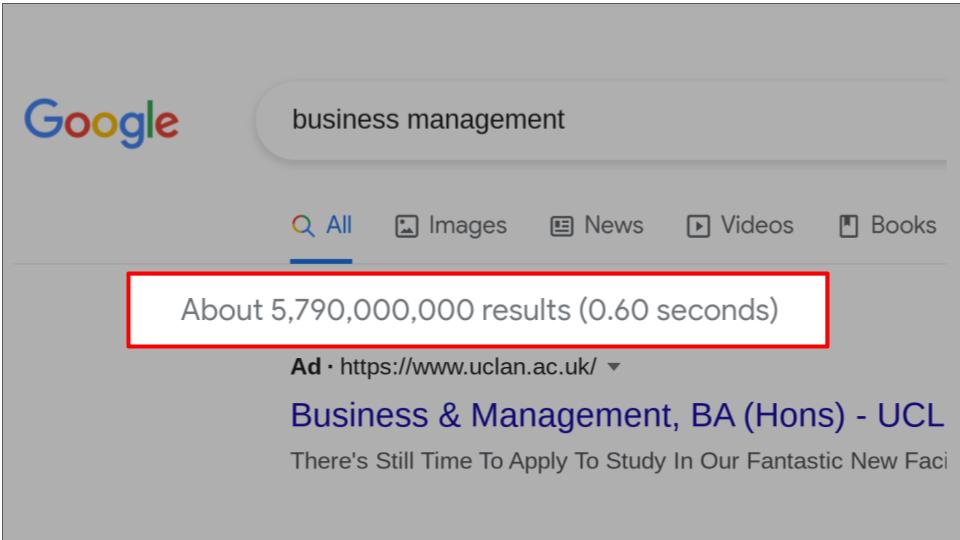
As you can see above, it took Google 0.6 seconds to return almost 6 BILLION results for the search term ‘business management’.
That’s a FLOOD of management content.
But…I ask:
- Is all of it good ? Or at least suitable for a startup poultry farmer?
- Also, where do you begin ?
To save you ENDLESS wandering from page to page online,
I have neatly packaged a power-packed portfolio of business management tutorials tailor-made for EVERY startup farmer…
…called “Grow AgriBusiness Faster Classes”
Grow AgriBusiness Faster Classes: instantly download 15 years of 1st class management expertise ( & speed up your poultry profits )
The purpose of these tutorials is to make common with you some of the most valuable business management lessons learned in my 15 years of management.
They span a corporate and independent consulting career, including:
- global best practice
- financial investments
- small business strategy
But the goal is simple…
…to make hard things simple for you to ‘master’ (…there, I’ve said it now…) to save you any potential material losses of getting it wrong.
These lessons should help you to get it right, 1st time.
The GREAT thing about these tutorials also is that they are all written from 1st hand experiences and lessons learned . Nothing academic – all true to life .
Here’s currently what is included :
Want to access the Grow AgriBusiness Faster Classes?
Become a paid subscriber today and fast forward your management abilities.
Are you currently working on a feasibility plan & business proposal for your future poultry farm?
Then this resource is the ideal pocketbook and project reference guide for equipping you with EVERYTHING you need to draft a winning plan.
It’s called the Poultry Project Hub…
Poultry Project Hub: a jampacked project resource library giving you 100’s of angles on planning optimal profits
This has to be the most plentiful online digital resource for assisting your poultry business proposal writing .
Here’s a quick round-up of its contents:

In short, the Poultry Farming Project Hub contains:
“…over 20,501 words, 200+ rows of data tables, as well as 30+ screenshots/images, sample calculations, case studies and more.”
If you are looking for:
- sample plans
- expert poultry business consultancy
- step-by-step calculations
- definitions and equations for investment metrics
- case studies
- detailed ‘explainer’ articles on hard to understand model concepts
…then this is an unmissable opportunity for you.
Visit the library and its FREE resources now.
Want to download the entire library in PDF instead?
Become a paid subscriber and get the PDFs.
This is very simply – a little bit of light relief if you are finding the whole exercise of business planning a little…frustrating.
There are 15 questions in this quiz.
Each covering a key poultry farming discipline.
It’s multiple choice and nothing too heavy.
Ideally, you might use them to sharpen up your general strategic business awareness.
Try the poultry business quiz.
I made this as a complementary guide to be read alongside sample poultry plans.
To help you better DIRECT the planning process.
To have you asking the right questions and taking the right approaches to assemble your poultry business plan successfully.
Plus, I provide insight into:
- production modelling options and,
- uncover flawed assumptions.
These points above are often sticking points and wrong turns for many when building a plan.
This eBook helps you avoid the loss of time and effort getting tied up in with grey spots.
And here’s how…
Poultry Planning Toolkit eBook: avoid common planning errors by having this on your desk as you work
I’d go as far as saying that you shouldn’t begin writing your poultry farm business plan UNTIL you’ve read this.
It does the job of ironing out all the usual sticking points that trouble and prolong planning.
Issues such as:
- modelling choices
- how best to plan your earnings
- how to measure profitability
- how to do capital planning
…are opened up with ease and made plain.
Here’s the chapter line-up :
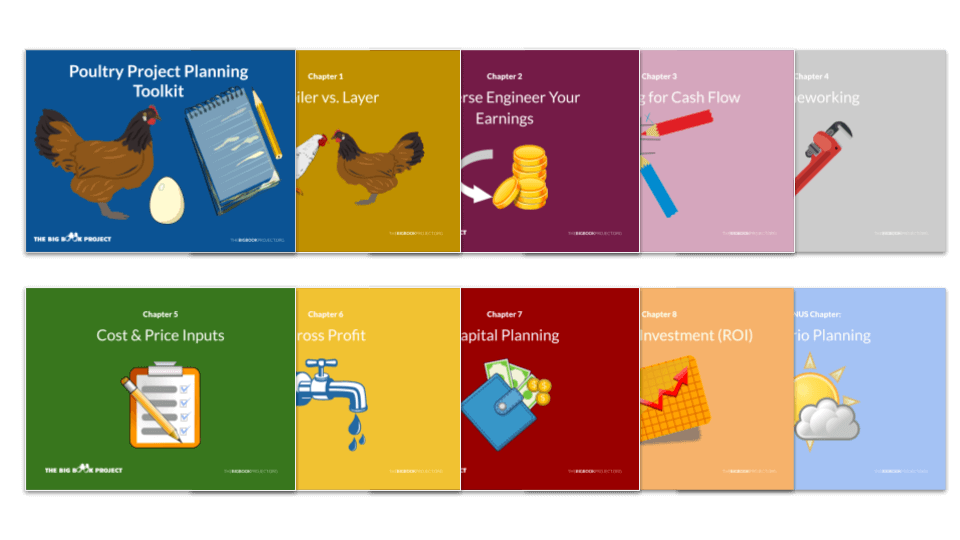
- Broiler vs. Layer
- Reverse Engineer your Earnings
- Modelling for Cash Flow
- Frameworking
- Cost & Price Inputs
- Gross Profits
- Capital Planning
- Return on Investment
- Scenario Planning
I designed it to answer ALL the key strategic planning questions.
I’d say, the real value of this eBook is that it prevents false starts by filling in the common knowledge gaps .
A great time saver.
Take a few minutes to read a chapter for free .
Want to download the entire PDF eBook?
Become a paid subscriber today and get expert direction for writing a successful poultry business plan.
This one is quite simple.
If it’s ever cross your mind to ask,
“Hey Temi, what website software do you use?”
“What service do you use to send out those email messages?”
For example, I use WPMUDEV as my web hosting partner. They are just right for The Big Book Project currently. It’s true that there are many cheaper web hosting services out there, But the operative word here is * SERVICE* . When I fail, they pick up the pieces and always ensure The Big Book Project is constantly online. No downtime, no curveballs, no disasters…you see everything coming LONG before it hits, giving plenty of time to react successfully…PLUS, when trouble hits, they REALLY know how to rescue a WordPress website . Hands down. I have no complaints and many good things to say…if you are looking for an expert WordPress website support team – I couldn’t recommend them highly enough . Learn more about WPMUDEV here. (The link above goes to their website and of course costs you nothing. If you decide to hire them, I get a small payment back. The money side has no influence though. I personally use them and happily recommend their service.)
My other tools of the trade including:
- graphic design tool
- online payment gateway
- document management tools
- email marketing platform
- accounting program (inc. invoicing, quotations etc).
…are all neatly listed in the crib sheet.
It’s exhaustive. And comes with 10 years of self-employment and business ownership experience.
Lots of valuable, ‘hard-to-find’ gems to give you plenty of advantage.
(*Plus there are some GREAT time and budget savers in here to help you save the pennies, without compromising on quality.)
Want to download my Digital Tools of The Trade crib sheet?
Become a paid subscriber today and get a headstart on digital business services.
Whilst I don’t write business plans, I do review them from time to time.
From your point of view, it might be a useful pointer in the right direction.
Just the thing you need to get you out of a rut and to finally complete your plan.
A bit like this:
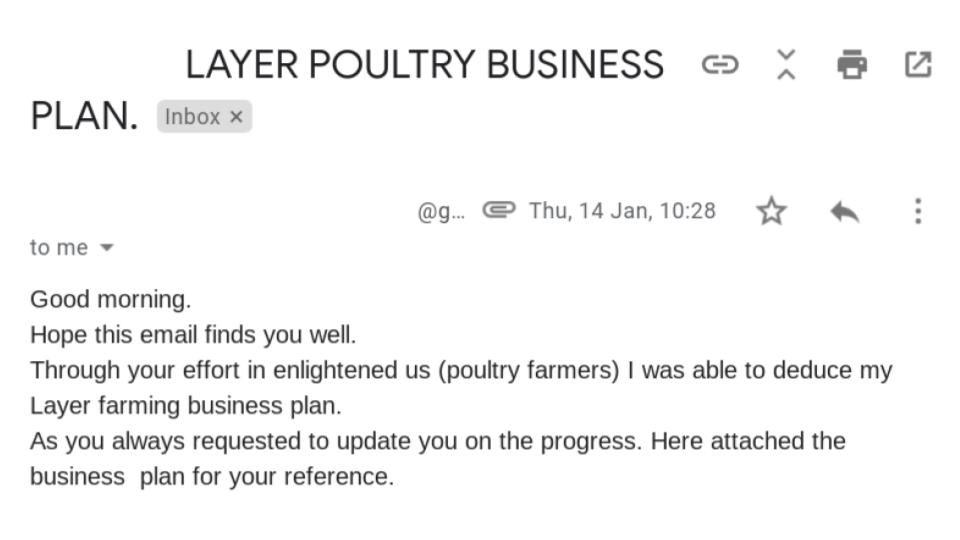
…always good to see REAL LIFE RESULTS gained by readers of The Big Book Project who put the advice into action .
Want me to take a look at your poultry farm business plan?
Become a paid subscriber today and book your business plan review.
Now over to you…
Are you currently writing a business plan for your poultry farm?
Have you already drafted your plan?
Either way, I’d be interested to hear from you.
Leave a comment below.
Reader Interactions
Write your poultry project proposal in just 90 mins.
February 22, 2024 at 1:44 pm
My first time to visit this web site. I am impressed and subscribed soon. Hope I will be benefited from the package. Inspired by quick response of the system and tells how efficient and profitable the poultry business too. I will keep myself long in the transaction. Regards, Assefa T.
Leave a Reply Cancel reply
Your email address will not be published. Required fields are marked *
Join 15,000 Subscribers…
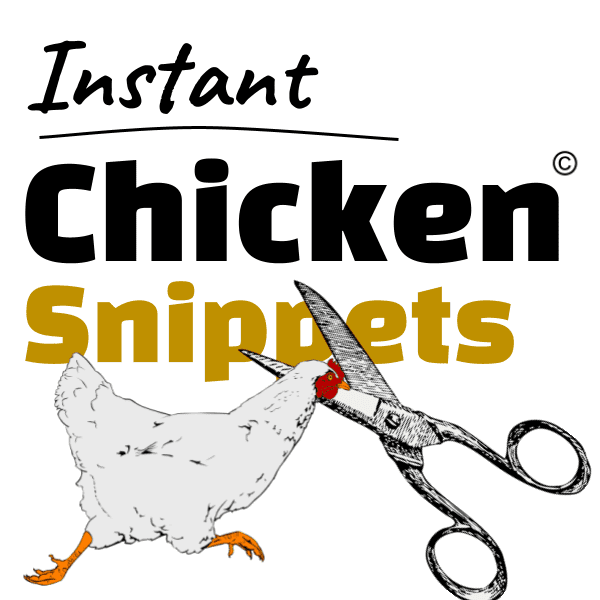
Get The #1 Poultry Farming Newsletter
The most in-depth guide to poultry farming anywhere , right now.
– Kwasi Jones
Receive all the ‘insider tips’ they never speak about to help you:
- ✔️ Write a plan that actually gets investment
- ✔️ Decide if poultry will be profitable for you
- ✔️ Avoid pitfalls like mortality with key procedures
- ✔️ Understand the hidden benefits of production models
Type in your email below…

Start an Egg Farm: Detailed Start-up Guide
Main Sections In This Post Steps To Starting An Egg Farm Points to Consider Knowledge Is Power Featured Video
Starting Your Egg Farm: A Step-by-Step Overview
Delve into egg farming with our guide. Get templates, examples, and access to current info through “Knowledge Is Power” section.
Resourceful Insights
Use these resources from startup tand when your farm is up and running. Bookmark for future reference!
Let’s get started with the steps.
Steps to Starting an Egg Farm
Below are the steps to starting a egg farm.
Each step is linked to a specific section, allowing you to jump to your desired section or scroll to follow the steps in order.
- An Overview of What You’re Getting Into
- Egg Farm Overview
- Researching Your Egg Farm
- Looking at Financials
- Choosing A Business Location
- Creating Your Mission Statement
- Creating A Unique Selling Proposition (USP)
- Choose an Egg Farm Name
- Register Your Company
- Create Your Corporate Identity
- Writing a Business Plan
- Banking Considerations
- Getting the Funds for Your Operation
- Software Setup
- Business Insurance Considerations
- Supplier and Service Provider Considerations
- Physical Setup
- Creating a Website
- Create an External Support Team
- Hiring Employees
1. An Overview of What You’re Getting Into
Is Starting an Egg Farm Your Next Move?
Your Role in the Egg Farming Equation
When it comes to triumphing in the world of business, there’s one pivotal element that takes center stage: you!
Gauging Your Sentiments
Gauging your sentiments about initiating and managing an egg farm holds significant weight.
The Power of Passion
Passion emerges as a fundamental ingredient for prosperity in your entrepreneurial journey.
Propelling Forward with Passion
It serves as the potent impetus propelling you forward.
Navigating Challenges
Amidst the inevitable challenges that surface in your business, a fiery passion drives you to seek resolutions. Conversely, lacking it might steer you towards seeking an escape.
The Burning Passion for Your Egg Farm
So, where does your passion level stand when it concerns the prospect of owning an egg farm?
A Captivating Perspective
Let’s delve into a captivating perspective:
The Five Unbounded Wishes
Picture a scenario where you’re granted five unbounded wishes, capable of materializing any desire!
Addressing a Pivotal Query
Now, let’s address a pivotal query.
Investing in Your Egg Farm
Would you choose to invest one of these precious wishes to kickstart an egg farm in this very scenario?
A Compelling Indicator
Should your response be affirmative, it’s a compelling indicator of your fervent commitment towards nurturing and overseeing an egg farm, setting you on the right trajectory.
Exploring Alternatives
Yet, if your response tends towards the negative, it beckons further introspection:
Finding Your True Calling
What alternative path would you opt for? Perhaps, your true calling lies in that direction.
In a nutshell, channeling unwavering passion into the business you’re initiating emerges as a vital factor elevating your odds of triumph.
Without this vital force, you might find yourself grappling uphill.
For More, See How Passion Affects Your Business . Also, see, Considerations Before You Start Your Business to identify key points for a new business owner.
2. Gaining an Overview of Owning an Egg Farm
Next, let’s spend some time on key issues to give you an overview of what to expect from owning and running your business.
a.) A Quick Overview of Owning an Egg Farm
Understanding an Egg Farm
An egg farm is a specialized agricultural establishment focused on the production of eggs. It involves the controlled rearing of hens, primarily for the purpose of egg collection.
These farms can vary in size, from small family-run operations to large commercial enterprises.
Day-to-Day Egg Farm Operations
Running and managing an egg farm entails a range of daily tasks. Farmers begin by overseeing the health and well-being of the hens, ensuring proper nutrition, clean living conditions, and regular health checks.
Collecting eggs is a routine activity, requiring careful handling to avoid breakage. Sorting, grading, and packaging the eggs for distribution is a crucial step.
c.) Pros and Cons of Owning an Egg Farm
Empowerment as Your Boss
As an egg farm owner, you’re the captain of your ship. You decide the course and steer your business to success.
Unleash Your Creativity
Running the show means exploring innovative approaches to egg farming.
Potential for High Returns
A thriving egg farm promises substantial revenue, reflecting your dedication.
Control Over Environment
Craft a workplace that suits your values and work style.
Solely Solving Problems

Issues fall on your shoulders, demanding proactive solutions.
Income Inconstancy
Steady income might be elusive initially.
Tackling Startup Hurdles
Commencing an egg farm involves initial struggles.
Customer Acquisition Struggles
Attracting and retaining customers can be demanding.
Long Hours Ahead
Expect extended work hours during demanding phases.
Pressure to Prosper
As owner, success pressure rests on your shoulders.
Significant Startup Investment
Egg farm initiation requires substantial financial commitment.
Adapting to Change
Business landscapes evolve, necessitating constant adaptation.
Inherent Risks
Running an egg farm involves inherent uncertainties.
For more, see Pros and Cons of Starting a Small Business.
d.) Questions You Need to Consider for Your Egg Farm
Egg Farm Readiness: Essential Questions
Anticipating Egg Farm Challenges
Set the stage for your egg farm journey by addressing these questions. Foresee potential obstacles.
Key Considerations
- Model of Operation : Determine your preferred egg farm model.
- Work Dynamics : Decide between personal involvement or employee recruitment.
- Management Approach : Opt for hands-on management or hiring a manager.
- Customer Acquisition : Plan how to attract customers.
- Sustaining Customers : Strategize to maintain a loyal customer base.
- Partnerships or Investors : Contemplate potential partnerships.
- Physical vs. Online : Choose between a physical or online presence.
- Growth Strategy : Ponder over growth prospects and long-term goals.
Nurturing an egg farm involves tackling these pivotal questions, setting the course for success while minimizing challenges.
3. Research
Egg farm research.
Informed Steps for Your Egg Farm Journey
Laying the Foundation
Before embarking on your egg farm venture, diligent research is your compass. Quality information unveils the path ahead, preventing unexpected surprises.
Glean Wisdom from the Experienced
Gleaning insights from seasoned egg farm proprietors is invaluable. Their expertise offers dependable guidance for your journey.
Treasures in Conversation
Invest time conversing with these experts. Their reservoir of knowledge, amassed over years, is an invaluable asset.
Unlocking Insights
An article I’ve crafted guides you on identifying and approaching these experienced individuals.
It delves deeper than this post. To fully grasp the road ahead, I encourage you to peruse the article linked below.
Equipped with wisdom from those who’ve walked the egg farming path, you’ll navigate challenges more confidently.
See An Inside Look Into the Business You Want To Start for all the details.

Target Audience
Nurturing Your Egg Farm’s Audience Connection
Cognizance of Your Audience
Gaining insights into your egg farm’s potential customers is a strategic advantage. Understanding your target market unlocks the power to tailor offerings that captivate their attention.
Personalized Offerings
With a grasp on your target market’s preferences, you can shape products and services that resonate with prospective customers.
Mapping Your Audience
Consider these target market ideas for an egg farm:
- Families Seeking Fresh, Nutrient-Rich Eggs
- Health-Conscious Individuals Valuing Organic Choices
- Local Bakeries and Restaurants Demanding Quality Supplies
- Farmers’ Market Enthusiasts Supporting Local Producers
- Culinary Enthusiasts Valuing Ethical Animal Farming
- Eco-Conscious Consumers Prioritizing Sustainable Practices
- Grocery Chains Prioritizing Local and Fresh Produce
- Distributors in the Food Supply Chain
In a Nutshell
Elevate your egg farm’s success by engaging your audience intimately.
Knowing their desires and preferences empowers you to cultivate tailored offerings that flourish in the market.
For more, see How To Understand Your Target Market.
4. Looking at Financials:
Financial Insights for Your Egg Farm Venture
Startup Investment
Kickstarting your egg farm requires precise estimation of startup expenses. A seamless journey from planning to launch hinges on accurate cost assessments.
Balancing the Budget
Underestimating may lead to financial shortfalls, delaying your farm’s opening. Conversely, an overestimated budget can deter potential investors.
Variable Factors
Startup costs hinge on operation size, location, employee recruitment, equipment acquisition (new/used), and leasing decisions.
Calculating the Estimate
Compile a comprehensive list of necessities and research corresponding prices. As you delve deeper, additional factors will emerge to refine your estimation.
For more detailed information, refer to my article on Estimating Startup Costs.
Sales and Profit Dynamics
Your sales and profitability center around:
- Product and Service Appeal
- Demand for Offerings
- Strategic Marketing
Navigating Profit Waters
Profitability extends beyond sales income. It encompasses rent, payroll, and overhead expenses.
Sustainable Success
Sustained success entails generating sales that cover monthly costs, ensuring both operational stability and personal income.
In the landscape of egg farming, financial foresight is key, from startup cost precision to cultivating a thriving sales and profit ecosystem.
For More, See Estimating Profitability and Revenue.
Simple Sample: Financial Lists to Consider As a Starting Point
Note: Focus on the issues more than the numbers. The numbers are samples. Your estimates will differ due to how you set up your business, location, expenses, and revenues.
SAMPLE Estimated Costs to Start a New Egg Farm in the USA:
- Land Purchase : $100,000 – $300,000
- Barn and Coop Construction : $30,000 – $70,000
- Purchase of Chickens : $5,000 – $20,000
- Feeding Equipment : $3,000 – $8,000
- Fencing and Security : $2,000 – $10,000
- Legal and Licensing Fees : $1,000 – $5,000
- Insurance : $2,000 – $6,000
TOTAL : $143,000 – $419,000
SAMPLE Estimated Monthly Expenses for an Egg Farm in the USA:
- Feed and Nutrition : $1,000 – $2,500
- Utilities (Electricity, Water) : $300 – $700
- Loan Payments : $2,000 – $4,000
- Labor : $3,000 – $6,000
- Maintenance : $500 – $1,200
- Insurance : $150 – $400
TOTAL MONTHLY EXPENSES : $6,950 – $14,800
SAMPLE Profit Per Sale:
- Egg Carton (12 eggs) : $1.50 – $2.50 profit
- Bulk Eggs (100 eggs) : $12 – $20 profit
- Organic Eggs (12 eggs) : $2 – $3.50 profit
Your overall profit will depend on the monthly sales you can generate and your actual profit per sale.
These are samples so you can understand the issues to consider when planning to start your egg farm. So focus on the list and not the numbers.
Adjusting costs makes a significant difference in whether the business will be successful.
A slight shift in profit per sale on high-volume sales will make a difference in your overall profits.
Also, note many new businesses take time to become profitable because it takes building a customer base, building a reputation, and fine-tuning operations.
Your figures will be different. Every situation is different, and many factors come into play.
Research and consider getting professional advice when calculating your business’s startup costs, expenses, and potential revenues and profits.
5. Choosing The Right Business Location
Strategic Location: Key to Your Egg Farm’s Triumph
Locational Influence on Success
For your egg farm venture, the choice of location plays a pivotal role. The fate of your local brick-and-mortar business hangs on this decision.
The Demand Factor
Thriving hinges on operating where demand for your offerings exists. Launching without demand spells disaster.
Competition Dynamics
Overcrowded competitive arenas hinder market share acquisition, posing challenges.
The Optimal Balance
Selecting a location involves finding equilibrium: ample demand without excessive competition.
Affordability Considerations
Balance exposure and expenses. A bustling area increases visibility, but costs must align with profits.
Strategic Affordability
While budget-friendly locations beckon, customer base adequacy is pivotal for sustained revenue.
The Culmination of Strategy
In essence, location choice is your business’s foundation. Research, analysis, and informed decisions fuel your success journey.
Navigating the egg farming realm mandates strategic location selection. Your farm’s trajectory hinges on this fundamental choice.
For more about business locations, see Choosing The Best Location for Your Business.
6. Create Your Mission Statement
Crafting Clarity: The Power of a Mission Statement
A Guiding Light
A mission statement is a compass for your egg farm’s purpose. It ensures alignment and reinforces the primary value you offer to customers and the community.
Staying on Course
It serves as a constant reminder of your business’s core focus and aids in maintaining a clear trajectory.
Pivotal Benefit
The mission statement unveils your main contribution to customers and the local community, reinforcing your commitment.
Examples of Egg Farm Mission Statements
- “Nurturing Health Through Fresh Eggs: Enriching Lives, One Nest at a Time”
- “Sustainable Agriculture, Wholesome Nourishment: Fostering Community Well-being”
- “Elevating Culinary Delights: Farm-to-Table Excellence for All”
A well-crafted mission statement encapsulates your egg farm’s essence, driving purpose and direction.
For more, see, How To Create a Mission Statement.
7. Creating A Unique Selling Proposition (USP)
Distinctive Excellence: Harnessing Your Unique Selling Proposition
Defining Uniqueness
A Unique Selling Proposition (USP) is a potent tool for distinguishing your egg farm. It aids in crafting a standout element that sets your business apart.
Crafting Uniqueness
USP empowers you to create a distinctive feature that captures attention and leaves a lasting impression.
Elevating Your Egg Farm
USP examples for an egg farm:
- “ Beyond Freshness : Daily Harvested Eggs, Delivered Within Hours”
- “ Local Farm, Local Goodness : Supporting Community, One Egg at a Time”
- “ Eco-Friendly Choice : Ethical Hen Rearing, Sustainable Nourishment”
A well-defined USP elevates your egg farm’s appeal, forging a memorable identity in a competitive landscape.
8. Choose a Business Name
Selecting Your Egg Farm’s Identity: The Name Game
A Catchy and Apt Moniker

Choosing an egg farm name calls for a blend of appeal and relevance. It should resonate, roll off the tongue, and linger in memory.
A Permanent Emblem
The name you choose becomes a lasting brand identity. It’s a choice you’ll carry throughout your farm’s journey.
A Seamless Online Presence
A matching domain name ensures consistency in your online footprint. Harmonize your virtual and physical presence.
Originality Check
Before finalizing, ensure your desired name isn’t claimed by another entity.
30 Egg Farm Name Ideas to Inspire Your Vision
- FarmFreshNest
- GoldenEggHarbor
- CluckAndHarvest
- NestDelights
- FeatheredHarvest
- LocalEggSerenity
- SunriseLayFarms
- WholesomeHenHaven
- PrairieNestEggs
- LivelyCoopNurtures
- SustainableShellNest
- CradleOfEggs
- FluffyFeatherFarms
- PurityLayHaven
- HomesteadEggGems
- RoamFreeRanches
- SereneShellLands
- HumbleEggSanctuary
- KindredNestHarvest
- HarvestBountyNook
- HatchedAbundance
- EthicalHenMeadow
- NaturalLayOasis
- JoyfulCoopHarbor
- CrestedNestFields
- BountifulHenRetreat
- NestlingNourishHaven
- FarmsteadEggHaven
- NobleFeatherRetreat
- GracefulNestSanctuary
Unveil your egg farm’s essence through a name that resonates. Let these ideas kindle your creativity for a distinctive, original business name.
For more, see the following articles:
- How To Register a Business Name
- Registering a Domain Name For Your Business
9. Register Your Company
Legal Foundations: Paving the Path for Your Egg Farm
Ensuring Legal Compliance
Building your egg farm on legal grounds is paramount. Compliance guarantees a smooth journey.
Professional Consultation
Engaging a professional ensures optimal tax advantages and safeguards against liabilities.
Common Egg Farm Registrations
- Sole Proprietorship : Individual ownership simplicity.
- Limited Liability Company (LLC) : Blends personal liability protection and flexibility.
- Partnership : Shared ownership among partners.
- Corporation : Separate legal entity, shielding personal assets.
Permits and Licenses
- Business License : Required for operating.
- Food Handling Permit : Vital for egg production and sales.
- Zoning Compliance : Ensuring farm location suits regulations.
- Environmental Permits : For waste management and sustainability.
- Health Department Approval : Ensuring egg safety and hygiene.
- Sales Tax Permit : Necessary for retail sales.
In Conclusion
Prioritize legal compliance for your egg farm’s success. Expert counsel and the right registrations, permits, and licenses secure your journey.
Registration:
- How to Register Your Business
- How To Register a DBA
- How to Register a Trademark
- How to Get a Business License
Business Structures:
- How to Choose a Business Structure
- Pros & Cons of a Sole Proprietorship
- How To Form an LLC
- How To Register a Business Partnership
- How To Form a Corporation
- How To Choose a Business Registration Service
10. Create Your Corporate Identity
Crafting Your Egg Farm’s Visual Image
A Visual Representation
Develop a distinct visual representation for your egg farm.
Components of Visual Identity
Include logo, business cards, website, signage, stationery, and promotional items.
Consistency for Impact
Uniformity in design across these elements leaves a professional and lasting impact on customers.
Impressing All
A cohesive visual identity enhances your egg farm’s appeal, resonating with both potential and loyal patrons.
You can see our page for an overview of your logo , business cards , website , and business sign , or see A Complete Introduction to Corporate Identity Packages.
11. Writing a Business Plan
Strategizing with an Egg Farm Business Plan
Crucial Blueprint
An egg farm business plan is a vital roadmap. It secures funding, attracts investors, and guides your journey from startup to operation.
Strategic Direction
Crafting a comprehensive business plan is an investment in envisioning your egg farm’s future.
Meticulous Deliberation
Detailing every facet takes time and consideration, as your plan encapsulates your operational vision.
Vision into Reality
Completion rewards you with a clear roadmap for starting and running your egg farm.
Tailored Approach
Options abound: build from scratch, engage a professional, utilize templates, or employ business plan software.
Active Involvement
Regardless of your choice, active participation is key, ensuring your plan reflects your unique farm and management approach.
Dynamic Adaptation
Expect your plan to evolve as experience grows. Regular reviews and adjustments optimize your egg farm’s trajectory.
Business Plan Template for an Egg Farm
Business plan for [egg farm name], executive summary.
- Introduction : Briefly introduce the business idea, location, and owners.
- Mission Statement : Define your farm’s main purpose and goals.
- Summary of Initial Costs : Provide an overview of the start-up costs.
- Objectives : Outline short-term and long-term business goals.
Business Description
- Industry Background : Describe the egg farming industry and current market trends.
- Business Model : Explain your farming methods, target market, and unique selling points.
- Location : Explain the chosen location and its advantages.
- Legal Structure : Detail the legal structure of the business (e.g., Sole Proprietorship, LLC).
Market Analysis
- Target Market : Identify and describe your target customers.
- Competitors : Analyze key competitors and your competitive advantage.
- Market Needs : Identify gaps or needs in the market that your egg farm will fill.
Organization & Management
- Organizational Structure : Detail the roles and responsibilities of key team members.
- Advisory Board : If applicable, introduce any advisors or consultants.
Sales & Marketing Plan
- Marketing Strategies : Define strategies for promotion, pricing, sales, and distribution.
- Sales Forecasts : Provide an estimate of sales over the next 3-5 years.
Farming Plan
- Production Methods : Detail the types of chickens, feeding methods, and care processes.
- Technology : Outline the tools and equipment needed for operations.
- Sustainability Practices : Explain any environmental considerations or practices.
Financial Plan
- Start-up Costs : Provide a detailed list of costs required to start the farm.
- Funding Requirements : If seeking investment, explain the amount needed and how it will be used.
- Profit and Loss Projections : Provide projections for revenue, expenses, and net profit for the next 3-5 years.
- Cash Flow Forecasts : Include monthly cash flow statements for the first year.
- Break-even Analysis : Detail when the business is expected to become profitable.
Appendices and Supporting Documents
- Licenses and Permits : Include copies or list any necessary licenses or permits.
- Resumes : Attach resumes of key management team members.
- Other Documents : Include any other documents that support your business plan (e.g., market research, architectural plans).
This template should provide a solid framework for your egg farm’s business plan.
Remember to be thorough, realistic, and specific in each section, and consider seeking professional guidance to ensure that your plan is robust and well-crafted.
For information on creating your business plan, see, How to Write a Business Plan.
12. Banking Considerations
Financial Foundations: Banking and Transactions for Your Egg Farm
Strategic Banking Choice
Opt for a local bank with a strong small business focus for your egg farm.
Distinct Business Account
Separate your egg farm’s expenses from personal outlays. Especially vital for sole proprietorships, it streamlines bookkeeping, aids expense tracking, and furnishes proof during tax audits.
Building Bank Relations
Forge a professional bond with your banker. Their expertise and financial services streamline processes and provide valuable advice.
Seamless Transactions
Employ a merchant account or online service for credit and debit card transactions. Elevate sales and customer convenience.
Nurturing financial aspects with the right bank, separate account, and streamlined transactions is pivotal. These choices lay the groundwork for your egg farm’s financial success.
For more, see, How to Open a Business Bank Account. You may also want to look at, What Is a Merchant Account and How to Get One.
13. Getting the Funds for Your Operation
Securing Funds for Your Egg Farm: A Loan Guide
Commence Strategically
For aspiring egg farm owners seeking financing, these tips are invaluable.
Varied Funding Routes
Diverse options exist: traditional lenders, private loans, investors, asset sales, and collateral utilization.
Key Loan Meeting Considerations
- Research : Thoroughly understand your funding needs and potential lenders.
- Preparation : Compile financial projections, business plan, and loan purpose justification.
- Questions : Address lender queries confidently, illustrating your grasp of your egg farm’s needs.
Essential Loan Application Documents
- Business Plan : Comprehensive roadmap outlining your egg farm’s journey.
- Financial Projections : Detailed estimates of revenue, expenses, and profitability.
- Credit History : Personal and business credit histories.
- Personal and Business Tax Returns : Financial history documentation.
- Legal Documentation : Business licenses, permits, and registration records.
Laying the groundwork for securing a loan to kickstart your egg farm is paramount. Diligence, preparation, and documentation strengthen your pursuit of funding.
See, Getting a Small Business Loan for more.
14. Software Setup
Navigating Software for Your Egg Farm’s Efficiency
Software Scrutiny
Selecting suitable software is a strategic decision, impacting your egg farm’s operations.
Pioneering Over Shifting
Opt for an initial program that aligns with your needs. Transitioning later can be complex and data-sensitive.
Dependability Matters
Opt for established software providers. A proven track record assures future support.
Research and Evaluation
- Thorough Exploration : Delve into software offerings.
- Demo Assessment : Explore demos if available.
- Community Insights : Review reviews and forums to glean others’ experiences.
Financial Facilitation
Research software aiding expense tracking and tax preparation. Consult with professionals like bookkeepers or accountants for tailored guidance.
Elevate your egg farm’s efficacy through strategic software choices. Thorough research and evaluation ensure optimal operational alignment.
Software Considerations for an Egg Farm.
Check out Google’s latest search results for software packages for a egg farm.
15. Get The Right Business Insurance
Safeguarding Your Egg Farm: Vital Insurance Considerations
Preparedness is Paramount
Be equipped with suitable insurance coverage before your egg farm activities commence.
Comprehensive Protection
Shield various aspects including customers, employees, premises occupants, property, and yourself.
Professional Liability Safeguard
Invest in professional liability insurance to safeguard against potential lawsuits.
Interruption Insurance: A Crucial Lifeline
Plan for contingencies with Interruption Insurance. It provides a safety net in case unforeseen incidents lead to a temporary shutdown.
Invaluable Expertise
Leverage the expertise of a proficient insurance broker. They guide you to ensure comprehensive and adequate coverage.
Prioritizing insurance coverage equips your egg farm with resilience.
A comprehensive approach, including professional liability and interruption insurance, strengthens your readiness for the unexpected.
For more, see What to Know About Business Insurance . You can also browse the latest Google search results for egg farm insurance .
16. Suppliers and Service Providers
Supply Chain Partners: Pivotal for Your Egg Farm
Supplier Selection
List of items and services that an egg farm might acquire from suppliers.
Integral Bonds
Establishing robust ties with suppliers and service providers is imperative for your egg farm’s prosperity.
A dependable supplier is pivotal for success. They offer competitive rates, enabling cost savings and profit expansion.
Uninterrupted Operations
Reliable suppliers guarantee constant stock availability, promoting seamless business functioning.
Reciprocal Respect
Foster a mutually beneficial rapport with suppliers. A respectful and financially advantageous alliance enhances collaboration.
Forge dependable relationships with suppliers and service providers.
Their role in cost efficiency, stock availability, and collaborative growth is instrumental for your egg farm’s success.
For More See, How To Choose a Supplier.
17. Physical Setup
Egg Farm Setup and Professional Presentation
Physical Configuration
Describe the egg farm’s physical setup neutrally, encompassing various areas and structures.
Signage Essentials
Discuss setting up signage for effective guidance.
Strategic Placement
Install signs not only for the main entrance but also across key locations like parking lots, exits, and specific zones.
These signs direct visitors and enhance your farm’s professionalism.
Organized Office Hub
Offer a neutral overview of your office arrangement.
Central Management Hub
Highlight the significance of an organized office for managing your egg farm efficiently.
Productive Environment
Emphasize equipping your office with necessary resources to optimize productivity.
Creating a functional egg farm setup, implementing clear signage, and maintaining an organized office fortify your farm’s operational efficiency and professional image.
See, Here are Considerations for The Setup of Your Office, for tips and ideas to make your office work for you. Also, have a look at our article About Company Signs.
18. Creating a Website
Essential Digital Presence: Your Egg Farm’s Website
Central Communication Hub
A website is indispensable for egg farm owners, serving as the primary point of interaction with clients and a source of information.
Owned Authority
Unlike social media accounts, a website offers ownership and control when you host it and secure a domain name.
Strategic Marketing Outlet
Leverage your website as a powerful marketing tool.
Position of Authority
Use blogging to establish industry expertise, offering tailored insights and valuable tips to build customer trust and drive sales.
Craft a vital digital footprint with an egg farm website.
It’s your platform for communication, authority, and strategic marketing to enhance client relationships and business growth.
For more, see How to Build a Website for Your Business .
19. Create an External Support Team
Building a Dependable Support Network for Your Egg Farm
External Expertise Ensemble
Form an external team of professionals, serving as your advisory and service backbone. Note that these experts aren’t your employees.
Strategic Engagement
Leverage their services for projects, tasks, contracts, hourly consultations, or retainers.
Progressive Involvement
While you might already collaborate with some individuals, acknowledging them as your team deepens your appreciation for their contributions and opens the door for additional members.
Gradual Development
You don’t need to assemble this team before launching. Building professional relationships takes time, but it’s a continuous effort.
Robust Collaboration
A strong team becomes a resource when needed. Consider including an accountant, lawyer, financial advisor, marketing specialist, technical advisors, and consultants.
Fostering a network of trusted professionals cultivates a dependable support system for your egg farm, enhancing your decision-making and operational excellence.
For more, see, Building a Team of Professional Advisors for Your Business.
20. Hiring Employees
Progressive Workforce Development for Your Egg Farm
Initial Solo Approach
Consider handling tasks independently in the initial stages to control costs, particularly during startup when payroll is significant.
Growing Demands
As your egg farm flourishes, individual management might become unsustainable. Hiring personnel becomes essential for efficient operations.
Strategic Recruitment
Prioritize recruiting skilled and ethical individuals for each role. A well-suited team enhances productivity and overall performance.
Essential Roles for Your Egg Farm’s Operation
- Farm Manager : Oversee daily operations, flock management, and business strategy.
- Production Supervisor : Ensure optimal egg production, quality, and inventory management.
- Sales and Marketing Specialist : Strategize and execute marketing campaigns to boost sales.
- Veterinarian : Maintain flock health and welfare.
- Accountant : Manage financial aspects and record-keeping.
- Logistics Coordinator : Organize transportation and distribution.
- Administrative Assistant : Support office operations and customer interactions.
Evolving your workforce in line with your egg farm’s growth ensures effective management, enhanced productivity, and streamlined operations.
For more, see, How and When to Hire a New Employee.
Points To Consider
Hours of operation:.
Operating Hours for Your Egg Farm
Balancing Timeframes
Consider these operating hours for your egg farm:
- Morning Hours : Opening early to cater to morning clientele.
- Afternoon Hours : Extend into the afternoon for after-school and working hours.
- Weekend Coverage : Include weekends to accommodate weekend shoppers.
- Special Event Hours : Adjust timings for special events, holidays, or peak seasons.
Strategically planned operating hours cater to varying customer schedules, enhancing accessibility and accommodating diverse needs.
A List of Equipment and Supplies to Consider for an Egg Farm:
Housing and Enclosures
- Layer cages or nesting boxes
- Brooder equipment for chicks
- Roosting bars
- Fencing and gates
Feeding Equipment
- Automatic feeding system
- Feed storage bins
Egg Handling and Processing
- Egg trays and cartons
- Egg washing machine
- Egg grading machine
- Egg candling light
Health and Sanitation
- Disinfectant sprayers
- Pest control equipment
- Vaccination equipment
- Footbaths and biosecurity tools
Climate Control
- Ventilation fans
- Humidity and temperature monitors
Manure Management
- Manure scrapers or belts
- Composting equipment
- Waste disposal tools
Maintenance and Repair Tools
- Basic hand tools (hammers, wrenches, pliers, etc.)
- Power tools
- Tractor and attachments (if needed for larger farms)
Monitoring and Record Keeping
- Scales for weighing feed and birds
- Cameras for security and monitoring
- Record-keeping software or physical logbooks
Miscellaneous
- Incubators (if hatching your eggs)
- Transport crates for moving birds
- Emergency generators
- First aid kits for animals and humans
Optional or Specialized Equipment
- Organic or free-range specific equipment
- Mobile chicken coops for pasture-raised systems
- Egg packaging and labeling machines for retail sales
I hope this format meets your preferences! If you have any other requests, please let me know.
Key Points To Succeeding in an Egg Farm
Navigating Success in Running Your Egg Farm
Foundations for Success
Build a customer base even in the challenging startup phase. Forge connections with customers, suppliers, and staff.
Meeting Customer Demands
Offer sought-after products and services, and embrace customer feedback for improvements.
Service Excellence
Prioritize top-tier customer service, as your clientele is the cornerstone of your business.
Delivering Value
Consistently provide value to customers, enhancing loyalty and brand reputation.
Team Dynamics
Recruit suitable personnel for optimal performance and manage them effectively. Respect and teamwork foster a positive work environment.
Financial Acumen
Master cash flow management, minimizing costs while maintaining quality and service.
Adaptation and Innovation
Embrace change in industry, processes, and technology, adapting for sustained relevance.
Handling Fluctuations
Navigate revenue fluctuations and tackle new competition with strategic agility.
Strategic Outreach
Effective marketing, whether self-led or professional, elevates your egg farm’s visibility and reputation.
Thriving in egg farm management demands customer focus, team collaboration, financial acumen, adaptability, and strategic marketing for enduring success.
Making Your Egg Farm stand out
Elevating Your Egg Farm’s Distinction
In today’s competitive market, setting your egg farm apart is vital. Consider these strategies to make your egg farm stand out:
Quality Assurance
Ensure the highest quality eggs, showcasing your commitment to excellence.
Local Sourcing
Emphasize locally sourced feed, contributing to community support and freshness.
Eco-Friendly Practices
Highlight sustainable and eco-conscious farming methods, appealing to environmentally conscious consumers.
Educational Tours
Offer guided tours, educating visitors about egg production and farm life.
Interactive Workshops
Host workshops on egg-related recipes, cooking tips, and nutrition, engaging customers.
Unique Egg Varieties
Feature specialty eggs, such as organic, free-range, or colored eggs, catering to diverse preferences.
Pet-Friendly Outreach
Promote pet owners’ needs, offering animal-safe eggs for a unique niche.
Add on Ideas for an Egg Farm
Incorporate these add-on concepts to enrich your egg farm’s offerings:
Farm-to-Table Cafe
Establish an on-site cafe showcasing farm-fresh eggs in delicious dishes.
Educational Classes
Organize workshops on farming, egg production, and sustainable practices for enthusiasts.
Homemade Products
Create and sell egg-based products like soaps, lotions, and candles for a diversified product range.
Subscription Services
Offer subscription boxes for regular egg delivery, ensuring customer loyalty.
Farm Events
Host seasonal events like egg hunts, farm festivals, and family-friendly activities.
Community Outreach
Collaborate with local schools for educational programs, fostering community engagement.
Collaborative Ventures
Partner with local businesses for joint promotions and cross-marketing opportunities.
Making your egg farm distinctive involves emphasizing quality, embracing creativity, and exploring innovative add-ons that resonate with your customers and community.
Marketing Considerations
Attracting Attention to Your Egg Farm
Your egg farm’s success hinges on customer attraction, especially during its initial stages when it’s less known. Establishing a solid reputation over time will make marketing more manageable.
Sustained Marketing Efforts
Consistent marketing is essential for continual growth and increased revenue.
In-House or Outsourced Marketing
While you can market your egg farm independently, hiring a professional might enhance results.
Simple Ways to Spread the Word
Consider these straightforward methods to create awareness about your egg farm:
Social Media Presence
Leverage platforms like Facebook, Instagram, and X to engage with potential customers.
Local Community Engagement
Participate in local events, fairs, and farmers’ markets to introduce your products.
Word of Mouth
Encourage satisfied customers to spread the word about your egg farm.
Collaborate with Local Businesses
Build partnerships with nearby establishments for mutual promotions.
Creative Packaging
Innovative packaging catches attention and sparks interest.
Website and Online Listings
Maintain a professional website and list your egg farm on online directories.
Elevate Your Signage
Eye-catching signage at your farm’s location captures passerby interest.
Innovative Promotions
Offer limited-time deals, bundles, or loyalty programs to entice new customers.
Effectively marketing your egg farm requires consistency, strategic thinking, and leveraging both digital and local avenues for optimal customer engagement.
We have an article on How To Get Customers Through the Door and a marketing section that will provide ideas to help you bring awareness to your business.
Sample Ad Ideas:
Online ppc ads.
- Fresh Eggs Daily! Get farm-fresh eggs delivered to your door. Visit [EggFarm.com] today!
- Organic, Free-Range Eggs Here! Taste the difference. Click to explore our range at [EggFarm.com].
- Your Local Egg Farm – Nutrient-rich, ethically sourced eggs. Visit now!
- Support Local Farmers – Buy fresh eggs from [EggFarm.com]. Taste you can trust!
- Bulk Egg Orders Available – Restaurants & retailers welcome at [EggFarm.com]. Fresh, local, delicious!
Classified Ads
- Headline: Fresh Farm Eggs for Sale! Healthy, organic eggs from free-range chickens. Call [phone number] or visit [EggFarm.com].
- Headline: Taste the Farm Fresh Difference! Free-range eggs available now. Visit us at [address] or online at [EggFarm.com].
- Headline: Quality Eggs, Direct from the Farm! Wholesale & retail. Contact [phone number] or [EggFarm.com].
- Headline: Organic Egg Farm Open for Business! Fresh daily! Visit us at [address] or order online [EggFarm.com].
- Headline: Local Egg Farm – Bulk Orders Welcome! Perfect for restaurants and bakeries. Call [phone number] or visit [EggFarm.com].
Newspaper Display Ads
- Headline: Fresh Eggs from Happy Chickens! Our eggs are produced with love and care. Visit [EggFarm.com] to place an order or come see our farm. Taste the difference that happy, free-range chickens make!
- Headline: Organic, Nutrient-Rich Eggs! Choose health with our certified organic eggs. Available now at [EggFarm.com] or at our farm located at [address]. A taste that stands out!
- Headline: Support Your Local Egg Farm! Fresh eggs daily from our family to yours. Visit [EggFarm.com] to order or come to our farm. Quality you can see and taste!
- Headline: Farm Fresh Eggs for Your Business! We provide bulk egg orders for restaurants, bakeries, and more. Contact us at [phone number] or [EggFarm.com]. Freshness guaranteed!
- Headline: Free-Range Eggs – A Healthy Choice! Our free-range eggs are packed with nutrients and flavor. Order online at [EggFarm.com] or visit our farm at [address]. Your breakfast deserves the best!
These ads should help in attracting customers to your egg farm, whether through online platforms, classified sections, or newspaper display ads. Feel free to customize them further to suit your specific needs and branding.
Collaborative Business Partnerships
Forge strategic alliances with these businesses to mutually benefit and increase referrals for your egg farm.
Local Restaurants and Cafes:
Partner with eateries that value fresh, locally sourced ingredients for their dishes.
Farmers’ Markets:
Build rapport with fellow vendors and tap into their customer base.
Health Food Stores:
Establish connections with health-conscious retailers who prioritize quality products.
Baking Supply Shops:
Engage with businesses that require eggs in their baking ingredients.
Pet Stores:
Collaborate with stores catering to pet owners seeking fresh eggs for their pets’ diets.
Bed and Breakfasts:
Supply eggs to accommodations that offer farm-to-table experiences.
Cooking Schools:
Align with culinary schools for hands-on educational experiences.
Gyms and Fitness Centers:
Appeal to health enthusiasts looking for protein-rich options.
Organic Groceries:
Forge links with stores catering to organic food enthusiasts.
Catering Services:
Provide a reliable source of fresh eggs for event catering.
Local Schools and Daycares:
Supply nutritious eggs for school cafeterias and childcare centers.
Food Trucks:
Partner with food trucks that offer egg-based dishes.
By collaborating with these businesses, you can create a referral network that benefits both parties and leverages each other’s customer bases for collective growth.
Skill Assessment for Successful Egg Farming
It’s crucial to assess your skills before venturing into egg farming, ensuring you have the right capabilities for success.
Animal Husbandry:
Adeptly care for and manage the health of your egg-laying hens.
Business Management:
Efficiently handle operations, finances, and decision-making.
Marketing and Sales:
Promote your egg products and attract customers effectively.
Basic Accounting:
Maintain clear financial records and manage expenses.
Problem Solving:
Quickly address challenges that may arise in daily operations.
Time Management:
Optimize your time to balance tasks efficiently.
Communication:
Effectively convey information to customers, suppliers, and partners.
Attention to Detail:
Ensure the quality and consistency of your eggs.
Team Leadership:
If you expand, manage and guide your team effectively.
Adaptability:
Readily adjust to changes in the market or unexpected situations.
Networking:
Build connections with suppliers, customers, and other industry professionals.
Negotiation Skills:
Secure favorable deals with suppliers and partners.
Environmental Awareness:
Understand and implement eco-friendly practices.
Continuous Learning:
Stay updated on industry trends and advancements.
Evaluate your proficiency in these areas and seek ways to enhance your skills.
If you identify any gaps, consider learning or delegating tasks to ensure a well-rounded approach to running your egg farm.
Knowledge Is Power if You Use It!
Empowerment through Knowledge
Harness the power of knowledge for your egg farm’s success.
Discover valuable online resources that assist you in research, startup, and ongoing operations. Explore the links in the sections below to access essential industry insights.
Trends and Statistics
Gaining Insights from Industry Trends
Unlock the advantages of analyzing industry trends and statistics tailored to your egg farm’s success.
See the latest search results for trends and statistics related to the egg farm industry.
Egg Farm Associations
Leveraging Trade Associations
Harness the benefits of trade associations to stay updated on industry news, networking, and valuable event opportunities for your egg farm.
See the search results related to egg farm associations.
Top Egg Farms
Learning from Established Egg Farms
Explore existing egg farms to uncover innovative ideas and identify gaps in the industry.
This practice can help you discover untapped opportunities and refine your business strategies.
See the latest search results for the Top Egg Farms.
The Future of the Egg Farm Industry
Forecasting the Industry’s Future
Researching the future of the egg farming industry offers valuable insights for aspiring entrepreneurs.
Understanding trends and projections can guide strategic decisions and foster business growth.
See the search results for the future of the egg farm industry.
Understanding Industry Prices
Researching industry prices when embarking on an egg farm venture is crucial.
This knowledge aids in setting competitive pricing strategies and ensuring sustainable profitability.
See the latest egg prices.
Egg Farms for Sale
Buying an Established Egg Farm
Purchasing an existing egg farm presents both advantages and disadvantages.
- Immediate revenue generation.
- Skipping the startup phase.
- Familiarity with business operations.
- Knowledge of financial aspects.
- Existing customer base.
- Established reputation.
- Higher initial cost due to goodwill.
- Challenging customer transition if altering operations.
- Acquiring the business’s reputation, both good and bad.
Exploring available options in the egg farming industry can provide insights, even if an exact match isn’t found for sale. Check out this link for potential opportunities.
Businesses for sale: See the latest results for a egg farm and others related to this business model.
Franchise Opportunities Related to an Egg Farm
Considering an Egg Farm Franchise
Exploring the potential of owning an egg farm franchise comes with its merits and demerits, making it a worthwhile venture to investigate.
Furthermore, delving into these opportunities might reveal unexplored aspects related to egg farming.
- Utilization of a proven corporate business model.
- Leverage the franchise’s established reputation and marketing efforts.
- Comprehensive understanding of the business from the outset.
- Corporate support and guidance.
- Initial investment can be substantial.
- Changes require corporate approval.
- Limited to approved products and services.
- Adherence to the franchise agreement’s terms.
- Ongoing franchise fees.
While an exact egg farm franchise might not align, you can explore similar industry opportunities through this link.
See the latest search results for franchise opportunities related to this industry.
Expert Tips
Learning from Expert Tips
Benefit from expert insights to enhance your skill set, be it as an expert or a newcomer.
For experts, these tips may unveil streamlined approaches and alternative techniques.
For novices, a wealth of advice awaits, fostering skill improvement and knowledge enrichment.
See the latest search results for expert egg farm tips to gain tips and insights.
Egg Farm Insights
Extracting Insights for Success
Unearth valuable ideas, steer clear of pitfalls, and elevate your industry expertise through insightful tips for optimizing your egg farm operations.
See the latest search results leading to resources about Egg Farm Insights.
Poultry Farming Publications
Staying Informed with Publications
Stay current on egg farm trends and developments by engaging with publications that provide up-to-date insights and information in the industry.
See the search results for Poultry Farming Publications.
Poultry Farming Forums
Engage in Industry Forums
Participate in egg farm forums to discuss, network, and connect with industry peers. Gain insights from customer perspectives, fostering valuable relationships and understanding their needs.
See the latest search results related to Poultry Farming Forums.
Enroll in Educational Courses
Consider online or local courses to enhance your skillset, broaden your knowledge, and continually learn about egg farming practices. Education is an investment in your success.
See the latest courses related to Poultry Farming and our management articles to provide insights and tips on managing Your business.
Egg Farm Blogs
Stay Informed Through Blog Subscriptions
Subscribe to relevant egg farm blogs to gather ideas, stay current with industry trends, and gain insights.
Regularly curate your subscriptions to ensure valuable and up-to-date content.
Look at the latest search results for egg farm blogs to follow.
Poultry Farming News
Stay Updated Through Industry News
Utilize news sources to stay informed about the egg farming industry and its latest developments. Regularly check reliable news outlets for valuable insights and updates.
Explore Educational YouTube Videos
YouTube is a treasure trove of educational content. Search for and watch videos about egg farming to gain valuable insights and knowledge about the industry.
See the links to YouTube Videos Below.
- Videos related to starting a egg farm can be found here.
Privacy Overview

Creating a Successful Egg Farm Business Plan: A Comprehensive Guide
Starting a successful egg farm business requires extensive planning, effective strategies, and adequate capital. Therefore, devising a well-thorough egg farm business plan is pivotal to the success and growth of the venture. This comprehensive guide aims to unveil the secrets of creating an effective egg farm business plan, helping potential investors and farmers start off on the right track.
Conceptualizing the business plan
The first, crucial step in developing your egg farm business plan is envisioning your business model. You need to consider many factors, such as the size of the operation, the choice between free-range or caged poultry, the location, and the logistics involved. Evaluate your long-term and short-term goals, anticipate challenges, and plan solutions.
Investment Analysis
Once you have a basic concept of your egg farm business plan, the next step is determining the costs of starting and running the farm. This includes buying land and constructing infrastructure if required, purchasing the necessary farming equipment, and the chickens themselves. Other recurring expenditures that need to be considered are labour costs, feed costs, veterinary costs, and any potential permits or licenses. It’s also essential to have an emergency fund for unexpected costs, typically caused by disease outbreaks or natural disasters.
Comprehend market trends
Understanding your market is a crucial element of a defined egg farm business plan. Market analysis allows you to become conscious of your consumer base, competitors, and current market trends. Identifying a niche market or underserved areas can also provide a significant competitive edge. Factors such as organic eggs, free-range eggs, or specific breed eggs could be the differentiating factor to attract a premium customer base.
Operational Plan
An operational plan provides a detailed description of how your egg farm will function on a day-to-day basis. This includes sourcing high-quality chicks, providing optimum feed and care, managing egg collection and processing, and ensuring regular fortnightly or monthly sales. The operational plan needs to outline biosafety measures and disease control as well, which is crucial for the vitality of your investment.
Marketing and Sales Plan
No matter how good your eggs are, an effective sales and marketing strategy is crucial for any business to thrive. Your egg farm business plan should include innovative marketing and promotional avenues, both offline and online. These can include direct sales to customers, marketing via local farmers’ markets, leveraging online platforms, social media marketing, and collaborations with local stores and restaurants.
Risk Management
Risk management is an often overlooked section of an egg farm business plan. It’s important to anticipate the potential problems that you may encounter during the operation of your farm. These can include market risks (like variations in egg prices) and production risks (such as disease outbreak, mortality, weather issues, etc.). Planned solutions like getting business insurance or establishing categories for contingency funds can protect you financially when unexpected issues arise and provide stable footing.
Training and Skill Enhancement
Poultry farming is a field that requires a certain set of skills. Therefore, you must incorporate adequate training and skill enhancement measures into your egg farm business plan. Attend seminars, workshops, read industry publications, and connect with experienced farmers and trustworthy veterinary specialists to know more about the best practices in egg farming.
Legal compliance and Sustainable practices
Ensure your egg farm business plan adheres to all farming laws, regulations, and animal welfare guidelines. Employing sustainable farming practices like manure management, water recycling, and energy-efficient buildings can be a good selling point for environmentally conscious consumers and may open up opportunities for government or NGO grants.
Revenue Projections
The final section of your egg farm business plan should include financial projections. This includes accounting for the total cost of operation, calculating the expected yield, and projecting the anticipated revenue based on current market prices and trends.
Whether you are launching a small backyard farm, or have the vision to start a large-scale operation, a wisely crafted egg farm business plan is your roadmap to success. By spending time and energy on creating an in-depth business plan, you set a solid foundation for a thriving and profitable egg farm.

Poultry Farm Business Plan Template
Written by Dave Lavinsky

Poultry Farm Business Plan
Over the past 20+ years, we have helped over 1,000 entrepreneurs and business owners create business plans to start and grow their poultry farms. On this page, we will first give you some background information with regards to the importance of business planning. We will then go through a poultry farm business plan template step-by-step so you can create your plan today.
Download our Ultimate Business Plan Template here >
What is a Poultry Farm Business Plan?
A business plan provides a snapshot of your poultry farm as it stands today, and lays out your growth plan for the next five years. It explains your business goals and your strategy for reaching them. It also includes market research to support your plans.
Why You Need a Business Plan for a Poultry Farm
If you’re looking to start a poultry farm, or grow your existing poultry farm, you need a business plan. A business plan will help you raise funding, if needed, and plan out the growth of your poultry farm in order to improve your chances of success. Your poultry farming business plan is a living document that should be updated annually as your company grows and changes.
Sources of Funding for Poultry Farms
With regards to funding, the main sources of funding for a poultry farm are personal savings, credit cards, USDA Farm Service Agency (FSA) loans, bank loans, and angel investors. With regards to bank loans, banks will want to review your business plan and gain confidence that you will be able to repay your loan and interest. To acquire this confidence, the loan officer will not only want to confirm that your financials are reasonable, but they will also want to see a professional plan. Such a plan will give them the confidence that you can successfully and professionally operate a business. Personal savings and USDA FSA loans are the most common funding paths for poultry farm.
Finish Your Business Plan Today!
How to write a business plan for a chicken farm.
If you want to start a poultry farm or expand your current one, you need a business plan. We detail each section of a traditional business plan for a poultry farming business.
Executive Summary
Your executive summary provides an introduction to your business plan, but it is normally the last section you write because it provides a summary of each key section of your plan.
The goal of your Executive Summary is to quickly engage the reader. Explain to them the type of poultry farm you are operating and its status. For example, are you a startup, do you have a poultry farm business that you would like to grow, or are you operating poultry farm businesses in multiple locations?
Next, provide an overview of each of the subsequent sections of your plan. For example, give a brief overview of the poultry farm industry. Discuss the type of poultry farm you are operating. Detail your direct competitors. Give an overview of your target customers. Provide a snapshot of your marketing plan. Identify the key members of your team. And offer an overview of your financial plan.
Company Analysis
In your company analysis, you will detail the type of poultry farm you are operating.
For example, you might operate one of the following types of poultry farms:
- Breeder Farms : this type of poultry farm produces hatching eggs for delivery to the hatchery. After the 21 day incubation period, the hatchery then delivers the baby chicks to the broiler houses.
- Broiler Farms: this type of farm produces a 2.5 lb. to 8 lb. bird in 4 to 8 weeks which is processed for various types of retail sale to consumers, grocery stores or fast food chains as whole birds, cut-up breast, wings, thigh, drumsticks, deboned breast meat, or further processed pieces.
- Pullet Farms: this type of poultry farm produces pullets and roosters to be delivered to a breeder hen house at 20-22 weeks old when they are sexually mature to breed and lay eggs.
In addition to explaining the type of poultry farming business you will operate, the Company Analysis section of your business plan needs to provide background on the business.
Include answers to question such as:
- When and why did you start the business?
- What milestones have you achieved to date? Milestones could include the number of chickens and/or turkeys produced, number of production contracts, etc.
- Your legal structure. Are you incorporated as an S-Corp? An LLC? A sole proprietorship? Explain your legal structure here.
Industry Analysis
In your industry analysis, you need to provide an overview of the poultry farm industry.
While this may seem unnecessary, it serves multiple purposes.
First, researching the poultry farm industry educates you. It helps you understand the market in which you are operating.
Secondly, market research can improve your strategy, particularly if your research identifies market trends.
The third reason for market research is to prove to readers that you are an expert in your industry. By conducting the research and presenting it in your plan, you achieve just that.
The following questions should be answered in the industry analysis section of your poultry farming business plan:
- How big is the poultry farm industry (in dollars)?
- Is the market declining or increasing?
- Who are the key competitors in the market?
- Who are the key suppliers in the market?
- What trends are affecting the industry?
- What is the industry’s growth forecast over the next 5 – 10 years?
- What is the relevant market size? That is, how big is the potential market for your poultry farm business? You can extrapolate such a figure by assessing the size of the market in the entire country and then applying that figure to your target market.
Customer Analysis
The customer analysis section of your poultry farming business plan must detail the customers you serve and/or expect to serve.
The following are examples of customer segments: processors, grocery stores, and restaurants.
As you can imagine, the customer segment(s) you choose will have a great impact on the type of poultry farm business you operate. Clearly, processors would respond to different marketing promotions than restaurants, for example.
Try to break out your target customers in terms of their demographic and psychographic profiles. With regards to demographics, include a discussion of the ages, genders, locations and income levels of the customers you seek to serve. Because most poultry farm businesses primarily serve customers living in their same region, such demographic information is easy to find on government websites.
Psychographic profiles explain the wants and needs of your target customers. The more you can understand and define these needs, the better you will do in attracting and retaining your customers.
Finish Your Poultry Farm Business Plan in 1 Day!
Don’t you wish there was a faster, easier way to finish your business plan?
With Growthink’s Ultimate Business Plan Template you can finish your plan in just 8 hours or less!
Competitive Analysis
Your competitive analysis should identify the indirect and direct competitors your business faces and then focus on the latter.
Direct competitors are other poultry farm businesses.
Indirect competitors are other options that customers have to purchase from that aren’t direct competitors. This includes producers of other meat such as beef, pork, or fish, as well as producers of meat alternatives. You need to mention such competition as well.
With regards to direct competition, you want to describe the other poultry farms with which you compete. Most likely, your direct competitors will be poultry farms located very close to your location.
For each such competitor, provide an overview of their businesses and document their strengths and weaknesses. Unless you once worked at your competitors’ businesses, it will be impossible to know everything about them. But you should be able to find out key things about them such as:
- What types of customers do they serve?
- What kinds of poultry do they produce (breeders, broilers, pullets)?
- What is their pricing (premium, low, etc.)?
- What are they good at?
- What are their weaknesses?
With regards to the last two questions, think about your answers from the customers’ perspective. And don’t be afraid to ask your competitors’ customers what they like most and least about them.
The final part of your competitive analysis section is to document your areas of competitive advantage. For example:
- Will you use superior production methods?
- Will you provide services that your competitors don’t offer?
- Will you provide better customer service?
- Will you offer better pricing?
Think about ways you will outperform your competition and document them in this section of your plan.
Marketing Plan
Traditionally, a marketing plan includes the four P’s: Product, Price, Place, and Promotion. For a poultry farm business plan, your marketing plan should include the following:
Product : In the product section, you should reiterate the type of poultry farm company that you documented in your Company Analysis. Then, detail the specific products you will be offering. For example, in addition to traditional poultry, will you provide organic or cage-free poultry?
Price : Document the prices you will offer and how they compare to your competitors. Essentially in the product and price sub-sections of your marketing plan, you are presenting the products and services you offer and their prices.
Place : Place refers to the location of your poultry farm company. Document your location and mention how the location will impact your success. For example, is your poultry farm located near a processing facility, near a transportation hub, etc. Discuss how your location might be the ideal location for your customers.
Promotions : The final part of your poultry farm marketing plan is the promotions section. Here you will document how you will drive customers to your location(s). The following are some promotional methods you might consider:
- Advertising in trade papers and magazines
- Reaching out to local agriculture extension offices
- Social media marketing
- Local radio advertising
Operations Plan
While the earlier sections of your business plan explained your goals, your operations plan describes how you will meet them. Your operations plan should have two distinct sections as follows.
Everyday short-term processes include all of the tasks involved in running your poultry farm, including animal care / feeding, flock supervision, animal transportation, sourcing feed, etc.
Long-term goals are the milestones you hope to achieve. These could include the dates when you expect to sign your 20th production contract, or when you hope to reach $X in revenue. It could also be when you expect to expand your poultry farm to a new location.
Management Team
To demonstrate your poultry farm’s ability to succeed, a strong management team is essential. Highlight your key players’ backgrounds, emphasizing those skills and experiences that prove their ability to grow a company.
Ideally you and/or your team members have direct experience in managing poultry farms. If so, highlight this experience and expertise. But also highlight any experience that you think will help your business succeed.
If your team is lacking, consider assembling an advisory board. An advisory board would include 2 to 8 individuals who would act like mentors to your business. They would help answer questions and provide strategic guidance. If needed, look for advisory board members with experience in managing farms or successfully running small businesses.
Financial Plan
Your financial plan should include your 5-year financial statement broken out both monthly or quarterly for the first year and then annually. Your financial statements include your income statement, balance sheet and cash flow statements.
Income Statement
An income statement is more commonly called a Profit and Loss statement or P&L. It shows your revenues and then subtracts your costs to show whether you turned a profit or not.
In developing your income statement, you need to devise assumptions. For example, will you supply 50 restaurants, or produce 2,000 birds for processing each month? And will sales grow by 2% or 10% per year? As you can imagine, your choice of assumptions will greatly impact the financial forecasts for your business. As much as possible, conduct research to try to root your assumptions in reality.
Balance Sheets
Balance sheets show your assets and liabilities. While balance sheets can include much information, try to simplify them to the key items you need to know about. For instance, if you spend $50,000 on building out your poultry farming business, this will not give you immediate profits. Rather it is an asset that will hopefully help you generate profits for years to come. Likewise, if a bank writes you a check for $50,000, you don’t need to pay it back immediately. Rather, that is a liability you will pay back over time.
Cash Flow Statement
Your cash flow statement will help determine how much money you need to start or grow your business, and make sure you never run out of money. What most entrepreneurs and business owners don’t realize is that you can turn a profit but run out of money and go bankrupt.
In developing your Income Statement and Balance Sheets be sure to include several of the key costs needed in starting or growing a poultry farm business:
- Location build-out including design fees, construction, etc.
- Cost of equipment and supplies
- Payroll or salaries paid to staff
- Business insurance
- Taxes and permits
- Legal expenses
Attach your full financial projections in the appendix of your plan along with any supporting documents that make your plan more compelling. For example, you might include your farm title or lease, or blueprints of the production facility.
Putting together a business plan for your poultry farm is a worthwhile endeavor. If you follow the template above, by the time you are done, you will truly be an expert. You will really understand the poultry farm industry, your competition, and your customers. You will have developed a marketing plan and will really understand what it takes to launch and grow a successful poultry farming business.
Poultry Farm Business Plan FAQs
What is the easiest way to complete my poultry farm business plan.
Growthink's Ultimate Business Plan Template allows you to quickly and easily complete your Poultry Farm Business Plan.
What is the Goal of a Business Plan's Executive Summary?
The goal of your Executive Summary is to quickly engage the reader. Explain to them the type of poultry farm business you are operating and the status; for example, are you a startup, do you have a poultry farm business that you would like to grow, or are you operating a chain of poultry farm businesses?
Don’t you wish there was a faster, easier way to finish your Poultry Farm business plan?
OR, Let Us Develop Your Plan For You
Since 1999, Growthink has developed business plans for thousands of companies who have gone on to achieve tremendous success. Click here to see how Growthink’s professional business plan consulting services can create your business plan for you.
Other Helpful Business Plan Articles & Templates


How To Write a Business Plan for Egg Production in 9 Steps: Checklist
By henry sheykin, resources on egg production.
- Financial Model
- Business Plan
- Value Proposition
- One-Page Business Plan
- SWOT Analysis
- Business Model
- Marketing Plan
Welcome to our blog post on how to write a business plan for egg production, a booming industry in the United States. According to the latest statistics, the demand for eggs has been steadily increasing over the past few years, with the industry experiencing a growth rate of X% . With such promising prospects, it's crucial for aspiring egg producers to have a solid plan in place to ensure success in this lucrative market.
In order to help you navigate the complexities of starting an egg production business, we have created a comprehensive checklist of nine essential steps to follow. By following these steps, you will be able to develop a well-rounded business plan that covers all the necessary aspects of egg production.
Let's dive right in and start with the first step: conducting market research and analysis. This will involve gathering information about consumer preferences, market trends, and potential competitors to understand the current landscape of the industry.
The next step is defining your target audience. This is crucial as it will help you tailor your production process to meet the specific needs and demands of your customers. By identifying your target audience, you can ensure that your eggs will effectively cater to their preferences.
Another important step is determining the scale of production. Based on your market research and target audience analysis, you can decide on the appropriate level of egg production that aligns with your resources and market demand.
Estimating the initial investment required is also essential. This step involves calculating the costs of purchasing equipment, setting up infrastructure, acquiring necessary permits, and procuring other resources needed for egg production.
Identifying potential suppliers and distributors is crucial to ensure a smooth supply chain. You will need to establish partnerships with reliable suppliers for chicks, feed, and other inputs. Additionally, you will need to identify distributors who can help you reach your target audience effectively.
It is also important to analyze the competition in the industry. By studying your competitors, you can learn from their strategies and identify areas where you can differentiate yourself to gain a competitive edge.
Assessing the legal and regulatory requirements is a critical step to ensure compliance with all applicable laws and regulations. This includes obtaining the necessary permits, licenses, and certifications required for egg production.
Conducting a feasibility study is highly recommended. This step involves evaluating the financial viability of your business plan and assessing potential risks and challenges that may arise during the production process.
Lastly, creating a comprehensive marketing strategy will help you effectively promote and sell your eggs in the market. This includes identifying your unique selling propositions, developing pricing strategies, and selecting appropriate marketing channels.
By following these nine essential steps, you will be well-prepared to write a solid business plan for egg production. Stay tuned for our upcoming blog posts, where we will delve deeper into each step to provide you with valuable insights and guidance. Good luck on your journey to becoming a successful egg producer!
Market Research And Analysis
Market research and analysis is a crucial step in developing a successful business plan for egg production. This process involves gathering and analyzing data to gain a deep understanding of the current market trends, demand, and potential opportunities for your egg production business.
During the market research phase, it is essential to gather information on the overall size and growth rate of the egg production industry. This will give you insights into the potential market share you can aim for and help you identify any gaps or niches that you can target.
Tip 1: Conduct surveys, interviews, and focus groups with potential customers, such as restaurants, grocery stores, and individual consumers, to understand their preferences, buying behaviors, and expectations when it comes to eggs. This will help you tailor your product offerings to meet the specific needs and demands of your target audience.
Tip 2: Analyze the pricing strategies of existing egg producers in your target market. This will give you an idea of the price range you can expect and help you determine whether you can compete effectively in terms of pricing.
Furthermore, it is essential to analyze the current and projected future supply and demand dynamics of the egg production industry. This will help you assess whether there is a potential market for your eggs and if the demand is likely to be sustainable in the long run.
Tip 3: Look into any regional or seasonal variations in demand for eggs. This will enable you to adjust your production and marketing strategies accordingly to maximize your sales potential.
Additionally, you should consider conducting a competitor analysis to identify and understand other egg producers operating in your target market. This will help you assess their strengths and weaknesses, identify any gaps in the market that you can capitalize on, and refine your unique selling proposition.
Tip 4: Visit farmers' markets, grocery stores, and online platforms to observe the brands and types of eggs that dominate the market. This will give you valuable insights into the competitive landscape and help you position your eggs strategically.
By conducting thorough market research and analysis, you will be equipped with the necessary information to make informed decisions and develop a solid business plan for your egg production venture.
Defining The Target Audience
Defining the target audience is a crucial step in developing a successful business plan for egg production. By clearly identifying who your ideal customers are, you can tailor your products, marketing efforts, and overall strategy to meet their specific needs and preferences. Here are some essential considerations to keep in mind:
- Market Segmentation: Divide the potential consumers of your eggs into different segments based on factors such as demographics, psychographics, and behavioral patterns. This segmentation will help you understand the distinct characteristics and preferences of each group.
- Identifying Needs and Preferences: Conduct thorough research and surveys to gain insights into what your target audience values in their egg products. Understand their preference for organic, free-range, or specialty eggs, as well as their desired packaging, quality standards, and pricing expectations.
- Geographical Considerations: Determine the geographical locations where your target audience is most concentrated. This will help you optimize your production and distribution efforts to reach them effectively.
- Egg Consumption Habits: Study the patterns of egg consumption among your target audience. Are they health-conscious individuals who prioritize low-cholesterol options? Do they consume eggs mainly for breakfast or incorporate them into other meals? Understanding their habits will guide your product development and marketing strategies.
- Consider conducting focus groups or surveys to gather direct feedback from your target audience. This will provide valuable insights and help shape your product offerings to match their preferences.
- Research local supermarkets, restaurants, and food outlets to identify potential partners who cater to your target audience. Collaborating with these establishments can open up new distribution channels and increase your chances of reaching customers effectively.
- Stay updated with industry trends and changes in consumer preferences. This will allow you to adapt your business strategies accordingly and remain competitive in the market.
Determining the Scale of Production
Once you have conducted thorough market research and analysis, it is crucial to determine the appropriate scale of production for your egg production business. The scale of production refers to the quantity of eggs you aim to produce within a given time frame and is essential in ensuring the efficient operation and profitability of the business.
When determining the scale of production, there are several factors to consider:
- Market demand: Evaluate the demand for eggs in your target market. Consider factors such as population size, consumption trends, and competition. This will help you determine the quantity of eggs needed to meet market demand and avoid over or underproduction.
- Available resources: Assess the resources you have, including land, capital, labor, and infrastructure. These resources will dictate the extent to which you can scale your production. Ensure that you have enough resources to support the chosen scale.
- Efficiency and profitability: Analyze the cost and revenue implications at different production scales. Consider economies of scale and the cost per unit of production. Aim for a scale that maximizes efficiency and profitability.
- Start small and gradually expand: If you are new to egg production, it is advisable to begin with a smaller scale. This will allow you to gain experience and minimize risks before scaling up.
- Consider future growth potential: Anticipate future demand growth and design your production scale accordingly. You may need to account for possible expansion to meet future market needs.
- Seek expert advice: Consult with industry experts, agricultural specialists, or experienced egg producers to determine the optimal scale of production for your specific circumstances. They can provide valuable insights and guidance.
By carefully determining the scale of production, you can ensure that your egg production business meets market demands, utilizes available resources effectively, and operates in a financially sustainable manner.
Estimating The Initial Investment Required
Estimating the initial investment required for an egg production business is crucial in order to plan your finances and secure funding if needed. Here are some important steps to help you accurately determine the initial investment:
- Equipment and Infrastructure: Make a list of all the equipment and infrastructure needed for egg production, including chicken cages, feeding and watering systems, egg collection and sorting equipment, as well as the construction or renovation of the production facility. Research suppliers and calculate the costs of purchasing or leasing these items.
- Chicks and Feed: Research the cost of purchasing the initial batch of chicks and estimate the quantity of feed required for their growth. Take into account the cost of feed for at least the first six months of production.
- Labor and Training: Determine the number of laborers needed, their salaries, and any additional costs related to their training and development. This includes costs associated with hiring experienced personnel or providing training for inexperienced workers.
- Utilities and Operating Expenses: Estimate the costs of electricity, water, heating, and cooling required to run the egg production facility. Consider other operating expenses such as waste disposal, pest control, and maintenance.
- Insurance and Legal Fees: Research insurance options and estimate the cost of coverage for the egg production business. Additionally, consult legal advisors to determine any fees or costs associated with permits, licenses, and other regulatory requirements.
- Marketing and Promotion: Allocate a budget for marketing and promotion activities to create awareness and attract potential customers. This may include creating a website, developing marketing materials, and participating in trade shows or industry events.
Tips for Estimating the Initial Investment:
- Consider reaching out to existing egg producers or industry professionals for their insights and advice on estimating initial investment.
- Factor in a contingency fund to account for unexpected expenses or unforeseen circumstances.
- Research and compare prices from multiple suppliers to ensure you are getting the best value for your investment.
- Don't forget to include ongoing expenses such as monthly feed costs, labor wages, and utility bills in your financial projections.
Accurately estimating the initial investment required is essential for the success of your egg production business. By following these steps and conducting thorough research, you will be well-equipped to make informed financial decisions and secure the necessary resources to start your venture.
Identifying Potential Suppliers and Distributors
When it comes to starting an egg production business, it is crucial to identify potential suppliers and distributors who can meet your needs and help you effectively operate your business. The quality of your suppliers and distributors can greatly impact the success of your egg production venture, as they play a key role in ensuring a steady supply of inputs and a reliable market for your products.
Here are some important steps to consider when identifying potential suppliers and distributors:
- Conduct thorough research: Begin by conducting comprehensive research to identify suppliers and distributors in your area or region. Look for reputable companies with a proven track record in the egg production industry.
- Consider experience and expertise: Evaluate the experience and expertise of potential suppliers and distributors, especially in relation to egg production. It is important to work with companies that understand the specific requirements and challenges of the industry.
- Assess reliability and capacity: Assess the reliability and capacity of potential suppliers and distributors to meet your production demands. Consider factors such as their ability to consistently deliver inputs on time and their capacity to handle your anticipated production volumes.
- Check for certifications and compliance: Ensure that potential suppliers and distributors comply with all relevant certifications and regulatory requirements. This includes certifications related to food safety standards and animal welfare practices.
- Request references and testimonials: Ask potential suppliers and distributors for references or testimonials from other businesses they have worked with. This can provide valuable insights into their reliability, quality of service, and professionalism.
- Consider establishing relationships with multiple suppliers and distributors to mitigate the risk of relying solely on one source.
- Attend industry trade shows and events to connect with potential suppliers and distributors and stay updated on the latest industry trends.
- Seek recommendations from other egg producers or industry professionals who have experience working with suppliers and distributors.
- Regularly review and evaluate the performance of your suppliers and distributors to ensure they continue to meet your business needs effectively.
Identifying reliable and reputable suppliers and distributors is essential for the smooth operation of your egg production business. By carefully evaluating potential partners and considering these important factors, you can establish strong and mutually beneficial relationships that contribute to the success of your venture.
Analyzing The Competition
When it comes to the business of egg production, it is essential to understand and analyze the competition in your target market. By conducting a thorough analysis of your competition, you can gain valuable insights into their strengths, weaknesses, and strategies, which can help you position your egg production business effectively.
1. Identify your direct competitors: Begin by identifying the existing egg producers in your area or those targeting the same market segment as you. This includes both contract farmers and independent producers. Compile a list of their names, locations, and any relevant information about their production techniques and market presence.
2. Evaluate their production capacity: Assess the scale of production and the number of eggs your competitors are able to produce on a regular basis. This will give you an idea of the market share they are likely to hold and help you determine how you can differentiate your business.
3. Analyze their pricing strategy: Examine the pricing structures of your competitors to understand how they position themselves in the market. Are they targeting the low-cost segment, premium niche, or somewhere in between? This information will assist you in deciding the pricing strategy for your eggs.
4. Study their distribution channels: Investigate how your competitors distribute their eggs to retailers, wholesalers, and other customers. Understanding their distribution channels will help you identify potential partners or wholesalers to collaborate with, or even explore alternative distribution methods.
5. Assess their marketing activities: Look into the marketing efforts of your competitors, such as their advertising campaigns, social media presence, and branding strategies. Identify what sets them apart and determine how you can position your egg production business to stand out in the market.
Useful Tips:
- Visit local farmers' markets or grocery stores to see which brands or types of eggs are most popular among consumers.
- Consider conducting a SWOT (Strengths, Weaknesses, Opportunities, and Threats) analysis to gain a comprehensive understanding of your competitors.
- Remember that competition analysis is an ongoing process, so regularly update your knowledge about the market and adjust your strategies accordingly.
By thoroughly analyzing your competition, you can identify opportunities to differentiate your egg production business and develop strategies to attract customers. Armed with this knowledge, you can make informed decisions and plan your business to achieve long-term success.
Assessing The Legal And Regulatory Requirements
When starting an egg production business, it is crucial to understand and comply with the legal and regulatory requirements that govern the industry. Failure to do so can result in costly penalties and legal issues that may hamper your business’s success. Here are some key steps to consider while assessing the legal and regulatory requirements:
- Research and understand local laws: Start by researching the laws and regulations related to egg production in your specific location. These laws may vary from state to state, so it is essential to know and comply with the requirements specific to your area. Understand the permits and licenses required to operate an egg production business legally.
- Food safety and quality standards: Egg production businesses must adhere to strict food safety and quality standards to protect consumers and maintain the reputation of their products. Familiarize yourself with these standards, such as those set by the U.S. Food and Drug Administration (FDA), the United States Department of Agriculture (USDA), and any local health departments.
- Animal welfare regulations: As an egg producer, you have a responsibility to ensure the health and well-being of your hens. Familiarize yourself with animal welfare regulations that outline the proper treatment, living conditions, and handling of poultry. This includes providing adequate space, nutrition, and sanitary conditions for the hens.
- Environmental regulations: Egg production operations can impact the environment through waste management and emissions. Understand the environmental regulations relevant to your business and take necessary steps to minimize your environmental footprint. This may include proper waste management, water conservation, and air pollution control measures.
Tips for assessing legal and regulatory requirements:
- Consult with a legal professional or business advisor with expertise in the egg production industry to ensure compliance with all relevant laws and regulations.
- Keep updated with any changes or updates to legal requirements by regularly reviewing industry publications, government websites, and attending relevant workshops or conferences.
- Maintain proper records and documentation to demonstrate compliance with legal and regulatory requirements.
Conducting A Feasibility Study
Conducting a feasibility study is a crucial step in the process of writing a business plan for egg production. It involves evaluating the viability and potential success of your proposed egg production business. Through this study, you can determine whether your business idea is financially, technically, and operationally feasible.
During the feasibility study, you should thoroughly research and analyze various aspects of the egg production industry. This includes examining market trends, consumer demand, and potential competitors. You should also assess the availability and cost of resources such as land, equipment, chicks, feed, and other inputs required for egg production.
One important aspect to consider during the feasibility study is the financial aspect of your egg production business. You need to estimate the initial investment required, including costs for infrastructure, equipment, and initial flock. Additionally, you should analyze the potential revenue and profitability, taking into account factors such as egg prices, production costs, and market demand.
Tips for conducting a feasibility study:
- Seek advice from industry experts or consultants who have experience in the egg production sector.
- Visit existing egg production farms to gain practical insights and gather information about best practices.
- Consider conducting a SWOT analysis (Strengths, Weaknesses, Opportunities, Threats) to evaluate your business idea.
- Collect and analyze data relevant to your proposed location, such as local market demand and availability of resources.
- Take into account potential risks and challenges, such as disease outbreaks or changes in government regulations.
By conducting a thorough feasibility study, you can identify any potential obstacles or risks that may arise during the establishment and operation of your egg production business. This knowledge will help you make informed decisions and develop strategies to mitigate these risks.
Remember, a well-executed feasibility study can provide valuable insights into the practicality and profitability of your business idea, enabling you to proceed with confidence and increase the chances of success in the competitive egg production industry.
Creating A Comprehensive Marketing Strategy
Once you have conducted market research, identified your target audience, determined the scale of production, estimated the initial investment, identified potential suppliers and distributors, analyzed the competition, and assessed the legal and regulatory requirements, it is time to focus on creating a comprehensive marketing strategy .
A strong marketing strategy is essential for the success of your egg production business. It will help you effectively communicate your unique selling proposition and differentiate your products from competitors in the market. Here are some important steps to consider:
- Positioning: Clearly define your brand identity and how you want to be perceived in the market. Highlight the quality and freshness of your eggs, and emphasize any unique factors that set your eggs apart from others.
- Targeting: Refine your target audience based on your market research. Identify specific demographics, such as health-conscious individuals, families, or local restaurants, who may have a higher demand for fresh eggs.
- Pricing: Set competitive yet profitable pricing for your eggs. Consider factors such as production costs, market demand, and the perceived value of your product in order to determine the optimal pricing strategy.
- Distribution: Determine the most efficient and cost-effective distribution channels to reach your target audience. Consider establishing partnerships with local grocery stores, restaurants, or farmers' markets to leverage their existing customer base.
- Promotion: Develop a comprehensive promotional plan to raise awareness and generate interest in your eggs. Utilize various marketing channels such as social media, online advertising, local events, and collaborations with influencers or food bloggers.
- Branding: Create a strong and recognizable brand image that resonates with your target audience. This includes your logo, packaging, and messaging. Consistency in branding will help build trust and loyalty among consumers.
- Stay updated with industry trends and consumer preferences to fine-tune your marketing strategy.
- Consider offering promotions, discounts, or loyalty programs to attract and retain customers.
- Invest in digital marketing techniques such as search engine optimization (SEO) and social media advertising to maximize your online presence.
- Monitor and analyze the effectiveness of your marketing activities regularly, and make adjustments based on insights gained.
By creating a comprehensive marketing strategy, you can effectively promote your egg production business, build strong relationships with your target audience, and ultimately drive sales and growth in the market.
In conclusion, writing a business plan for egg production involves nine essential steps that are crucial for the success and sustainability of your venture. Starting with market research and analysis, defining the target audience, and determining the scale of production, each step helps you develop a comprehensive plan to maximize your chances of success.
Estimating the initial investment required and identifying potential suppliers and distributors are essential aspects to consider to ensure smooth operations and cost-effectiveness. Analyzing the competition and assessing the legal and regulatory requirements help you navigate the industry landscape and comply with necessary guidelines.
A feasibility study allows you to assess the viability of your business idea and make informed decisions. Lastly, creating a comprehensive marketing strategy enables you to promote your egg production effectively and reach your target market.
By following these steps, you can lay a strong foundation for your egg production business and increase your chances of achieving profitability and long-term success.
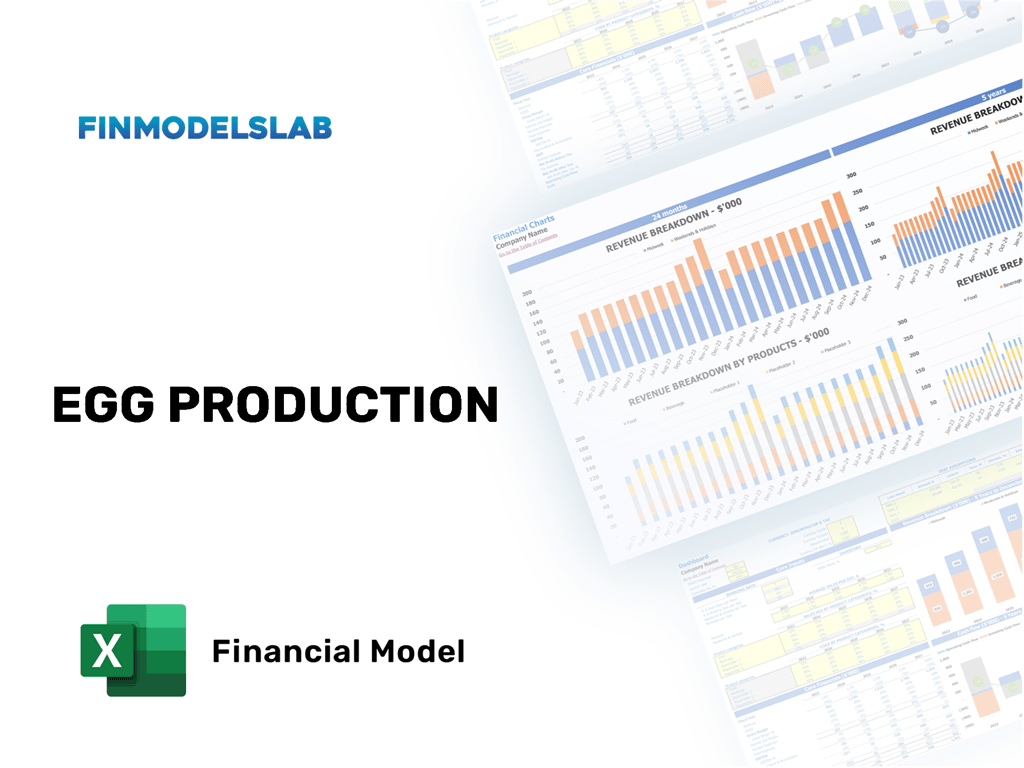
$169.00 $99.00 Get Template
Related Blogs
- Starting a Business
- KPI Metrics
- Running Expenses
- Startup Costs
- Pitch Deck Example
- Increasing Profitability
- Sales Strategy
- Rising Capital
- Valuing a Business
- How Much Makes
- Sell a Business
- Business Idea
- How To Avoid Mistakes
Leave a comment
Your email address will not be published. Required fields are marked *
Please note, comments must be approved before they are published
Agri Business
- Agri Insurance
Agriculture
Aquaculture
- Farm Machinery
- Feed Management
- Horticulture
Livestock Farming
- Modern Farming
Organic Farming
- Pests and Diseases
- Plant Nutrition
- Poultry Farming
Project Reports
- Schemes/Subsidies/Loans
- Success Stories
- Agriculture News
Poultry Egg Farming Business Plan: A Step-by-Step Guide
Poultry egg farming is a profitable and sustainable business that provides food for households and the wider community. The egg industry is growing, and with a well-written poultry egg farming business plan, you can secure funding and start a profitable enterprise. This article provides a step-by-step guide to creating a poultry egg farming business plan. Below we learn about poultry/chicken egg production business plans, poultry egg farm business plan costs, and a step-by-step guide for poultry egg farming business plan.

Poultry Egg Farming Business Plan
Conduct market research.
Before starting any business, it is essential to conduct market research to determine the business idea’s feasibility. Consider the demand for eggs in your local area, the competition, and the potential market for your eggs. Research the types of poultry breeds commonly used for egg production and identify the breeds that are well-suited to your local climate. Research the cost of feed, equipment, housing, and other operating costs to understand better the costs involved in running a poultry egg farm.
Define Your Business Goals
Once you have conducted your market research, it is time to define your business goals. This will help you determine what you want to achieve with your poultry egg farm. Some common goals for poultry egg farms include:
- Maximizing egg production to increase profits
- Providing a high-quality product for customers
- Expanding the business to reach a wider market
- Offering an affordable product to customers
Determine Your Target Market
To determine your target market, consider the age, income, and location of your customers. Your target market could be local families, wholesalers, or supermarkets. Consider the preferences of your target market, such as organic or cage-free eggs, and plan your business accordingly.
Develop a Marketing Plan
Make a strategy for marketing your eggs and reaching your target audience. Use social media, advertising, or market events to promote your business. Consider offering special deals or promotions to attract customers.
Prepare a Financial Plan
The financial plan is your poultry egg farming business’s most critical aspect. This plan should include estimated startup costs, operational costs, and projected income for your business. Consider the costs involved in buying equipment, purchasing land, building a coop, purchasing birds, and feeding and caring for the birds. Estimate the cost of utilities, insurance, and other operating expenses. Project the income from selling eggs and calculate your expected profit.
Choose Your Poultry Breeds
Choose poultry breeds that are well-suited to your local climate and meet your target market’s preferences. Consider the egg production rate, the cost of the birds, and their overall health and well-being.
In case you missed it: Types of Poultry Farming: Find Out Here!

Build a Shed
Build a shed that provides a secure and comfortable environment for your birds. The shed should be well-ventilated, provide access to sunlight, and be free from predators. Consider the cost of building a shed and the materials you will need.
Purchase Equipment
Purchase the equipment needed to run your poultry egg farm. This may include feeders, waterers, incubators, and brooding equipment. Consider each item’s cost and purchase durable and efficient equipment.
Purchase Birds
Purchase your birds from a reputable hatchery. Consider the birds’ cost, age, and overall health.
Start Your Poultry Egg Farming Business
Start your poultry egg farming business by caring for your birds and producing high-quality eggs. Consider expanding your business by offering different types of eggs or services like egg delivery.
Frequently Asked Questions About Poultry Egg Farming (FAQ)
Is the poultry egg business profitable.
Poultry egg farming can be a profitable business when done correctly. The global demand for eggs continues to increase, and with a well-planned business strategy, you can take advantage of this growing market. One of the key factors for profitability in the poultry egg farming business is to produce high-quality eggs at a competitive price. By investing in good quality equipment, feeding and caring for your birds, and following best practices in egg production, you can ensure that your eggs are of a high standard and are in demand.
Another factor contributing to the profitability of a poultry egg farming business is the ability to manage costs effectively. You can increase your profit margins by controlling feed, labor, and utility costs. Additionally, you can increase your sales and revenue by marketing your eggs to a wide range of customers, including local families, supermarkets, and wholesalers. With a focus on quality, cost management, and marketing, a poultry egg farming business can be a profitable and sustainable enterprise.
How Much Profit Does Egg Farming Make?
The profitability of egg farming depends on various factors, such as the size of the operation, the cost of production, the price of eggs, and the demand for eggs. A small egg-farming operation with a few hundred birds can profit from around $10,000 to $20,000 annually. On the other hand, a large-scale egg farming operation with tens of thousands of birds can generate profits in the millions of dollars.
The profit margin in the egg farming industry is relatively high, with an average profit margin of 20% to 30%. This is because the cost of production is low, and the demand for eggs is high. The cost of feed, housing, and other operating costs make up the majority of the production costs, while the sale of eggs generates the majority of the revenue. By controlling the production cost, improving the operation’s efficiency, and increasing the demand for eggs, egg farmers can increase their profits and grow their businesses.
In case you missed it: Poultry Farm Shed Design and Size: for 1000, 5000, 10,000 Birds

What are the Disadvantages of Layer Poultry Farming?
Layer poultry farming is profitable, but it has its challenges. Some disadvantages of layer poultry farming include high start-up costs, disease outbreaks, and high feed costs. Disease outbreaks can be costly, resulting in a loss of birds, decreased egg production, and increased veterinary costs.
High feed costs can also be challenging, as the birds require a nutritious diet to produce quality eggs. The cost of feed can be impacted by the cost of ingredients, such as corn and soybeans, which can fluctuate based on market conditions. Another disadvantage of layer poultry farming is the potential for egg production to decline, resulting in lower profits and a decrease in egg sales. Furthermore, competition is fierce, making it tough to set yourself out from the competition.
In conclusion, poultry egg farming is a profitable business offering a high investment return. It requires a well-thought-out business plan that outlines the goals, strategies, and cost of production.
- Feed Your Flock for Less: Top 10 Tips to Save on Chicken Feed
- Ultimate Guide to Ossabaw Island Hog: Breeding, Raising, Diet, and Care
- Hatching Answers: The Top 10 Reasons Your Chickens Aren’t Laying Eggs
- Eggs and Economics: Breaking Down the Cost of Raising Backyard Chickens
- Defend Your Greens: Proven Methods to Keep Iguanas Out of Your Garden
- Ultimate Guide to Cinnamon Queen Chicken: A Comprehensive Guide for Beginners
- Ultimate Guide to California Tan Chicken: Breeding, Raising, Diet, Egg-Production and Care
- Ultimate Guide to Marsh Daisy Chicken: Breeding, Raising, Diet, and Care
- 10 Types of Chicken Farming Businesses You Can Start for Profits
- Related Topics
Very nice article. I’m interested to start putting up my own egg farm business.
Leave a Reply Cancel reply
Save my name and email in this browser for the next time I comment.
A Guide to Permaculture Farming/Gardening: Understanding Its Principles, Benefits, and Implementation Techniques
How to treat brown spots on pepper plant leaves naturally: causes, fix..., planting calendar for zone 8b: schedule for fruits, vegetables, and flowers in..., 9 causes of dying pomegranate tree and how to fix it, 10 mistakes to avoid with chickens in winter: don’t let your flock..., how to start sheep farming in kenya: business plan, requirements, and management, 9 causes of dying ginger plants and how to fix them, how to grow a peanut plant in a pot: a guide to..., when to plant vegetables in new york: growing calendar for coastal and..., how to grow your salad mix at home: a step-by-step guide, homemade milk spray for pest and disease control: recipe for natural and..., how to use neem oil on ficus trees: a natural way to..., guide to using sevin dust on vegetable gardens: when and how to..., how to create a sustainable farming business plan: solid strategies for more..., how to manage pests and diseases in banana plantation: how to control..., unlocking the potential of black rice farming: best production package practices, ultimate guide to tree fodder crops: subabul, glyricidia, and sesbania, top 8 diy vegetable garden ideas: creative tips to grow vegetables, frequently asked questions about indoor gardening, when to plant vegetables in tennessee: growing calendar for eastern and western..., how to use neem oil on african violets: a natural way to get rid of bugs from african violets, hampshire down sheep facts: origin, physical characteristics, size, pros, and cons, sweet potato companion plants: what grows well with sweet potato and bad companions, how to control and eradicate aphids: home remedies, treatment, and management, according to experts 10 differences between greek and italian oregano, 15 best plant nurseries in hong kong: top garden centers to shop for plants.
- Privacy & Terms
© Copyright 2024, AgriculturalMagazine | All Rights Reserved.
Sample Egg Distribution (Wholesale Supply) Business Plan
- July 23, 2023
EGG DISTRIBUTION BUSINESS PLAN
Are you interested in the egg wholesale business ?
Well, there are multiple ways of participating in the poultry industry. Our focus is on egg distribution. Whenever this business is mentioned, people only think of the poultry farmer.
How Can I Start An Egg Wholesale Business?
However, there are several other participants in the poultry business value chain. These offer an equally valuable service. We will discuss the egg distribution business plan.
SEE: Wholesale Chicken Suppliers
Here is a sample business plan for starting an egg supply business.
Do you want to start an egg distribution business ? Many people do not understand that there is a huge business opportunity in connecting egg buyers and sellers.
Marketing eggs come with lots of investment benefits because eggs are consumed daily.
Many poultry farmers who produce eggs on their farms do not have the time to market in a bid to reach out to potential buyers because of the task of managing the farm.
This burden is taken off by egg distributors who come into poultry farms to buy crates of eggs at a reduced price and sell to market women (who retail to end consumers) at a profit.
Many industries, such as baking and confectionery, use eggs as an essential part of their raw materials. The production of poultry eggs is a significant source of income for farmers who are into layer bird production.
Producers of layers of feed and poultry cages, drinkers, and feeders also make money from this industry.
Egg Supplier Business is a highly profitable business idea, but most people have not realized the immense investment benefits it brings because eggs are consumed daily in most households.
You can also look for an egg distribution business for sale that you can buy at a reasonable price.
Most farmers can’t advertise the eggs they have produced to potential customers because of their busy schedule managing their farms. Still, egg merchants who serve as wholesalers take this weight by purchasing the eggs in large quantities from the farmers at a decreased cost, selling them to retail marketers, and making a good profit.
Egg production generates passive income for farmers and producers of related products such as poultry cages, feeders, drinkers, and layer feeders because eggs are essential raw materials in the Baking, Confectionery, and Cosmetics industries.
Eggs are the healthiest food in the world as they are one of the best sources of protein, rich in cholesterol which reduces many health risks and is helpful in the growth and development of young children.
Eggs are also rich in vitamin A for good eyesight and contain chlorine which is essential in the production of molecules in the brain.
The demand for eggs in the African market is currently very high and steadily increasing due to their wide variety of uses in products such as; confectioneries like bread, cakes, and meat-pie, cosmetics like shampoo, conditioners, soaps, cholesterol, face masks, and is also used in the textile industry for glue and a cleaning agent for leather surfaces.
The egg supply business provides good profits due to its advantages over other protein-rich foods like Fish, Turkey, Chicken, and Meat.
Some of these advantages of egg distribution are:
1. Affordability for customers. 2. Less stress in handling. 3. No need for a power supply. 4. No need for specialized tools. 5. Variety of uses, e.g., baking, cosmetics and consumption, and much more.
How do you run this profitable egg delivery business? It’s easy; all you need to do is follow nothing more than these five simple procedures. These are important in writing a plan.
1. Locate a farm that sells eggs 2. Acquire the eggs at a lower rate 3. Locate a retailer that is ready to purchase the eggs 4. Sell at a higher rate to the retailer 5. Enjoy your profits.
Gather Your Capital
Although some farms may give you a certain amount of crates on credit after you have been tested over time, you will need to have your capital with you when starting an egg distribution business.
It would help if you decided on how many crates of eggs you want to start supplying based on how much capital you have raised and how large the market is.
Also note that in most farms, you would get a better price when you buy more.
Source For Reliable Poultry Farms
Your source of getting table eggs that you supply must be reliable. It will help if you are looking for farms that could give you eggs at competitive prices.
The price of medium eggs ranges from #500-#550 per crate in significant towns such as Lagos, Ibadan, Kano, Calabar, Portharcourt, Enugu, and Abuja. Jumbo (Extra large or Double Yolk) goes for #630 – #680 Naira per crate.
Some farms will not allow you to come to the farm will your paper crates to avoid transmission of infection through bins used on other farms. Paper crates can be sold to you at N30-35, depending on the poultry farm.
When choosing farms to stay buying eggs from, it is essential to consider the selling price, quality of eggs in terms of size and color, distance to market, and means of transporting the eggs.
Look For Egg Buyers (Retailers)
One of the critical successes in the egg business is growing a list of reliable egg buyers.
You can get a market for your eggs through market women in the foodstuff markets like Bodija in Ibadan, bakeries, and caterers and their referrals.
How many eggs you can sell should influence how many eggs you buy from your source, i.e., poultry farms.
Means Of Transporting Eggs
Most egg distribution businesses move eggs from poultry farms to the market or their storehouses using vans. If you do not have a personal panel van or truck, you can hire one for a start.
Asides from careful driving, padding of the vehicle and the compact arrangement of egg crates will minimize the number of cracks.
Get A Warehouse/Outlet
The demand for table eggs fluctuates. Sometimes you end up buying more eggs than are eventually sold. There comes the need for an egg storage facility. An understanding of the guidelines of egg storage is essential in the construction of your warehouse.
Site your egg supply outlet strategically, as this will give your egg marketing business the needed exposure.
GUIDE ON EGG TRADING BUSINESS
Necessary Things To Ensure Your Success in The Egg Retailing Business
1. CAPITAL: It is your capital that draws the attention of the farmer regardless of your abilities, and it is your capital that sometimes determines the quantity and price of the crate of eggs.
Quantity is a significant factor in the egg depot business; the more you purchase, the better the prices. Supply from the farmers may even prove challenging, not because you lack the funds but because it’s simply due to the lack of eggs.
Farmers tend to give tests based on consistency and sales limit over a particular timeframe, and passing this test ensures that you will always have a reliable supply from that farm.
2. GET A LARGE AND DEPENDABLE FARM: Getting an extensive and dependable farm comes next after securing your capital. Notice that the word LARGE and DEPENDABLE farm is used.
This is because larger farms tend to lower prices, and you will need a dependable farm with a good foundation in this business.
It would help if you looked out for farms that offer eggs at reasonable costs when sourcing for farms.
A few farms will not permit you to bring your paper crates to avoid the risk of contamination and sell you their paper crates at the average rate of N35 to N45, depending on the farms.
Other factors to be aware of are the quality of eggs based on size and color, the selling price, distance to the market, and the method of transporting the eggs.
3. DETECT YOUR TARGETS: You must find shops in a range that has a decent population and human movement, as well as markets where you can have a genuine supply of eggs, As long as you have a proper client connection and a good area readily available, you will have an endless list of opportunities to choose from.
You could likewise supply to egg shops more distant than yours if you are mobile and have targets ranging from Bakers who come in to buy large quantities and retailers and sub-distributors.
4. GET DEPENDABLE RETAILERS: The next step is to get a reliable retailer since this is an essential factor that determines the success of the egg supply business.
To ensure smooth business operations, you have to get your clients first before getting a shop for yourself, and this is important because your retailers must be nearer to your shop and not the farm where you get the eggs.
5. GET A STORAGE FACILITY/OUTLET: When supply may exceed demand, you may end up purchasing a more significant number of eggs that can be sold at that period, which would ultimately require the need for an egg storage facility/warehouse.
To ensure the success of your egg supply business, an understanding of the principles of egg storage is needed in the construction of the warehouse and the location of the warehouse relative to the other shops and egg supply farms.
6. TRANSPORTATION: Transportation is another essential factor to be considered and depending on the size of the capital, it is advised to start on a small scale.
Hired commercial vehicles can transport eggs from farms without a personal business vehicle. It is also essential to drive carefully, as eggs are fragile.
To reduce the incidence of egg breakage, provide vehicles with cushioning. A suitable arrangement should also be made.
MEASURE THE PROFIT POTENTIAL FOR YOUR EGG SUPPLY BUSINESS
What is the price of a crate of eggs?
Wholesalers in Nigeria make about N100 per crate, so you may earn an average of N200,000 profit by selling 500 boxes a week, depending on your area, investment, and population.
As your business grows, your profits will continue to soar higher, and one of the techniques to maximize your profit is to set up smaller retail outlets where you make up to N230 from each crate of eggs, and this is an additional payment if you have somebody selling at that outlet for you.
Starting the egg supply business involves starting small and gradually developing your capital while gaining a foothold in the industry by marketing and building connections, which is even more challenging than getting the money or products.
The demand for eggs is enormous, and it may prove not easy at first as each merchant and retailer has a provider, but your success would be determined when you can replace their current provider.
Remember not to undermine the effectiveness of personal relationships and referrals. It is good to keep yourself productive and to always focus on how profitable this business is.
Starting an egg supply business can start small and grow your capital slowly. Buying and selling eggs might look strange, but concentrate on how profitable it is. Don’t underestimate the place of personal relationships and referrals in the business’s success.
Keep yourself busy and be productive.
Things Needed for an Egg Distribution Business
Egg distribution is open to poultry farmers and anyone interested in participating in this highly profitable business area.
To begin with, you have to be on the lookout for many things. While there are lots of opportunities, there are challenges too! These challenges are not insurmountable with the right plan in place.
Always Have an Implementable Plan
Your business plan is invaluable. This document sets forth a direct and clear line of action at every stage of the business. This should be carefully written and stripped of all complexities to allow for easy implementation.
Every part of the plan is essential. Contents should include a 3-year profit projection, marketing strategies, organizational structure, an executive summary, and a business description.
Like any business, certain things must be in place to succeed. The same applies to an egg distribution business. In planning your business, these should not be overlooked. They include;
Supply and Demand
As an egg distributor , there should be a healthy dose of supply and demand. In other words, you should have a good source of egg supply. Not every poultry business produces quality eggs.
Quality eggs are essential to how quickly they are disposed of or sold; specific poultry farms are reputed for producing quality eggs. These should be on top of your preference list for suppliers.
On the other hand, demand is as significant as supply in the egg distribution business. There has to be a ready market for your products (eggs).
It is, therefore, essential to know or learn everything you can about your buyers. You may choose to serve or supply to end-users (consumers), or you may prefer to work with retailers.
Understanding the dynamics between the two is necessary.
Having multiple distribution chains will positively impact your business. But why is this necessary? It is essential because these are channels through which your egg supply business grows.
The more demand for eggs, the bigger your profits and capacity. The same applies to supply.
Only Seek Out the Best Deal
This is important, especially when looking for possible suppliers (poultry farms). As an egg distribution business, you will closely work with poultry farm owners.
It is necessary to balance the best poultry product (eggs) and the price. Thousands of poultry farmers are likely to offer you a better bargain.
It would help if you exhausted your options in choosing the most preferred poultry product supplier. This will significantly enhance your profit margins.
Having Sufficient Start-up Capital
Funding is a lifeline for an egg supply business. Start-up funding depends on the scale of egg distributorship. You may choose to save up for this or may prefer to apply for a loan. Whatever your preferences or needs are, your business needs to be adequately funded.
Sufficient funding is needed to purchase your first product consignments).
Delivery Van(s)
A delivery van is essential for an egg distribution business to be successful. Getting one will cost you. However, instead of buying one, you can convert the one you have for business use.
The number of vans you need will depend on the size of your business. The larger the size of your egg distribution business, the more delivery vans will be required.
Egg Packaging and Storage
Egg packaging and storage facilities are some of the most important requirements that help deliver eggs safely. This reduces damages or cracks as well as spoilage of these products.
Let’s discuss each of these separately;
Egg Packaging
For the safe distribution of eggs, they need to be packaged appropriately. This enhances their delivery to end consumers.
Proper packaging of eggs will prevent them from tainting, natural predators, moisture loss, and natural predators. Packaging involves a lot of things. These include labeling as well as protective packaging.
The packaging is crucial for protecting eggs and will provide a form of identification.
Egg Storage
As an egg distributor, you must have product storage or holding facility. Eggs are fragile, and storage facilities are needed to keep them from spoiling. While storing eggs in cold storage, they shouldn’t be washed.
However, these must be clean. Cold storage for eggs requires close monitoring if ideal storage conditions are to be met.
The good thing about egg storage is that it does not have to last long. As long as there is a demand for eggs, minimal storage time is needed.
The egg distribution business plan involves a whole lot of procedures. Having these at the back of your mind is necessary before venturing into this area of business.
Depending on the size of your business, staffing is required. The right type of workers should be hired. These will include drivers, packaging staff, and more. It is necessary to strategize before venturing out.
Doing this will enhance the chance of success.
Leave a Reply Cancel reply
Your email address will not be published. Required fields are marked *
Ice Cream Franchises
370 transport company name ideas for your business, you may also like, sample bookkeeping service business plan, sample shawarma stand business plan, sample airport management business plan.

Layer Farming Business Plan [Sample Template]
By: Author Tony Martins Ajaero
Home » Business ideas » Agriculture Industry » Livestock Farming » Poultry » Poultry Business Plan
Are you about starting a layer farming business? If YES, here’s a complete sample layer farming business plan template & feasibility report you can use for FREE to raise money .
Okay, so we have considered all the requirements for starting a layer farming business. We also took it further by analyzing and drafting a sample layer farming marketing plan template backed up by actionable guerrilla marketing ideas for layer farms. So let’s proceed to the business planning section.
There are loads of business opportunities in the poultry industry and layer farming is one of them. Layers are chickens that are specifically raised for the purpose of laying eggs – commercial egg production.
Layer poultry farming means raising egg laying poultry birds for the purpose of commercial egg production. Layer chickens are a special species of hen which need to be raised from when they are one day old. They start laying eggs commercially from 18-19 weeks of age.
Layer poultry farming is a profitable business that has evolved from small scale into a global industry in most countries where it is carried out.
Countries like Nigeria , United Kingdom, Brazil, Greece, Philippines, China, Japan, Thailand, Caribbean countries and even South American Countries have been farming layer chicken on a large scale for a long time. united states isn’t far from the trade as there are lots of people who are making huge fortune from farming layer chicken alone.
It is important to state that starting a layer poultry farming business comes with its own fair share of challenges, but that does not rule out the fact that it is indeed a profitable business venture. An aspiring entrepreneur can either choose to start a layer poultry farm on a small scale or on a large scale depending on their financial status.
Below is a sample layer poultry farming business plan template that can help you to successfully write your own with little or no difficulty.
A Sample Layer Farming Business Plan Template
1. industry overview.
The agricultural industry of which poultry farming and egg production is a subset of is no doubt among the leading industry in most countries of the world; it is the industry that produces chicken and eggs for the populace.
Because of the significant role the agriculture sector plays, the government of most countries ensures that they go all the way to subsidize seedlings, fertilizers, farm implements and machinery for farmers and also encourage entrepreneurs to go into commercial farming (poultry farming inclusive).
Hens, various birds, quails, guinea fowls, ducks et al are all birds that can be comfortably reared in a poultry. Chicken and birds are widely consumed in all parts of the world hence there is a large market for poultry farmers. If you are looking towards starting a livestock breeding business, then one of your options is to settle for poultry farming. Poultry farming is a highly thriving and profitable business venture.
Asides from the fact that people consume birds and chicken, supply of eggs is also a major source of revenue generation for poultry farmers. Players in the poultry farming and egg production industry basically raise chicken for meat and egg production. The eggs produced may be sold for use as table eggs or hatching eggs.
The Poultry Farm and Egg Production Company Industry that layer poultry farming business is a part of is indeed a very large industry and pretty much thriving in all parts of the world especially in developed countries such as United States of America, Canada, United Kingdom, Germany, Australia and Italy et al.
Statistics has it that in the United States of America alone, there are about 30,000 licensed and registered poultry farm and egg production companies directly responsible for employing about 280,800 employees and indirectly responsible for employing roughly 1,339,900 people.
The industry rakes in a whooping sum of $10 billion annually with an annual growth rate projected at 6.1 percent. It is important to state that establishments with a lion share of the available market in this industry are Cal – Maine, Land O’Lake, Inc., Michael Foods and Rose Acres Farms.
Statistics also has it that an estimate of about 35 companies are involved in the business of raising, processing and marketing chickens on a commercial level; they export chicken and eggs to other countries of the world. It is on record that Americans consume more chicken than anyone else in the world.
So also, in 2015, almost 9 billion layer chickens, weighing 53 billion pounds, live – weight, were produced. More than 40 billion pounds of chicken product was marketed and measured on a ready-to-cook basis. If you are looking towards leveraging on the agriculture industry to generate huge income, then one of your best bet is to start a layer poultry farm and egg production business.
One thing is certain about starting layer poultry farming and egg production business, if you are able to conduct your market research and feasibility studies, you are more likely not going to struggle to sell your eggs and chickens because there are always food processing companies and consumers out there who are ready to buy from you.
2. Executive Summary
Grace Milton® Poultry Farms, LLC is a world – class poultry farm company with strong bias for rearing layer chickens. Our poultry farm will be based in the outskirt of Houston, Texas – United States. We have done a detailed market research and feasibility studies and we were able to secure hundred hectares of land to start our layer poultry farm and egg production business.
Our layer poultry farm is going to be a standard commercial poultry farm, so will be involved in raising layers for egg production on a commercial level; we will export live layers – chickens and eggs, to other countries of the world. We are in the commercial layer poultry farming and egg production line of business because we want to leverage on the vast opportunities available in the agriculture industry to contribute our quota in growing the U.S. economy.
Grace Milton® Poultry Farms, LLC is well positioned to become one of the leading commercial layer poultry farms in the United States of America, which is why we have been able to source for the best hands and machines to run the company.
We have put processes and strategies in place that will help us employ best practices when it comes to commercial poultry farms and egg production as required by the regulating bodies in the United States of America. At Grace Milton® Poultry Farms, LLC, our customer’s best interest will always come first, and everything we do will be guided by our values and professional ethics.
We will ensure that we hold ourselves accountable to the highest standards by meeting our client’s needs precisely and completely. We will cultivate a working environment that provides a human, sustainable approach to earning a living.
Grace Milton® Poultry Farms, LLC is a private registered commercial layer poultry farm and egg production company that is owned by Mrs. Grace Milton and her immediate family members. The layer poultry farm will be fully and singlehandedly financed by the owner – Mrs. Grace and her immediate family members at least for a period of time.
Before starting Grace Milton® Poultry Farms, LLC, Mrs. Grace Milton has gathered robust experience working for some of the top brands in the poultry farms industry in the United States of America. She is of course well experienced and highly qualified to run this type of business.
3. Our Products and Services
Grace Milton® Poultry Farms, LLC is a standard commercial layer poultry farm and egg production company that is committed to raising chicken (layers) for both the United States’ market and the global market. We are in the commercial layer poultry farms and egg production line of business to make profits and we are going to do all we can to achieve our business goals, aim and objectives.
These are the areas we will concentrate on in our commercial layer poultry farms. If need arises we will definitely add more poultry produce to our list;
- Raising, processing and marketing chickens on a commercial level; we export chickens, processed chickens and eggs to other countries of the world
- Table eggs produced by battery chickens (white)
- Table eggs produced by battery chickens (brown)
- Hatching eggs
- Specialty eggs
- Table eggs produced by free-range chickens
4. Our Mission and Vision Statement
- Our Vision is to become one of the leading commercial layer poultry farm and egg production brands not just in the United States of America but also on a global stage.
- Grace Milton® Poultry Farms, LLC is a world class and registered commercial layer poultry farm and egg production company that is committed to raising layers – chickens, and producing eggs for both the United States’ market and the global market. We want our chickens and eggs to flood the nooks and crannies of the United States and other countries of the world.
Our Business Structure
Grace Milton® Poultry Farms, LLC is a privately owned and managed commercial layer poultry farms and egg production business that intends starting small in Houston – Texas, but hope to grow big in order to compete favorably with leading commercial poultry farms and egg production companies in the industry both in the United States and on a global stage.
We are aware of the importance of building a solid business structure that can support the picture of the kind of world class business we want to own. This is why we are committed to only hire the best hands within our area of operation.
At Grace Milton® Poultry Farms, LLC, we will ensure that we hire people that are qualified, hardworking, creative, result driven, customer centric and are ready to work to help us build a prosperous business that will benefit all the stakeholders (the owners, workforce and customers).
As a matter of fact, a profit-sharing arrangement will be made available to all our senior management staff and it will be based on their performance for a period of five years or more as agreed by the board of trustees of the company. In view of the above, we have decided to hire qualified and competent hands to occupy the following positions;
- Chief Operating Officer
General Poultry Farm Manager
Human Resources and Admin Manager
Accountant/Cashier
- Sales and Marketing Executive
- Field Employees
- Front Desk Officer
5. Job Roles and Responsibilities
Chief Executive Officer – CEO:
- Increases management’s effectiveness by recruiting, selecting, orienting, training, coaching, counseling, and disciplining managers; communicating values, strategies, and objectives; assigning accountabilities; planning, monitoring, and appraising job results; developing incentives; developing a climate for offering information and opinions; providing educational opportunities
- Creating, communicating, and implementing the organization’s vision, mission, and overall direction – i.e. leading the development and implementation of the overall organization’s strategy
- Responsible for fixing prices and signing business deals
- Responsible for providing direction for the business
- Responsible for signing checks and documents on behalf of the company
- Evaluates the success of the organization
- Responsible for the planning, management and coordinating all farm activities across the various sections on behalf of the organization
- Supervise other section managers
- Ensure compliance during project executions
- Providing advice on the management of farming activities across all section
- Responsible for carrying out risk assessment
- Using IT systems and software to keep track of people and progress of the growth of chickens and other birds
- Responsible for overseeing the accounting, costing and sale of poultry farm produce
- Represent the organization’s interest at various stakeholders’ meetings
- Ensures that layer poultry farming goals desired result are achieved, the most efficient resources (manpower, equipment, tools and chemicals et al) are utilized and different interests involved are satisfied. Responsible for preparing financial reports, budgets, and financial statements for the organization
- Responsible for overseeing the smooth running of HR and administrative tasks for the organization
- Updates job knowledge by participating in educational opportunities; reading professional publications; maintaining personal networks; participating in professional organizations
- Enhances department and organization reputation by accepting ownership for accomplishing new and different requests; exploring opportunities to add value to job accomplishments.
- Defining job positions for recruitment and managing interviewing process
- Carrying out staff induction for new team members
- Responsible for training, evaluation and assessment of employees
- Oversee the smooth running of the daily office
- Responsible for preparing financial reports, budgets, and financial statements for the organization
- Provides managements with financial analyses, development budgets, and accounting reports; analyzes financial feasibility for the most complex proposed projects; conducts market research to forecast trends and business conditions
- Responsible for financial forecasting and risks analysis
- Performs cash management, general ledger accounting, and financial reporting for one or more properties
- Responsible for developing and managing financial systems and policies
- Responsible for administering payrolls
- Ensuring compliance with taxation legislation
- Handles all financial transactions for Grace Milton® Poultry Farms, LLC
- Serves as internal auditor for Grace Milton® Poultry Farms, LLC.
Sales and Marketing Manager
- Manage external research and coordinate all the internal sources of information to retain the organizations’ best customers and attract new ones
- Model demographic information and analyze the volumes of transactional data generated by customers
- Identifies development opportunities; follows up on development leads and contacts; participates in the structuring and financing of projects; assures the completion of development projects
- Write winning proposal documents, negotiate fees and rates in line with organizations’ policy
- Responsible for handling business research, market surveys and feasibility studies for clients
- Responsible for supervising implementation, advocate for the customer’s needs, and communicate with clients
- Develop, execute and evaluate new plans for increasing sales
- Create new markets cum businesses for the organization
- Empower and motivate the sales team to meet and surpass agreed targets
Field Workers/Contract Staff
- Responsible for daily collection of eggs
- Responsible for feeding chickens and other birds as instructed by the supervisor
- Responsible for cleaning poultry and the entire environment
- Change the water for the birds as instructed by the supervisor on a regular basis
- Handles poultry farm implements and machines (hatchery) as instructed by the section manager/supervisor
- Assist in handling the chicken and other birds et al
- Carries out task in line with the stated job description
- Assist in transport working tools and equipment from the poultry farm and back to the designated store room
- Handles any other duties as assigned by the line manager
Front Desk/Customer’s Service Officer
- Welcomes clients and potential clients by greeting them in person, online or on the telephone; answering or directing inquiries.
- Ensures that all contacts with clients (e-mail, walk-In center, SMS or phone) provides the client with a personalized customer service experience of the highest level
- Through interaction with clients on the phone, uses every opportunity to build client’s interest in the company’s products and services
- Manages administrative duties assigned by the creative director in an effective and timely manner
- Consistently stays abreast of any new information on the organizations’ products, promotional campaigns etc. to ensure accurate and helpful information is supplied to clients when they make enquiries
6. SWOT Analysis
Grace Milton® Poultry Farms, LLC do not intend to launch out with trial and error hence the need to conduct a proper SWOT analysis.
We know that if we get it right from the onset, we would have succeeded in creating the foundation that will help us build a standard commercial layer poultry farm and egg production company that will favorably compete with leading commercial layer poultry farms and egg production companies like Cal – Maine, Land O’Lake, Inc., Michael Foods and Rose Acres Farms in the United States of America and in other parts of the world.
We engaged the services of a core professional in the area of business consulting and structuring to assist our organization in building a well – structured commercial layer poultry farm and egg production company that can favorably compete in the highly competitive commercial poultry farms and egg production industry in the United States and the world at large.
Part of what the team of business consultant did was to work with the management of our organization in conducting a SWOT analysis for Grace Milton® Poultry Farms, LLC. Here is a summary of the result of the SWOT analysis that was conducted on behalf of Grace Milton® Poultry Farms, LLC;
Our strength as a commercial layer poultry farm and egg production company is the fact that we have healthy relationships with loads of major players (agriculture merchants) in the industry; both suppliers of poultry feeds and medications and buyers of live layers (chickens) and eggs within and outside of the United States of America.
We have some of the latest commercial poultry farming hatchery, tools and equipment that will help us raise and produce eggs in commercial quantities with less stress. Aside from our relationship (network) and equipment, we can confidently boast that we have some the most experienced hands in Houston – Texas on our payroll.
Our weakness could be that we are a new commercial poultry farm and egg production company in the United States, and perhaps it might take us sometime to attract big time customers in the industry. We are aware of this and from our projection will overcome this weakness with time and turn it to a major advantage for the business.
- Opportunities:
The opportunities that are available to us as a standard commercial layer poultry farm and egg production company cannot be quantified. We know that there are loads of households and businesses such as grocery stores, hotels and fast food restaurants that can’t do without a daily supply of live chicken and eggs. We are well positioned to take advantage of this opportunity.
Some of the threats and challenges that we are likely going to face when we start our commercial layer poultry farm and egg production company are global economic downturn that can impact negatively on household spending, bad weather cum natural disasters (draughts, epidemics), unfavorable government policies and the arrival of a competitor (a commercial farm that engage in the rearing of chickens and other birds) within same location.
There is hardly anything you can do as regards these threats and challenges other than to be optimistic that things will continue to work for your good.
7. MARKET ANALYSIS
- Market Trends
The Poultry and Chicken Egg Production industry has greatly benefited from campaigns advertising the health benefits of chickens and eggs as a good source of protein. No doubt, the increased demand of chicken and eggs from households and food related businesses and of course the growing popularity of specialty and processed eggs have rapidly improved revenue growth for the industry.
In the face of this growth, profit margin has suffered from rising feed costs and also regulations regarding animal welfare. As a matter of fact, one of the new trends is that with the recent advancement in technology, poultry farmers can now comfortably predict and produce large quantities of chickens/birds and eggs per time.
8. Our Target Market
Indeed, the target market of those who are the end consumer of commercial poultry farm produce and also those who benefits from the business value chain of the poultry farming and egg production industry is all encompassing; it is far–reaching.
Every household consumes produce from commercial poultry farms be it chicken or egg. So also, almost all hotels and fast restaurants sell meals made from chicken and eggs. In essence a commercial poultry farmer cum layer farmer should be able to sell his or her chickens and eggs to as many people as possible.
In view of that, we have positioned our business to attract consumers of chicken and eggs not just in the United States of America alone but in other parts of the world. We have conducted our market research and survey and we will ensure that we meet and surpass the expectations we set for the business. Below is a list of the people and business that we will market our live chickens and eggs to;
- Individuals
- Restaurants
- Fast food eateries
- Grocery stores
- Agriculture merchants
Our competitive advantage
It is easier to find entrepreneur flocking towards an industry that is known to generate consistent income which is why there are more commercial poultry farmers in the United States of America and of course in most parts of the world.
Statistics has it that there are 2.2 million farms in the United States of America, covering an area of 922 million acres. These goes to show that there are an appreciable number of farmers in the United States of America but that does not mean that there is stiff competition in the industry.
As a matter of fact, entrepreneurs are encouraged by the government to embrace commercial farming cum poultry farming and egg production. This is because part of the success of any nation is her ability to cultivate her own food and also export food to other nations of the world.
Grace Milton® Poultry Farms, LLC is fully aware that there are competitions when it comes to selling live layers and eggs all over the globe, which is why we decided to carry out thorough market research so as to know how to take advantage of the available market in the United States and in other parts of the world.
We have done our homework and we have been able to highlight some factors that will give us competitive advantage in the marketplace; some of the factors are effective and reliable layer poultry farming and egg production processes that can help us sell our produce at competitive prices, good network and excellent relationship management.
Another competitive advantage that we are bringing to the industry is the fact that we have healthy relationship with loads of major players (agriculture merchants) in the industry; both suppliers of poultry feed, medications, buyers of live chickens and eggs within and outside of the United States of America.
We have some of the latest commercial poultry farming hatchery, tools and equipment that will help us raise layers and produce eggs in commercial quantities with less stress. Aside from our relationship (network) and equipment, we can confidently boast that we have some the most experienced hands in Houston – Texas in our payroll.
Lastly, all our employees will be well taken care of and their welfare package will be among the best within our category (startups commercial poultry farms and egg production companies in the United States) in the industry. It will enable them to be more than willing to build the business with us and help deliver our set goals and achieve all our business aims and objectives.
9. SALES AND MARKETING STRATEGY
- Sources of Income
Grace Milton® Poultry Farms, LLC is in the poultry farms and egg production line of business for the purpose of maximizing profit hence we have decided to explore all the available opportunities within the industry to achieve our corporate goals and objectives. Below are the sources we intend exploring to generate income for Grace Milton® Poultry Farms, LLC;
10. Sales Forecast
From the survey conducted, we were able to discover that the sales generated by a commercial layer poultry farm and egg production business depends on the size of the poultry farm, the types of birds available in the poultry and of course the size of their marketing network.
We have perfected our sales and marketing strategies and we are quite optimistic that we will meet or even surpass our set sales target of generating enough income/profits from the first year of operation, and build the business from survival to sustainability within the shortest period of time.
We have been able to critically examine the layer poultry farms and egg production business, we have analyzed our chances in the industry and we have been able to come up with the following sales forecast.
- First Fiscal Year-: $250,000
- Second Fiscal Year-: $600,000
- Third Fiscal Year-: $900,000
N.B : This projection is done based on what is obtainable in the industry and with the assumption that there won’t be any major economic meltdown that can impact negatively on household spending, bad weather cum natural disasters (draughts, epidemics), and unfavorable government policies. Please note that the above projection might be lower and at the same time it might be higher.
- Marketing Strategy and Sales Strategy
We are quite aware that the reason why some commercial poultry farms and egg production companies hardly make good profits is their inability to sell off their live chickens and eggs as at when due.
Our sales and marketing team will be recruited based on their vast experience in the poultry farming and egg production industry and they will be trained on a regular basis so as to be well equipped to meet their targets and the overall business goal of Grace Milton® Poultry Farms, LLC.
Over and above, we have perfected our sale and marketing strategies first by networking with agriculture merchants and businesses that rely on a daily supply of live chicken and eggs. In summary, Grace Milton® Poultry Farms, LLC will adopt the following strategies in marketing our commercial farm produce;
- Introduce our business by sending introductory letters alongside our brochure to stakeholders in the agriculture industry, grocery stores, households, hotels and restaurants and agriculture produce merchants’ et al.
- Advertise our business in agriculture and food related magazines and websites
- List our commercial layer poultry farms and egg production business on yellow pages ads
- Attend related agriculture and food expos, seminars and business fairs et al
- Leverage on the internet to promote our business
- Engage in direct marketing
- Encourage the use of Word of mouth marketing (referrals)
11. Publicity and Advertising Strategy
Any business that wants to grow beyond the corner of the street or the city they are operating from must be ready and willing to utilize every available means (conventional and non – conventional) to advertise and promote the business. We intend growing our business which is why we have perfected plans to build our brand via every available means.
We know that it is important to create strategies that will help us boost our brand awareness and to create a corporate identity for our commercial layer poultry farm and chicken egg production business. Below are the platforms we will leverage on to boost our commercial layer poultry farm brand and to promote and advertise our business;
- Place adverts on community based newspapers, radio and TV stations
- Encourage the use of word of mouth publicity from our loyal customers
- Leverage on the internet and social media platforms like; YouTube, Instagram, Facebook, Twitter, LinkedIn, Snapchat, Badoo, Google+ and other platforms to promote our business.
- Ensure that our we position our banners and billboards in strategic positions all around Houston – Texas
- Distribute our fliers and handbills in target areas in and around our neighborhood
- Contact corporate organizations, households, landlord associations and grocery stores by calling them up and informing them of Grace Milton® Poultry Farms, LLC and the poultry produce we sell
- Advertise our business in our official website and employ strategies that will help us pull traffic to the site
- Brand all our official cars and trucks and ensure that all our staff members and management staff wears our branded shirt or cap at regular intervals.
12. Our Pricing Strategy
If you want to get the right pricing for your live layer chicken and egg, then you should ensure that you choose a good location for your commercial layer poultry farm and chicken egg production business, choose a good breed of layers that will guarantee bountiful harvest (eggs), cut the cost of running your poultry farm to the barest minimum.
Of course, you should try as much as possible to attract buyers to your poultry farm as against taking your eggs and chickens to the market to source for buyers; with this, you would have successfully eliminate the cost of transporting the goods to the market and other logistics.
We are quite aware that one of the easiest means of penetrating the market and acquiring loads of customers is to sell at competitive prices, hence we will do all we can to ensure that the prices of our eggs and layers – chickens are going to be what other commercial layer poultry farmers would look towards beating.
One thing is certain; the nature of commercial layer poultry farming and egg production business makes it possible for layer poultry farmers to place prices for their eggs and live chickens based on their discretion without following the benchmark in the industry. The truth is that it is one of the means of avoiding running into a loss.
- Payment Options
The payment policy adopted by Grace Milton® Poultry Farms, LLC is all inclusive because we are aware that different customers prefer different payment options as it suits them but at the same time, we will ensure that we abide by the financial rules and regulation of the United States of America. Here are the payment options that Grace Milton® Poultry Farms, LLC will make available to her clients;
- Payment via bank transfer
- Payment with cash
- Payment via credit cards/Point of Sale Machines (POS Machines)
- Payment via online bank transfer
- Payment via check
- Payment via mobile money transfer
- Payment via bank draft
In view of the above, we have chosen banking platforms that will enable our clients make payments for our live chicken and eggs purchase without any stress on their part. Our bank account numbers will be made available on our website to clients who may want to deposit cash or make online transfer for our chickens and eggs.
13. Startup Expenditure (Budget)
When it comes to calculating the cost of starting a commercial poultry farm , there are some key factors that should serve as a guide. The different types of birds to be raised in a commercial poultry farm determine the total cost of setting up the business.
Besides, in setting up any business, the amount or cost will depend on the approach and scale you want to undertake. If you intend to go big by renting / leasing a big facility, then you would need a good amount of capital as you would need to ensure that your employees are well taken care of, and that your facility is conducive enough for workers to be creative and productive.
This means that the start-up can either be low or high depending on your goals, vision and aspirations for your business.
The tools and equipment that will be used are nearly the same cost everywhere, and any difference in prices would be minimal and can be overlooked. As for the detailed cost analysis for starting a commercial layer poultry farm and egg production business, it might differ in other countries due to the value of their money.
Below are some of the basic areas we will spend our start-up capital in setting up our commercial layer poultry farm and egg production business;
- The total fee for incorporating the business (commercial layer poultry farm) in United States of America – $750.
- The amount needed to acquire/lease a farm land – $50,000
- The amount required for preparing the farm land (poultry fencing et al) – $30,000
- Legal expenses for obtaining licenses and permits as well as the accounting services (software, P.O.S machines and other software) – $3,300.
- Marketing promotion expenses for the grand opening of Grace Milton® Poultry Farms, LLC in the amount of $3,500 and as well as flyer printing (2,000 flyers at $0.04 per copy) for the total amount of $3,580
- The total cost for hiring business consultant – $2,500
- The total cost for payment of insurance policy covers (general liability, workers’ compensation and property casualty) at a total premium of – $9,400
- The amount required for the purchase of the first set of layer chickens – $10,000
- The cost for acquiring the required working tools and equipment/machines/hatchery et al – $50,000
- Operational cost for the first 3 months (salaries of employees, payments of bills et al) – $60,000
- The cost of launching an official Website – $600
- Additional Expenditure (Business cards, Signage, Adverts and Promotions et al) – $2,000
Going by the report from detailed research and feasibility studies conducted, we will need an average of $500,000 to start a standard commercial layer poultry farm and chicken egg production business in the United States of America.
Generating Funds/Startup Capital for Grace Milton® Poultry Farms, LLC
No matter how fantastic your business idea is, if you do not have the required money to finance the business, the business might not become a reality.
Finance is a very important factor when it comes to starting a business such as commercial layer poultry farm and egg production business. No doubt raising startup capital for a business might not come cheap, but it is a task that an entrepreneur must go through.
Grace Milton® Poultry Farms, LLC is a family business that is solely owned and financed by Grace Milton and her immediate family members. They do not intend to welcome any external business partners, which is why she has decided to restrict the sourcing of the startup capital to 3 major sources. These are the areas we intend generating our startup capital;
- Generate part of the startup capital from personal savings
- Source for soft loans from family members and friends
- Apply for loan from my Bank
N.B: We have been able to generate about $150,000 (Personal savings $100,000 and soft loan from family members $50,000) and we are at the final stages of obtaining a loan facility of $350,000 from our bank. All the papers and documents have been signed and submitted, the loan has been approved and any moment from now our account will be credited with the amount.
14. Sustainability and Expansion Strategy
The future of a business lies in the number of loyal customers that they have, the capacity and competence of their employees, their investment strategy and the business structure. If all of these factors are missing from a business (company), then it won’t be long before the business closes shop.
One of our major goals of starting Grace Milton® Poultry Farms, LLC is to build a business that will survive off its own cash flow without injecting finance from external sources once the business is officially running.
We know that one of the ways of gaining approval and winning customers is to retail our live layer – chickens and eggs a little bit cheaper than what is obtainable in the market and we are well prepared to survive on lower profit margin for a while.
Grace Milton® Poultry Farms, LLC will make sure that the right foundation, structures and processes are put in place to ensure that our staff welfare are well taken of. Our company’s corporate culture is designed to drive our business to greater heights and training and retraining of our workforce is at the top burner.
We know that if this is put in place, we will be able to successfully hire and retain the best hands we can get in the industry, and they will be more committed to helping us build the business of our dreams.
Check List/Milestone
- Business Name Availability Check: Completed
- Business Registration: Completed
- Opening of Corporate Bank Accounts: Completed
- Securing Point of Sales (POS) Machines: Completed
- Opening Mobile Money Accounts: Completed
- Opening Online Payment Platforms: Completed
- Application and Obtaining Tax Payer’s ID: In Progress
- Application for business license and permit: Completed
- Purchase of Insurance for the Business: Completed
- Leasing of farm land and building of standard poultry (cages): In Progress
- Conducting Feasibility Studies: Completed
- Generating capital from family members: Completed
- Application for Loan from the bank: In Progress
- Writing of Business Plan: Completed
- Drafting of Employee’s Handbook: Completed
- Drafting of Contract Documents and other relevant Legal Documents: In Progress
- Design of The Company’s Logo: Completed
- Graphic Designs and Printing of Packaging, Marketing/Promotional Materials: In Progress
- Recruitment of employees: In Progress
- Purchase of the needed hatcheries, creates, furniture, racks, shelves, computers, electronic appliances, office appliances and CCTV: In progress
- Creating Official Website for the Company: In Progress
- Creating Awareness for the business both online and around the community: In Progress
- Health and Safety and Fire Safety Arrangement (License): Secured
- Opening party/launching party planning: In Progress
- Compilation of our list of products that will be available in our store: Completed
- Establishing business relationship with vendors – key players in the industry: In Progress
Related Posts:
- Poultry Farming Business Plan [Sample Template]
- Free Range Chicken Farm Business Plan [Sample Template]
- Broiler Farming Business Plan [Sample Template]
- Poultry Farm Financial Projection – Profit & Loss Statement
- Abalone Farming Business Plan [Sample Template]
Blog | CheatSheet | Work With Us
How To Start An Egg Business Philippines
Have you always wanted to know how to start an egg business in the Philippines? Lots of people do not understand that there is a massive business opportunity in connecting egg buyers and egg sellers. If you’re thinking of something to invest your money in, an egg business is one of the best businesses in the Philippines and is a great opportunity to delve into.
As an egg supplier business, you may want to buy eggs in bulk so you can also sell the same in bulk to retailers or wholesalers directly. In this guide, you will learn more about how to succeed in this venture.
Table of Contents
How to Start an Egg Business in the Philippines
Research the market.
Do thorough market research about the demand for eggs in your local market and find out the requirements that are essential to start the business.
The demand of the egg business may vary according to the location. To do this, you may survey your local market and list down the leading buyers of eggs in the nearest city or town. Some examples would be a hotel, restaurant, carinderia , school, bakery, sari-sari stores, grocery stores , cafeteria, or a church.
Understand the Supply and Demand
According to the Philippine Statistics Authority , our country’s chicken production and egg situation should expand in 2022.
As an egg dealer, there should be a healthy exchange of supply and demand, and understanding the dynamics between these two is crucial. One thing to keep in mind is to have a good source of egg supply. But the fact is, not every poultry business produces such quality eggs.
The quality of eggs is essential to how quickly they are sold or disposed of. Thankfully, there are certain reputable poultry farms in the Philippines that produce quality eggs and these should be on top of your prioritized list for suppliers .
On the other hand, the demand is as important as the supply since there has to be a ready market for your eggs. You may choose to serve or work with retailers or you may prefer to supply to end-users (consumers).
Having multiple distribution chains will impact your business positively simply because these channels are through which your egg supply business grows. The more demand for eggs, the bigger are your profits and capacity. The same applies to supply.
Know your Competitors
It is crucial to find out about the different competitors in your barangay or city and know about their operational strategies and techniques. If there is massive market competition in your chosen area, then it is advised to look for any other appropriate location to start your business .
When finding a good area to sell, you may find a place in a range that has some decent population and human movement as well as markets where you can offer a genuine supply of eggs. As long as you find a few decent client connections backed up with a good location that has exposure to the crowd, you may have an endless list of opportunities to choose from.
Likewise, if you are mobile, you can supply eggs to shops more distant than yours and have potential markets targeting bakers who come in to buy huge quantities, as well as retailers and semi-wholesalers.
Find a large and dependable farm
Emphasis on the words LARGE and DEPENDABLE. This is because larger farms usually offer lower prices and having a track record of being dependable means they already have a good foundation in this business.
When sourcing for farms, look out for those that offer eggs at reasonable costs.
Other factors to consider would be the quality of eggs based on color and size, offered price, distance from the market, and also the method of transportation of the eggs.
Check out different poultry farms and make a comparison of their selling prices and the quality of products. You may want to keep the distance in consideration as a higher transportation cost can affect the profitability of the business.
Gather Your Capital
Although some farms may offer a certain amount of credit after you have been tested over time, nonetheless, you will still need to raise money and have your capital ready when starting an egg business in the Philippines.
Keep in mind that it is your capital that draws the farmer’s attention regardless of your abilities and it is your capital that helps determine the quantity and price of the trays of eggs.
Quantity is vital in an egg business and the more you purchase, the better the prices. You may decide on how many trays of eggs you want to start supplying based on how much funds you have accumulated and how large your potential market is.
Another thing worth noting is that farmers tend to give tests based on sales limit over a particular timeframe and your consistency. Ultimately, passing this test ensures that you will always have a reliable supply from that farm.
Look For Dependable Buyers/Retailers
One of the key successes on how to start an egg business in the Philippines is to create a list of reliable egg buyers, whether retailers or end-users (consumers). The number of eggs you can sell should influence how many eggs you buy from the farm.
To ensure the smooth operations of your egg business, you have to get to know who your potential clients are first before putting up a shop as your retailers must be closer to your shop and not the supplier from where you get your eggs.
Means Of Transporting Eggs
Most egg businesses in the Philippines move their eggs from farms to the market or their warehouses/storehouses with the use of vans or trucks. If you do not own one, hired commercial vehicles can be used.
Aside from driving carefully and padding the vehicle, a proper and compact arrangement of egg trays is needed to limit the egg breakage.
Get A Warehouse/Outlet
In some cases, the demand for eggs fluctuates and you may end up buying more eggs than what is eventually sold. This is where the need for an egg storage facility arises.
Site your egg business strategically as this will give your business the needed exposure. In addition, to ensure the smooth operations, understanding the principles of egg storage is a must in the construction of your outlet as well as the location that’s relative to the other shops and egg farms.
How much does it cost to start an egg business Philippines?
The Department of Agriculture has set a new suggested retail price (SRP) for basic commodities in Metro Manila. As of August 11, 2020, chicken eggs are set to be priced at Php 6.5 per piece .
In the Philippines:
- 1 case has 12 egg trays
- 1 tray has 30 pcs of eggs
- Buying 10 trays falls under the category of a semi-wholesaler
- Some farms offer free delivery for a minimum purchase of 10 trays
- Eggs are weighed through a standard egg machine to ensure the right sizing of the eggs
- Small trays range from Php131/tray to Php145/tray
- Medium trays range from Php160/tray to Php165/tray
- Large Trays range from Php180/tray to Php190/tray
Your capital will be based on the capacity of how much you want to sell. The more bulks of an order you purchase, the bigger the discounts you get thus, the cheaper is the price per egg.
Wholesale Egg Suppliers Philippines
Whether you wish to be a retailer and sell eggs in your sari-sari store , or simply a buyer for your every day consumption, here are some verified egg suppliers to choose from:
- Sunny & Scramble Chicken & Egg Station at San Mateo, Rizal
- Masagana Farm at 3012 Limay Street, Tondo, City of Manila
- Mybenta.com for a list of dependable farms selling online
Is an Egg Business Profitable in the Philippines?
Egg business is a highly profitable idea but most people have not realized the immense investment benefits it brings.
Here are several reasons why starting an egg business in the Philippines can provide good profits:
- Selling eggs come with lots of investment benefits simply because eggs are consumed daily.
- Most farmers producing eggs on their farms do not have the time to market and reach out to retailers and consumers because of the demands of managing the farm. This burden is taken off by egg wholesalers and resellers who come into the farms to buy trays of eggs at a reduced price and sell to the market at a profit.
- Several industries such as baking and confectionery , and cosmetics have a high usage of eggs since it is an important part of their raw materials.
- Eggs are well-known as one of the healthiest foods in the world. These are great sources of protein, rich in cholesterol, and can help reduce many health risks. These are also rich in vitamin A for good eyesight and chlorine for the production of molecules in the brain.
- Moreover, some advantages of egg distribution are the affordability for customers and the absence of any power supply or specialized tools for business continuity.
How To Promote Your Egg Business in the philippines
- Create an attractive logo and find killer ways to build your brand name and identity
- Offer home deliveries for free as this can be the best marketing strategy to attract more customers.
- Hire various skillful marketers and young talents to expand your egg business
- Find other ways to market your business without money needed
- Participate in food fairs and tiangges then introduce free samples.
- Be a wholesaler of hotels, restaurants, or bakeries and aim to get bulk orders.
- Provide free coupons to your suki or regular customers.
- During lean times, you may want to consider doing a sales push and some advertising online or try putting up a sign near your warehouse.
- When sales are high, you have an option to stop accepting new customers for the timebeing and consider raising your prices.
Looking for a business plan? Filipino Wealth has created free downloadable business plan templates which you can use when starting an egg business in the Philippines.
Now that you know the essential steps on how to start an egg business in the Philippines, it is imperative to make decisions instantly, lightly, or with reckless abandon. After all, you are shaping the entire identity of your business as well as your future.
Like for any business venture, you can see it as a fun game but of course, you have to become savvy, do lots of research, and provide the best quality product and service you possibly can. Eventually, customers will come running to you and your business will boom.

Terms and Conditions - Privacy Policy


COMMENTS
Download Eggs Farming Business Plan Sample in pdf. Illustrative business plan samples . OGSCapital's team has assisted thousands of entrepreneurs with top-rate business plan development, consultancy and analysis. They've helped thousands of SME owners secure more than $1.5 billion in funding, and they can do the same for you.
Read Also: [Pdf Sample] Broiler Farm Business Plan Proposal Docx Executive Summary. In this section, we will provide a concise overview of the poultry egg farming business plan, highlighting the key elements and objectives.It will give potential investors and stakeholders a comprehensive understanding of your business model, operational strategies, and financial projections.
Treehugger / Julia Cook. With your business plan in place, you can work backward from the number of eggs you plan to sell each week, to how many chicks you need to get to meet that goal. Figure ...
Poultry Egg Farming Business Plan Funding/Bank Loan Version- Editable Word File (Short version for applying for a loan/funding - 38 pages) Poultry Egg Farming Business Plan Automated Financial Statements - (Editable Excel File) The business plan can be used in any country and can be easily edited. The financial statements are automated.
Let's take a look together…. Step #1: Get 'The Most Complete' Poultry Farming Business Plan Template. Step #2: Download "The Poultry Farm Business Plan Analysis Playbook". Step #3: Download Poultry Plan It (eBook) Step #4: Download Poultry Project Reporter 2.0 - Insider's Guide. Step #5: Download Sample Poultry Plan Data.
11. Writing a Business Plan. Strategizing with an Egg Farm Business Plan. Crucial Blueprint. An egg farm business plan is a vital roadmap. It secures funding, attracts investors, and guides your journey from startup to operation. Strategic Direction. Crafting a comprehensive business plan is an investment in envisioning your egg farm's future.
What type of building will your chickens live in? How many chickens do you plan to have? Who is the veterinarian who will help keep your chickens healthy? Who are the customers for your eggs? How will customers hear about your egg business? How will you deliver the eggs to your customers? How much will you charge for your eggs?
The first, crucial step in developing your egg farm business plan is envisioning your business model. You need to consider many factors, such as the size of the operation, the choice between free-range or caged poultry, the location, and the logistics involved. Evaluate your long-term and short-term goals, anticipate challenges, and plan solutions.
Here is a business plan for the production of table eggs from poultry of 2,500 birds from point of lay for commercial production of table eggs by use of the battery cage system. Read: Sample Egg Distribution Business Plan. In our business, 2,500 laying birds are housed in a battery system for one and a half years. After which the number will be ...
Here are a few key advantages: Profit Potential: A well-managed chicken egg business can provide a reliable source of income. With proper planning and execution, the demand for eggs can lead to a profitable venture. Flexibility: Operating a chicken egg business allows for flexibility in terms of location and scale.
Traditionally, a marketing plan includes the four P's: Product, Price, Place, and Promotion. For a poultry farm business plan, your marketing plan should include the following: Product: In the product section, you should reiterate the type of poultry farm company that you documented in your Company Analysis.
Market Research And Analysis. Market research and analysis is a crucial step in developing a successful business plan for egg production. This process involves gathering and analyzing data to gain a deep understanding of the current market trends, demand, and potential opportunities for your egg production business.
Agri Insurance. Agriculture. Aquaculture. FAQs. Poultry Egg Farming Business Plan, a Step-By-Step Guide, Conduct Market Research, Define Your Business Goals, Develop a Marketing Plan and More.
3.5. CAGE-FREE CHICKEN EGGS . The Company will also produce and sell . cage-free chicken eggs. These eggs are . laid by hens that are free to roam in a . building, room or open area that includes nest space and perches. 3.6. ORGANIC FREE-RANGE CHICKEN . EGGS . Additionally, the Company will produce . and sell free-range: These eggs are the
This Startup Model template prepares the business plan for chicken egg layer farm from the bottom up based on the targeted flock size of layer hens, how much area is required, and how many eggs are being produced during the lifetime of a chicken, to forecast the annual egg production. Over the 10-year forecast period, the chicken egg farming ...
A Sample Poultry Farming Business Plan Template. 1. Industry Overview. The agricultural industry of which poultry farming and egg production is a subset of is no doubt among the leading industry in most countries of the world; it is the industry that produces chicken and eggs for the populace. Because of the significant role the agriculture ...
Download Template. Create a Business Plan. We'll walk you through a sample chicken farming business plan so you can start writing yours right now with Upmetrics. A business plan outlines your five-year growth strategy and a current picture of your poultry farm. It outlines your company's objectives and your plan for achieving them.
Financial Summary. Hencube poultry is a farm focused on both egg and meat production that provides for a large market range. It also produces manure as a by-product. It is based in yola city, wuro Haussa. The founders have noticed the health implication of red meat and are creating a business to meet the increased.
The document provides a business plan for a poultry/egg production business. The business will involve raising chickens for their eggs. It will start with 1,000 laying hens using a deep litter housing system. The goal is to produce and sell 28 crates of eggs per day. Initial marketing will focus on individual sales and restaurants. Strict hygiene practices will help ensure healthy eggs and ...
Every part of the plan is essential. Contents should include a 3-year profit projection, marketing strategies, organizational structure, an executive summary, and a business description. Like any business, certain things must be in place to succeed. The same applies to an egg distribution business.
A Sample Quail Egg Production Business Plan Template. 1. Industry Overview. Quail is a general name that is given to a generation of mid-sized birds generally placed in the order Galliformes. There are loads of poultry's that raise quail for meat and eggs and they are making huge profits from the business.
A Sample Layer Farming Business Plan Template 1. Industry Overview. The agricultural industry of which poultry farming and egg production is a subset of is no doubt among the leading industry in most countries of the world; it is the industry that produces chicken and eggs for the populace.
How To Promote Your Egg Business in the philippines. Offer home deliveries for free as this can be the best marketing strategy to attract more customers. Participate in food fairs and tiangges then introduce free samples. Be a wholesaler of hotels, restaurants, or bakeries and aim to get bulk orders.